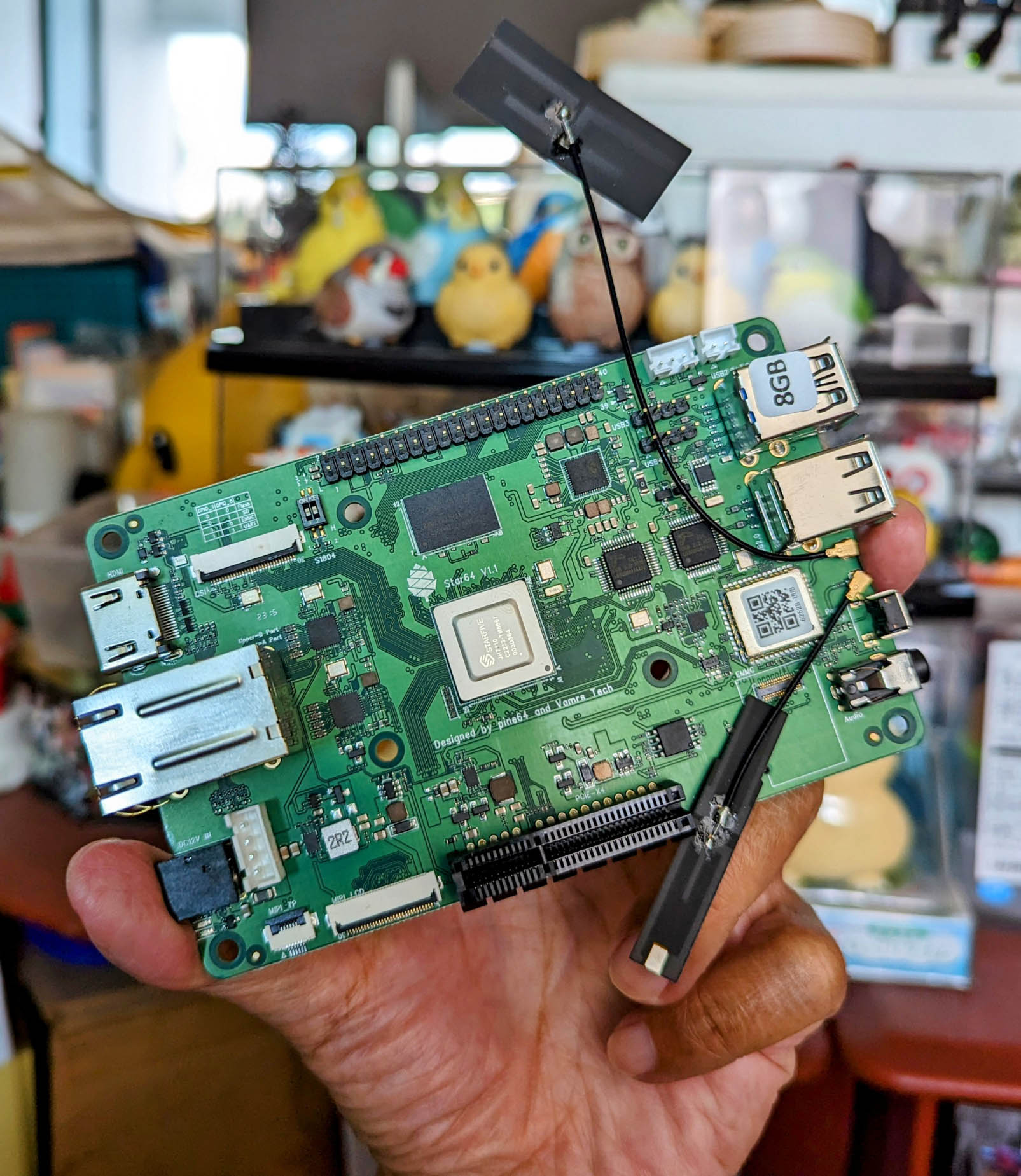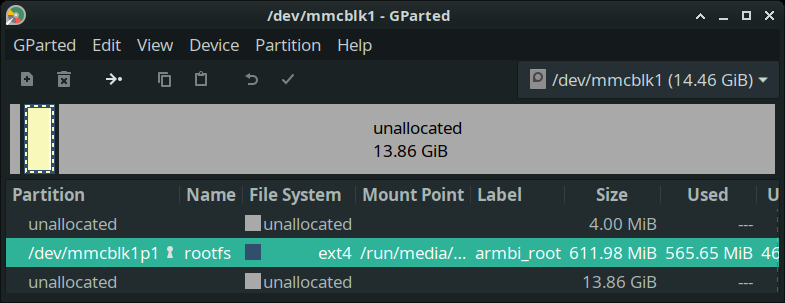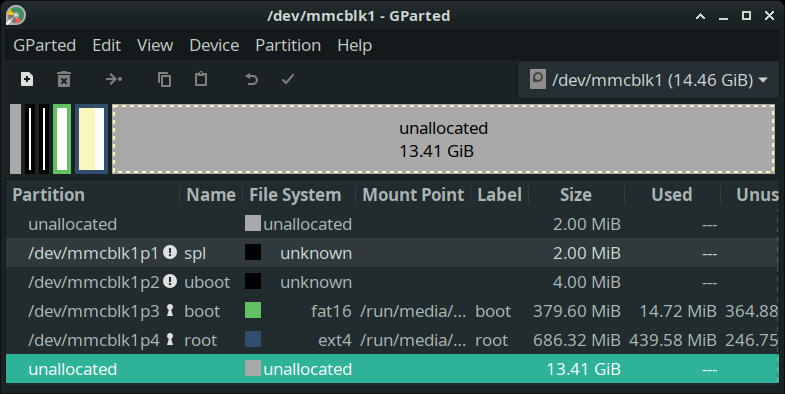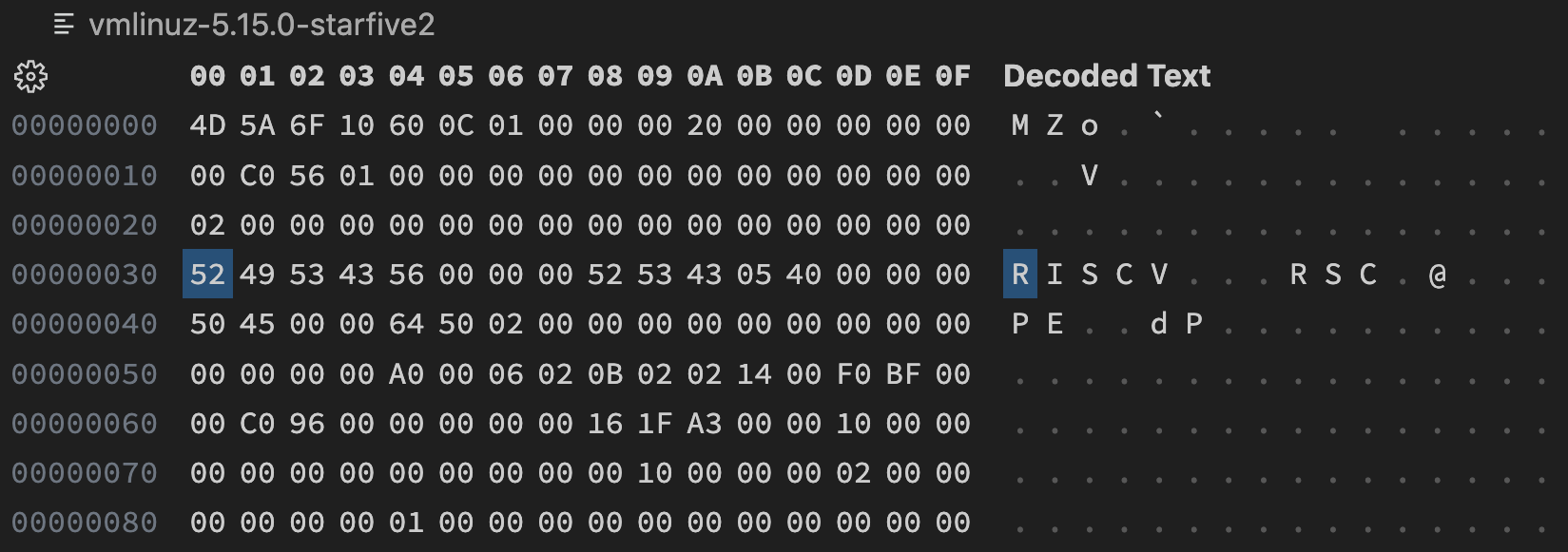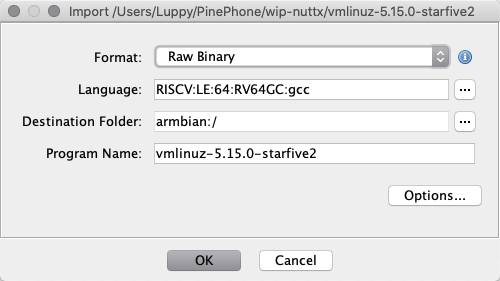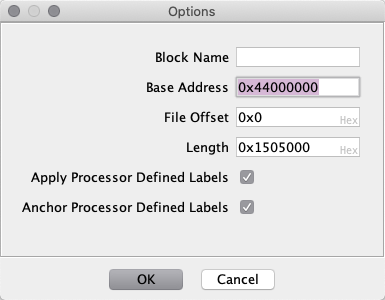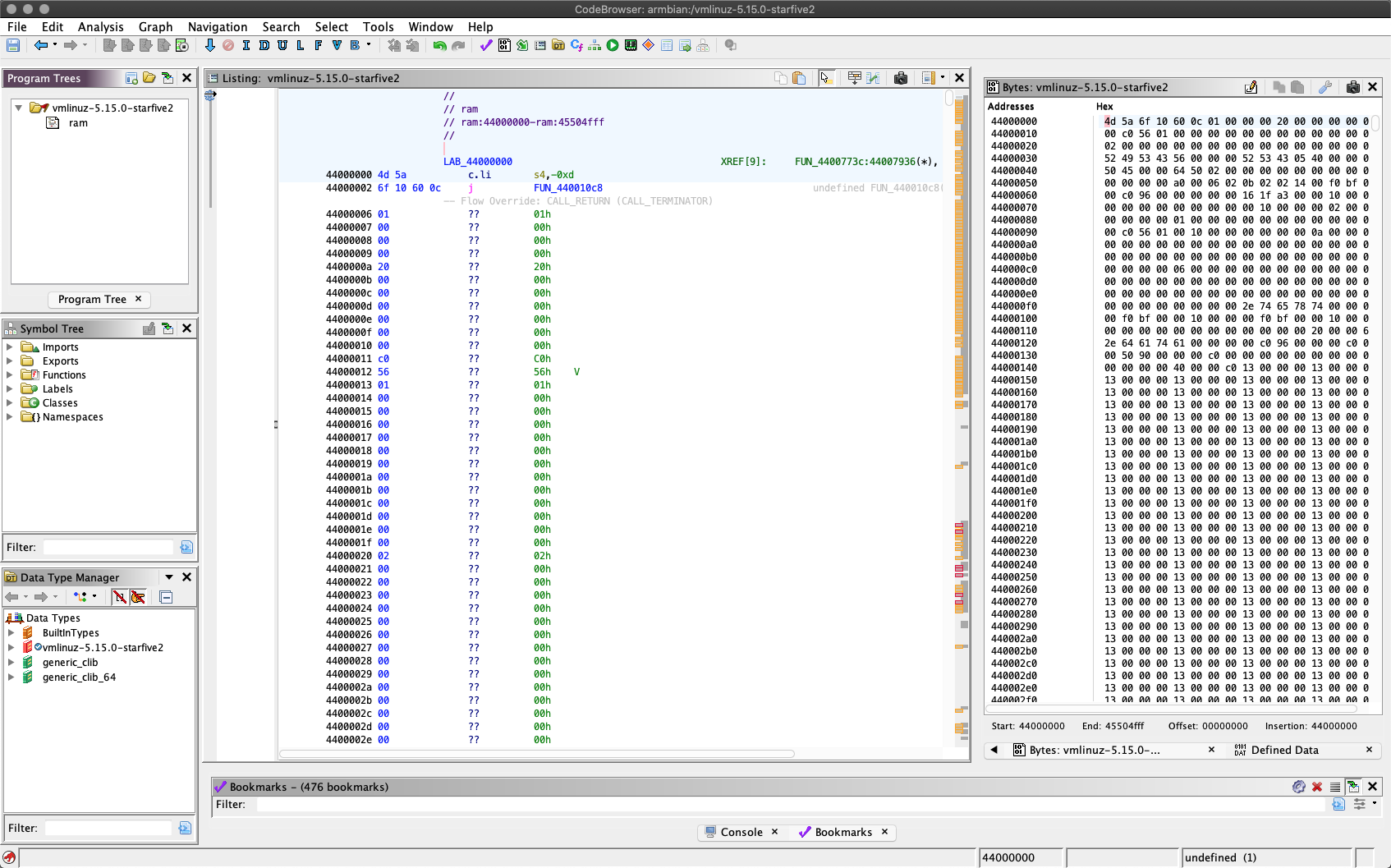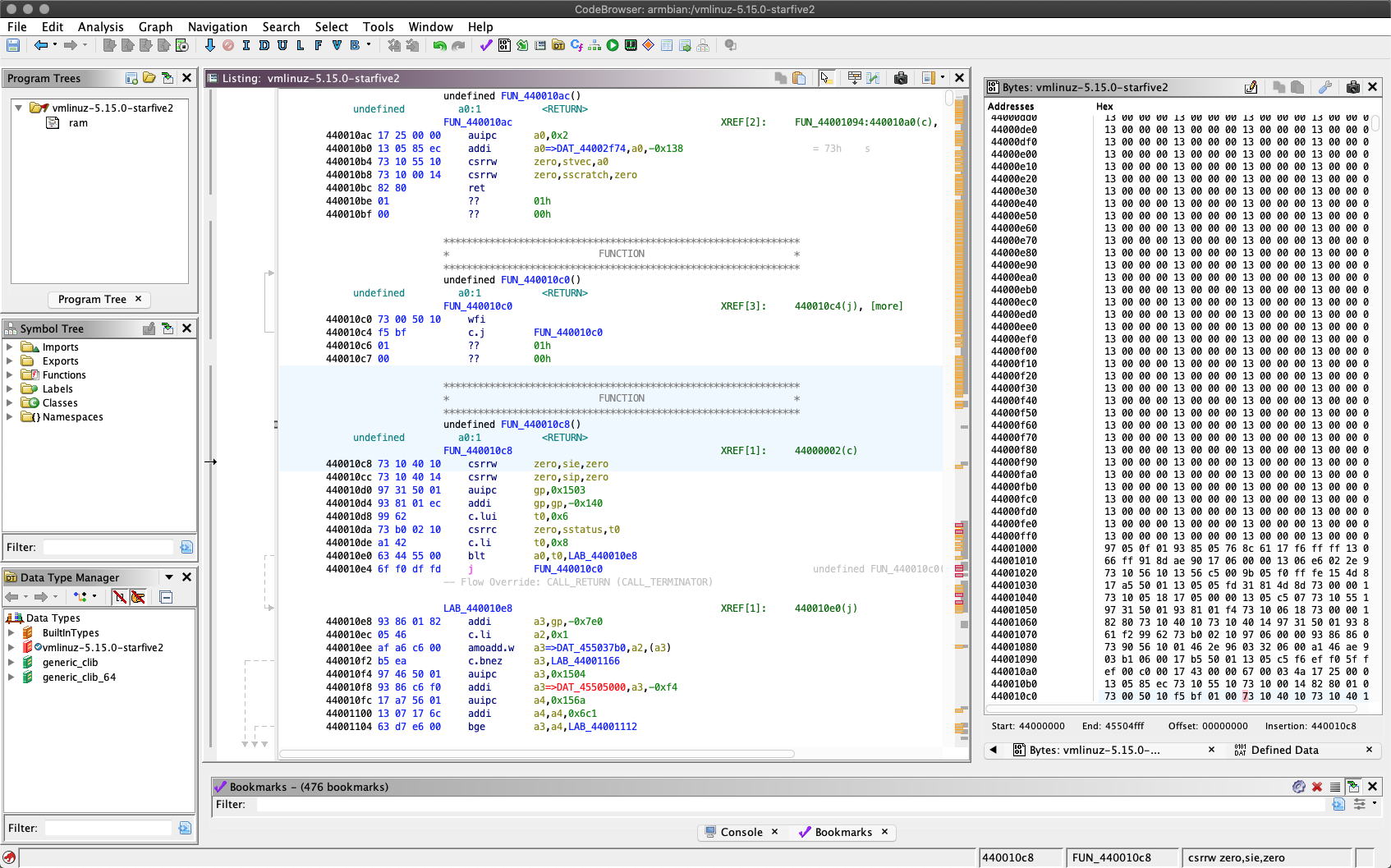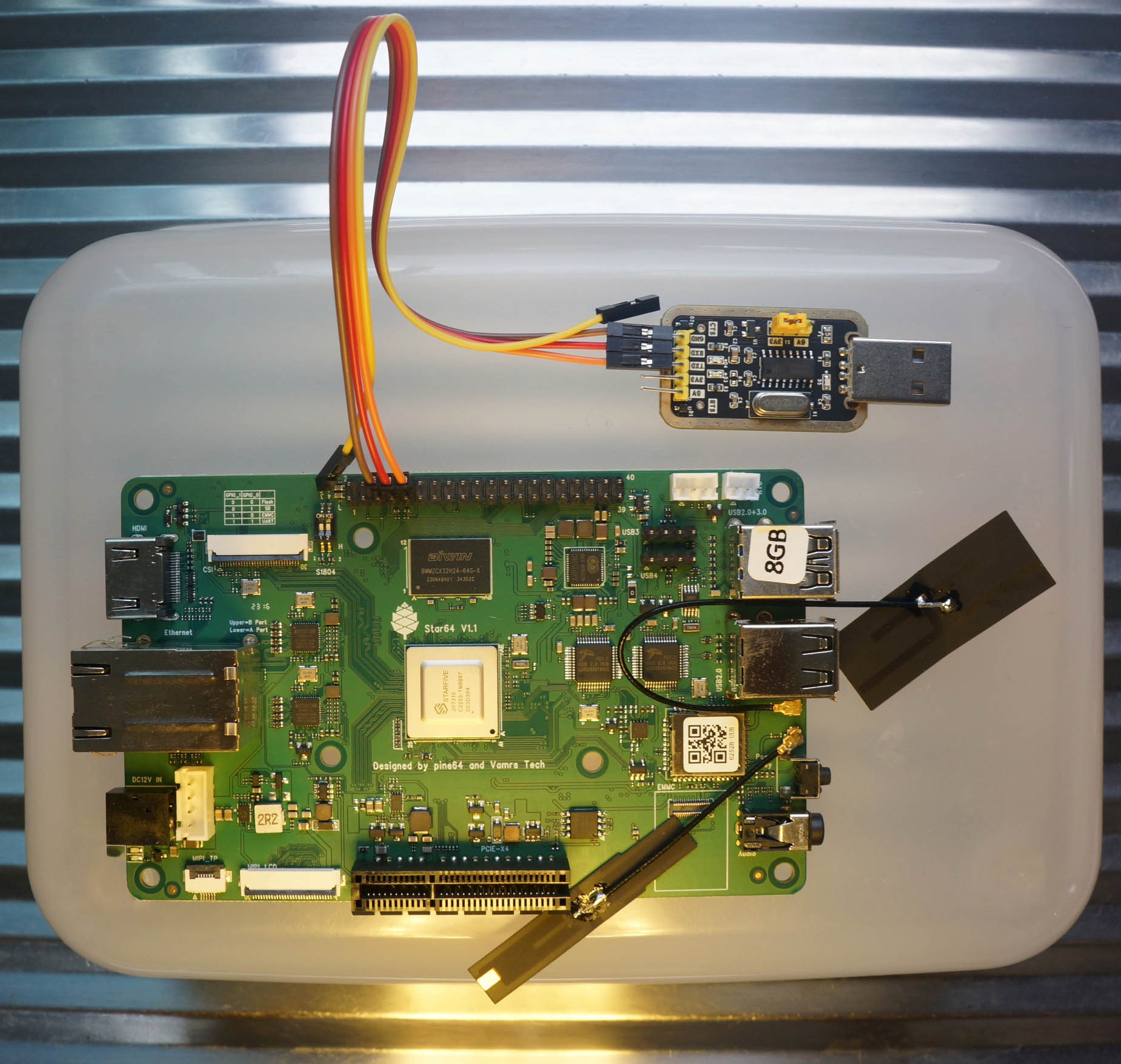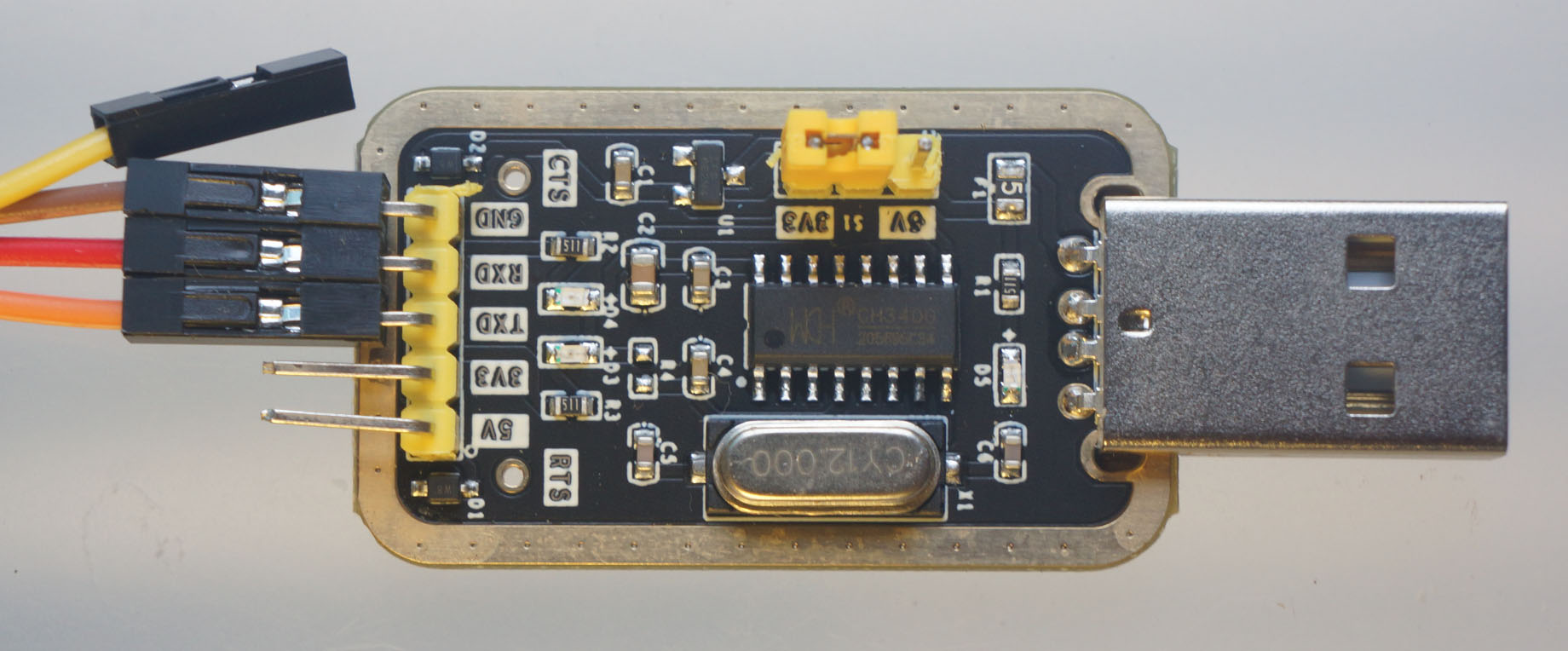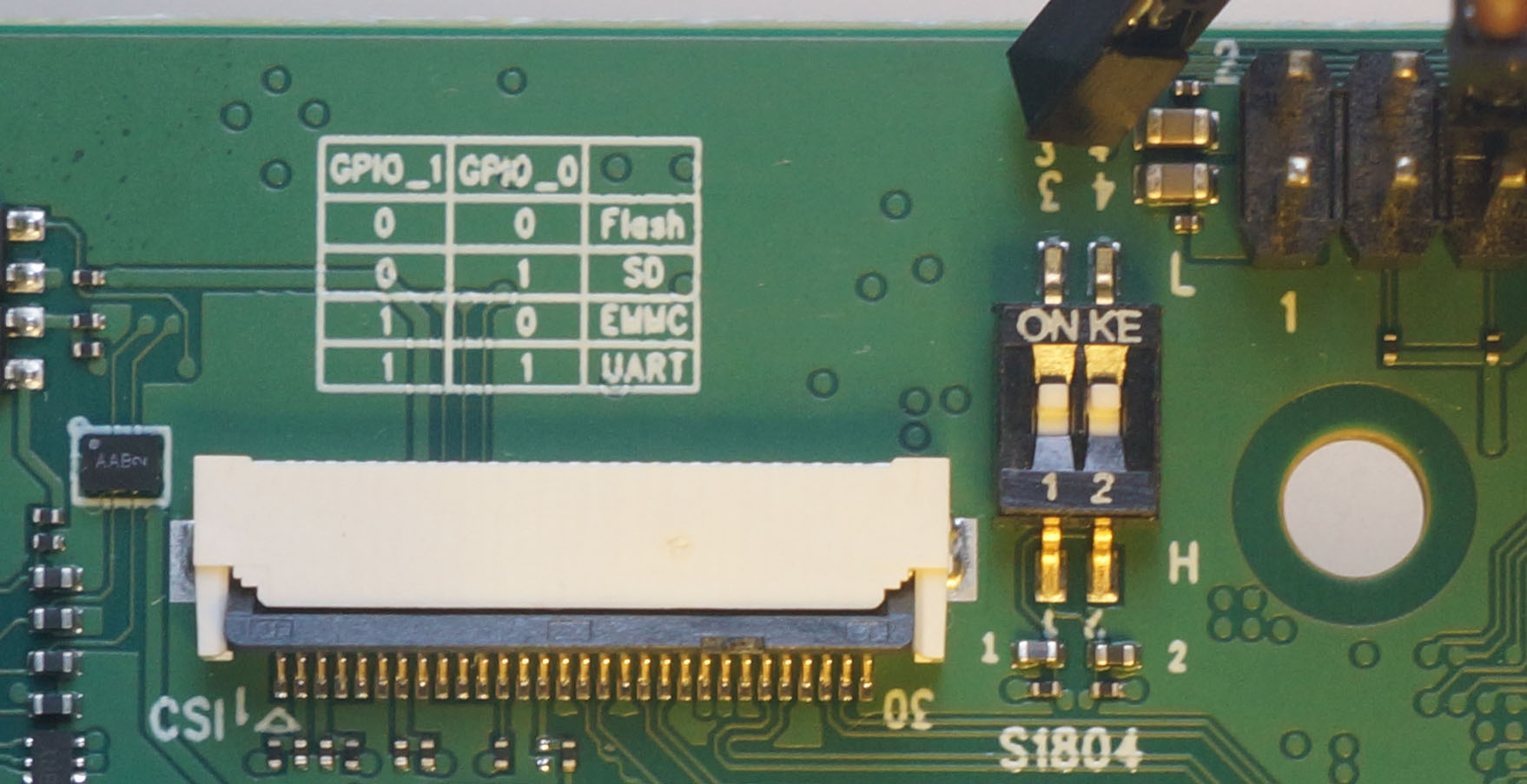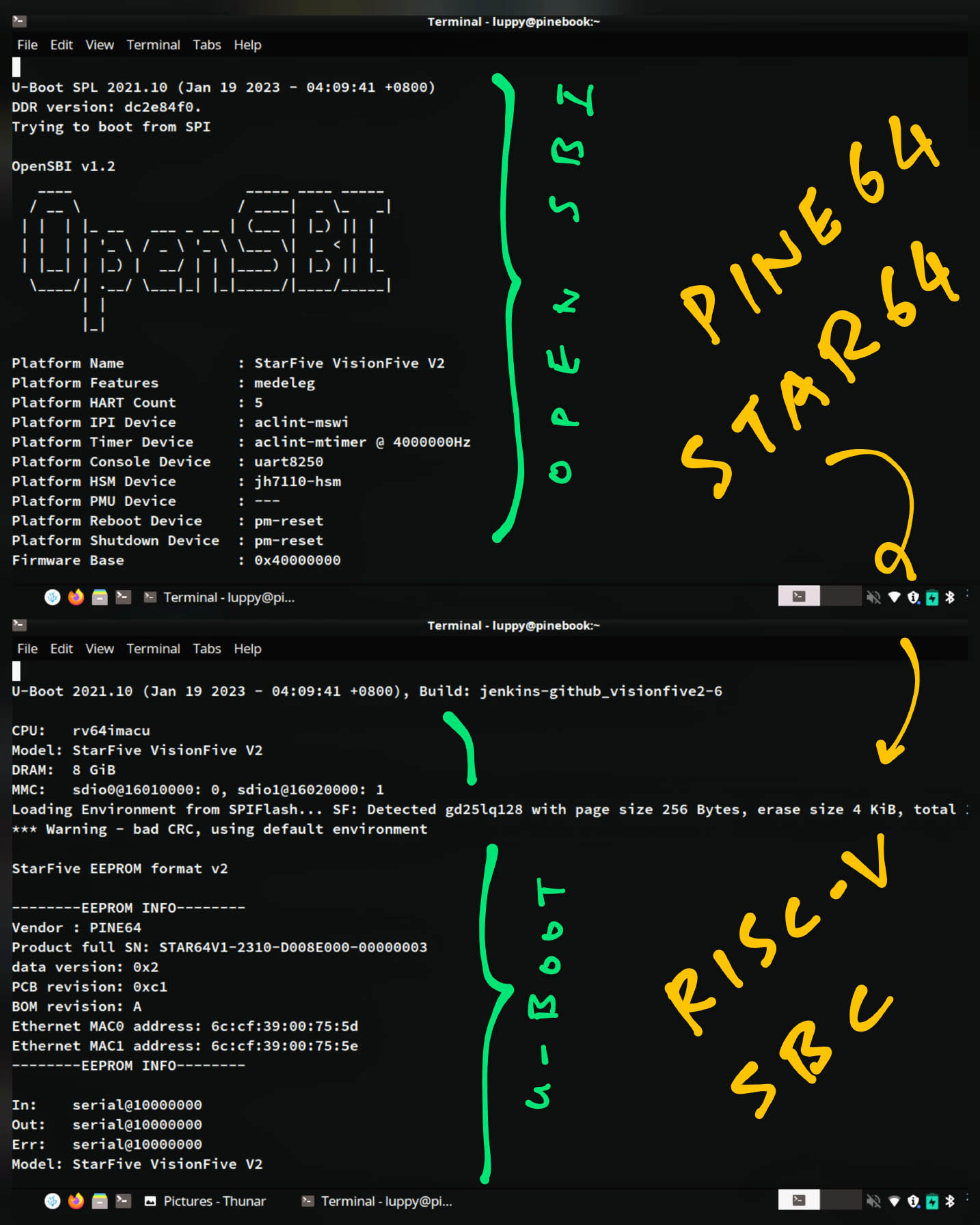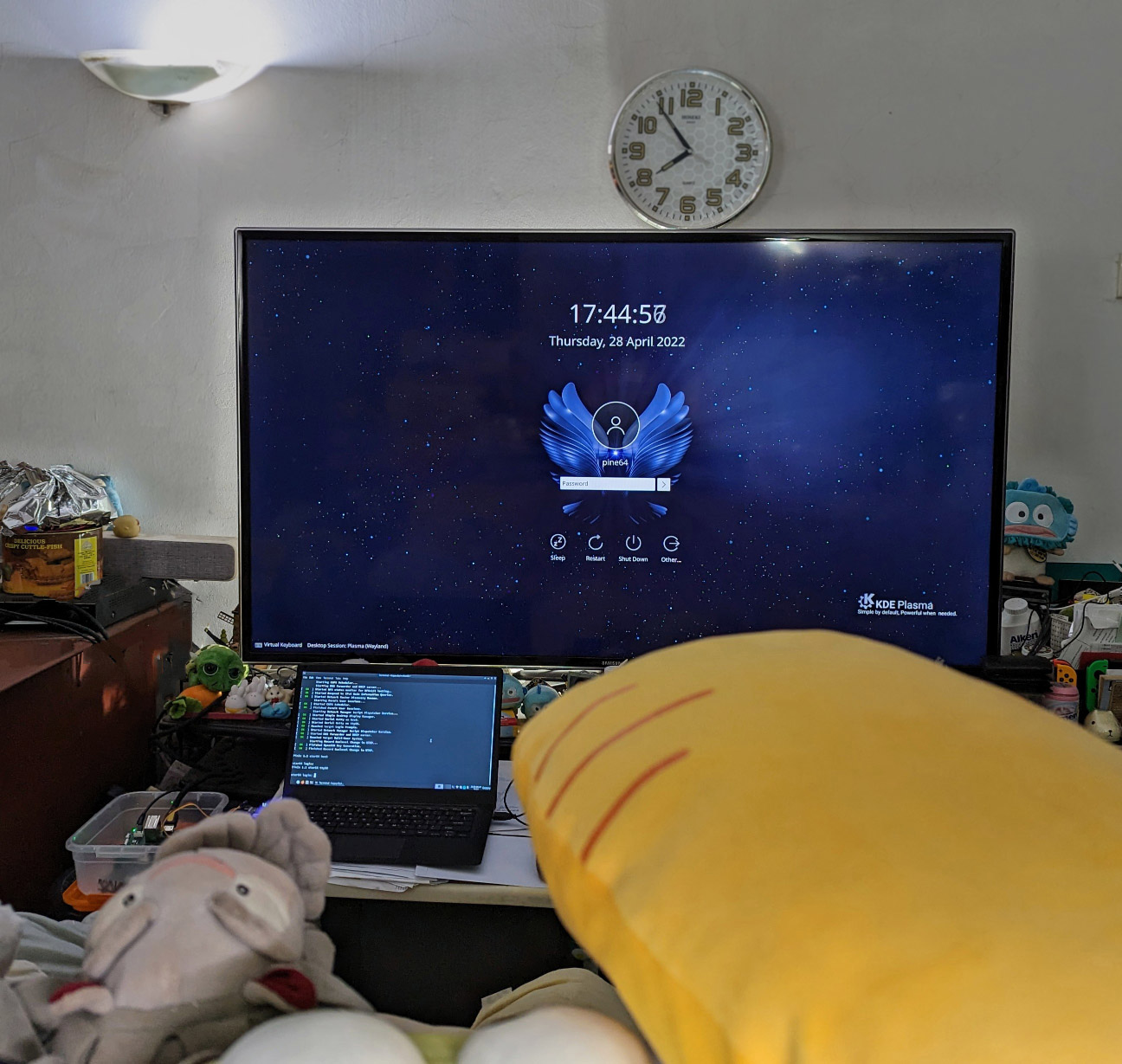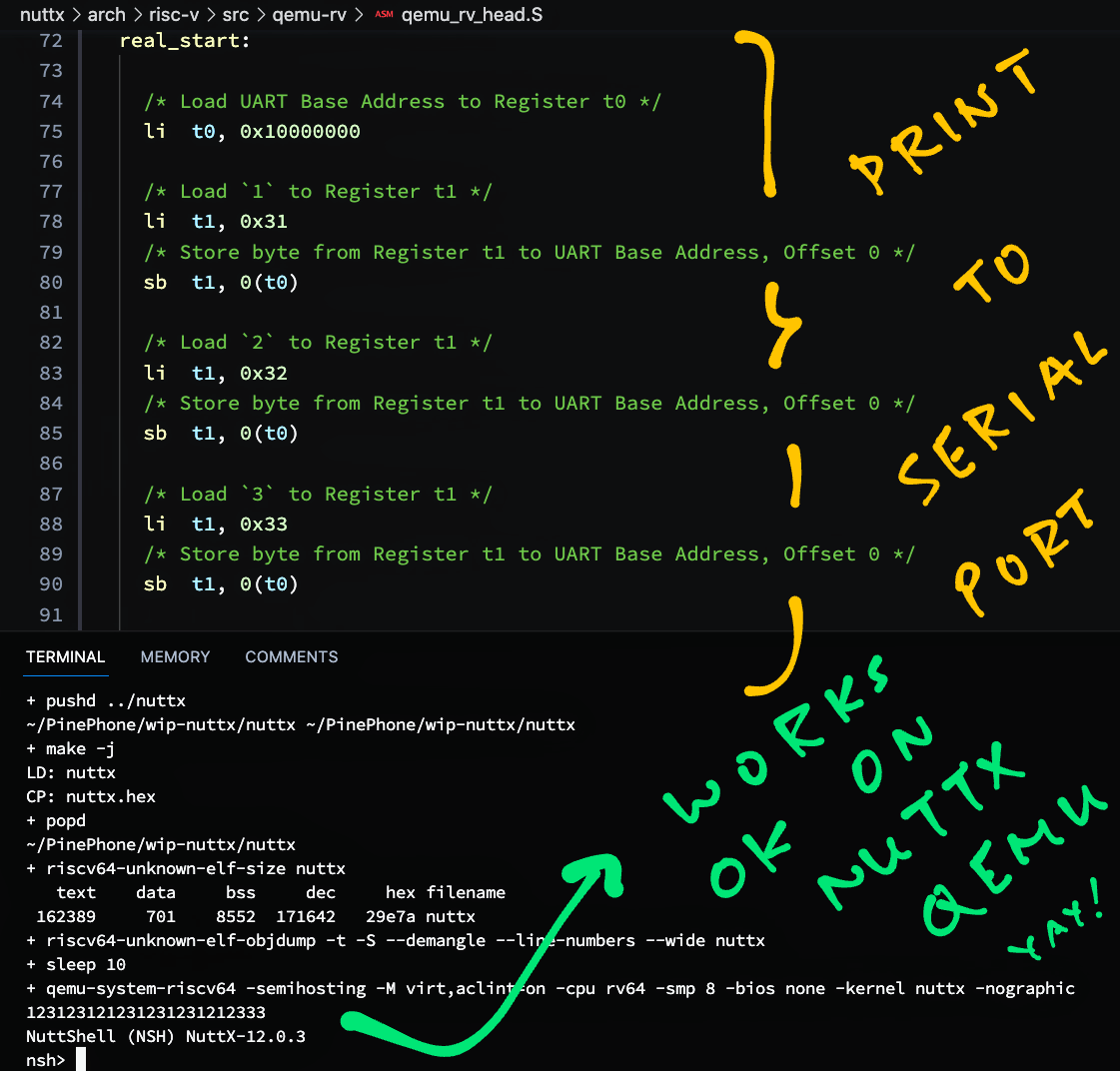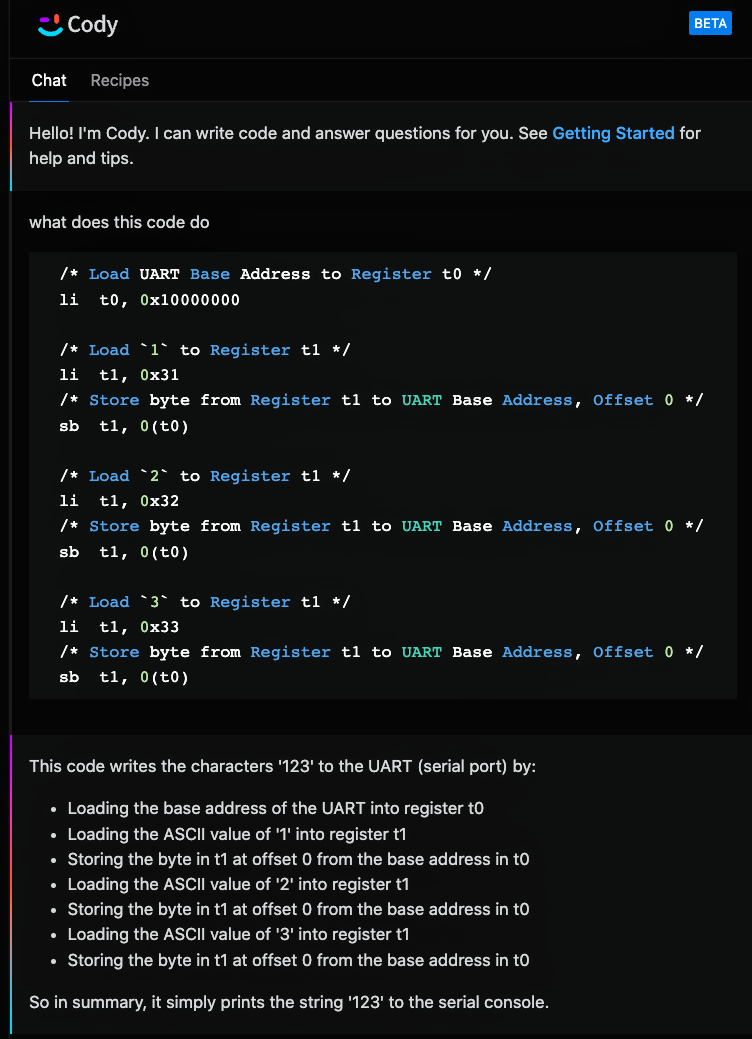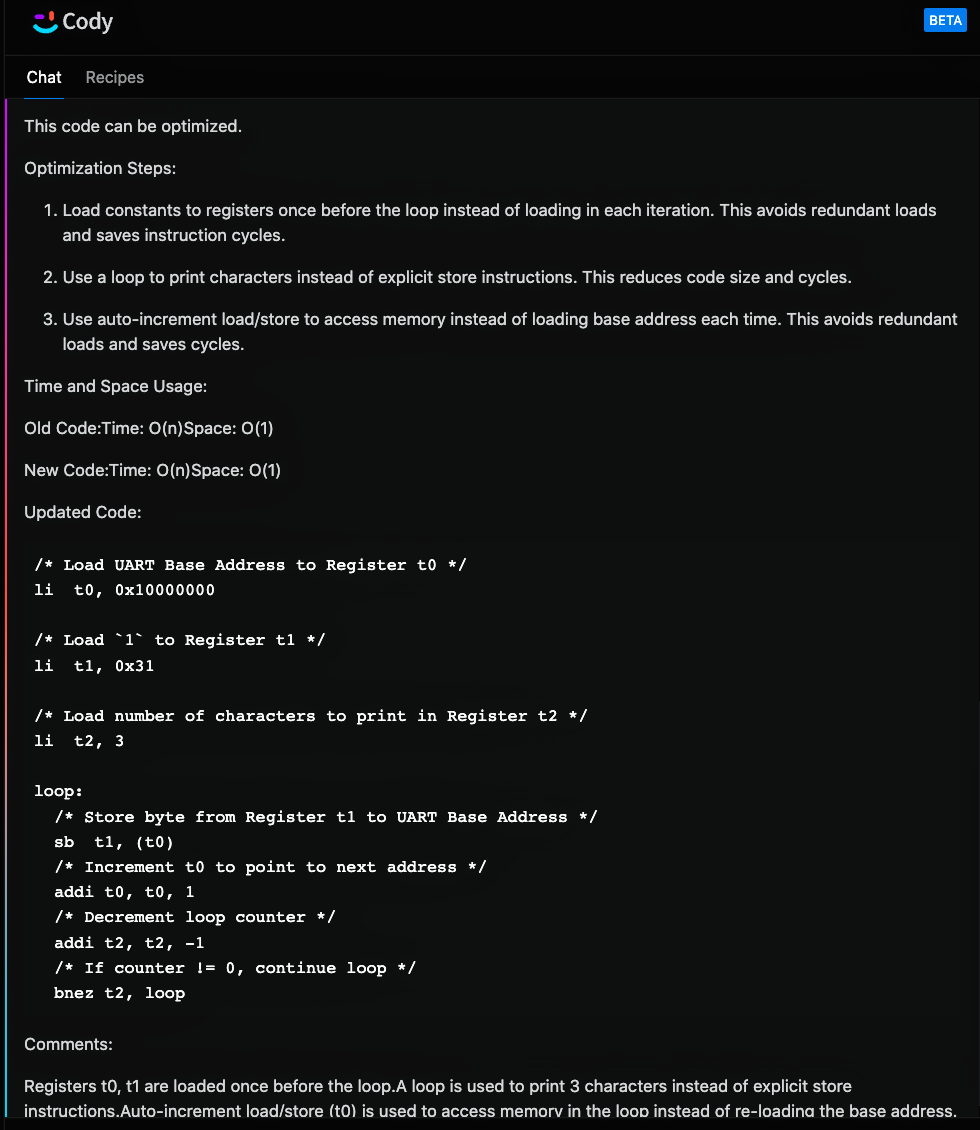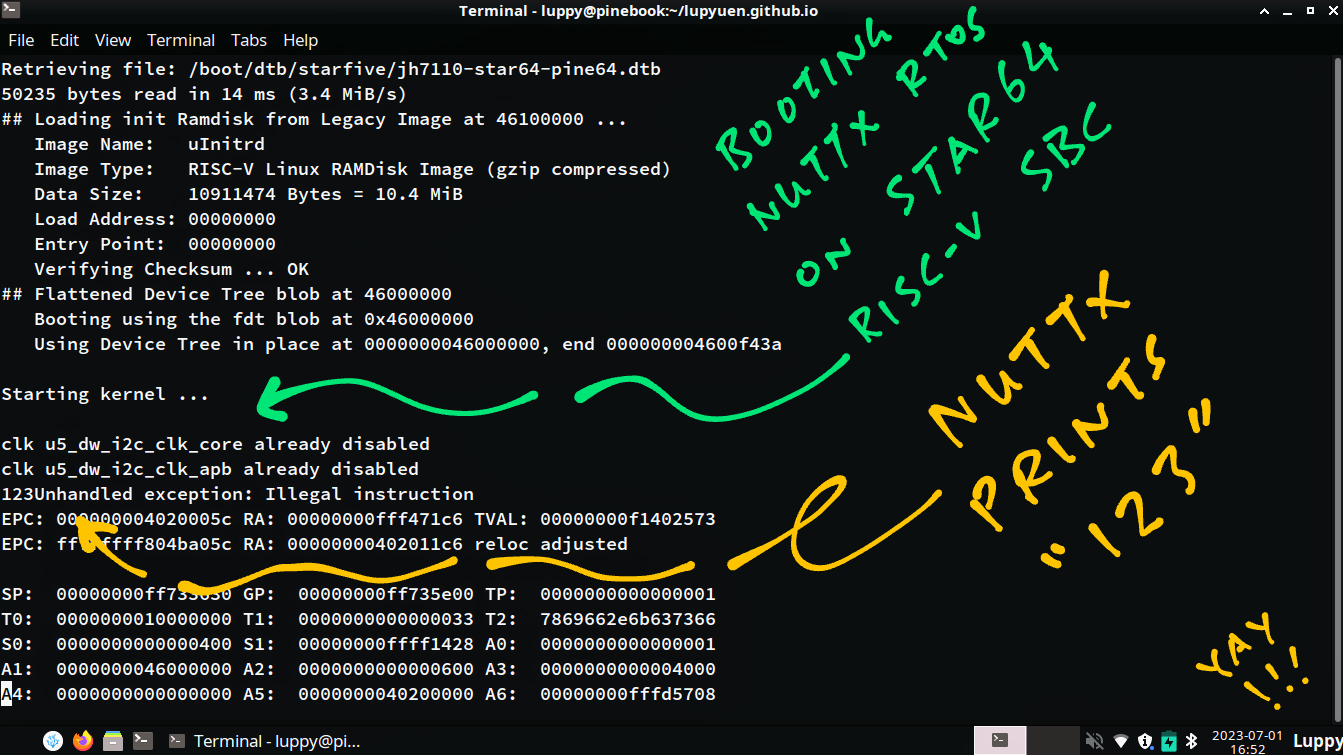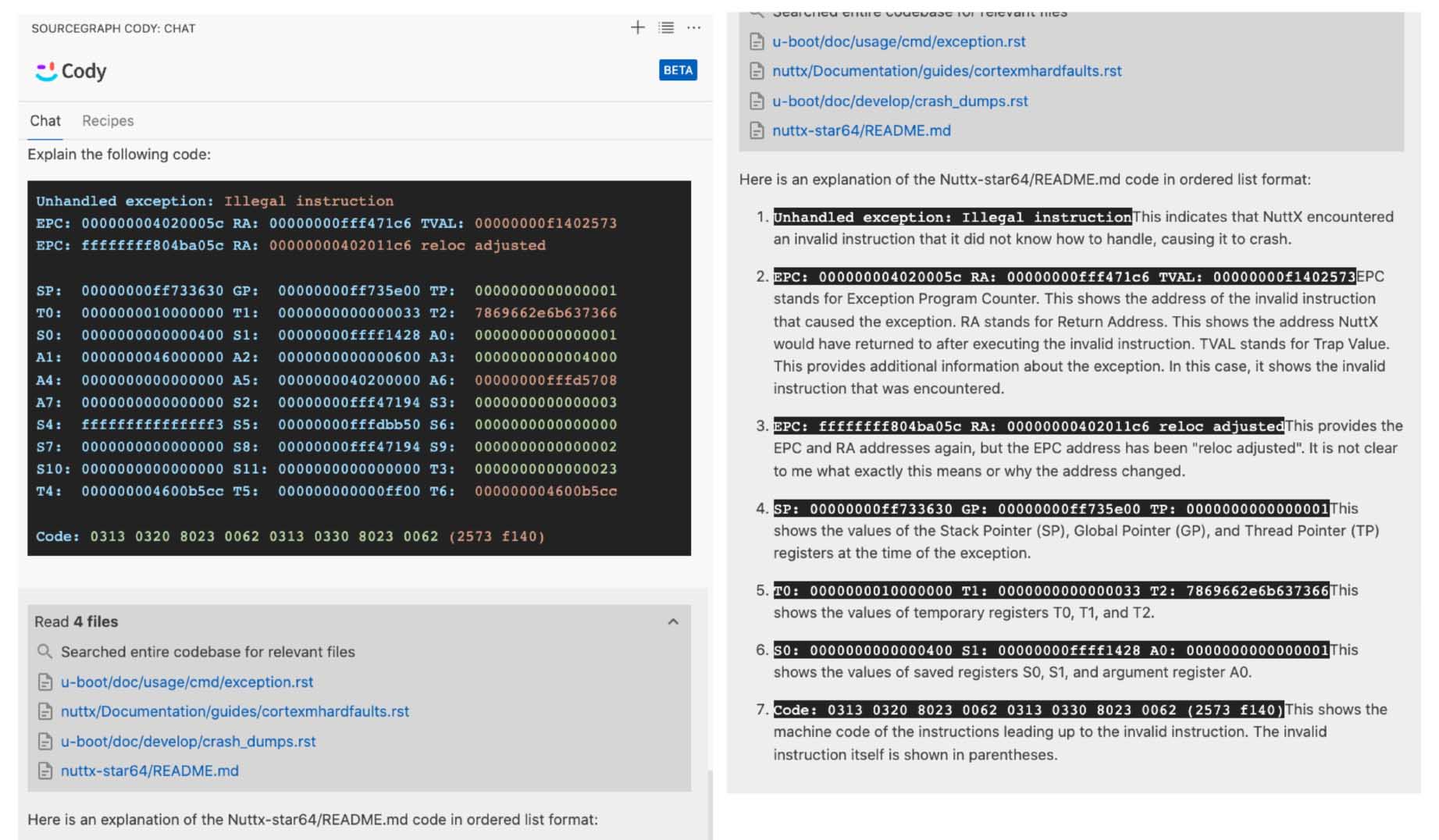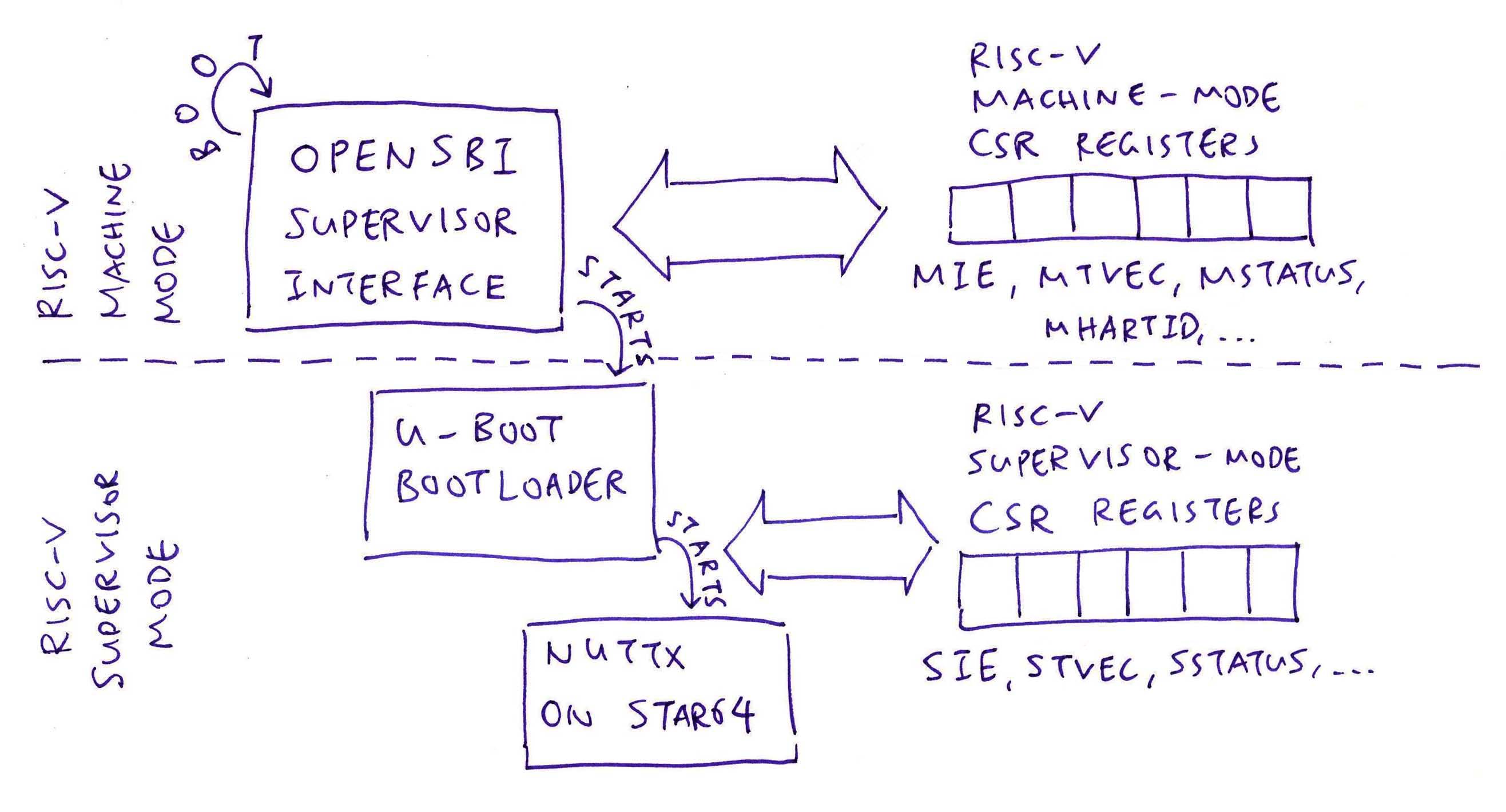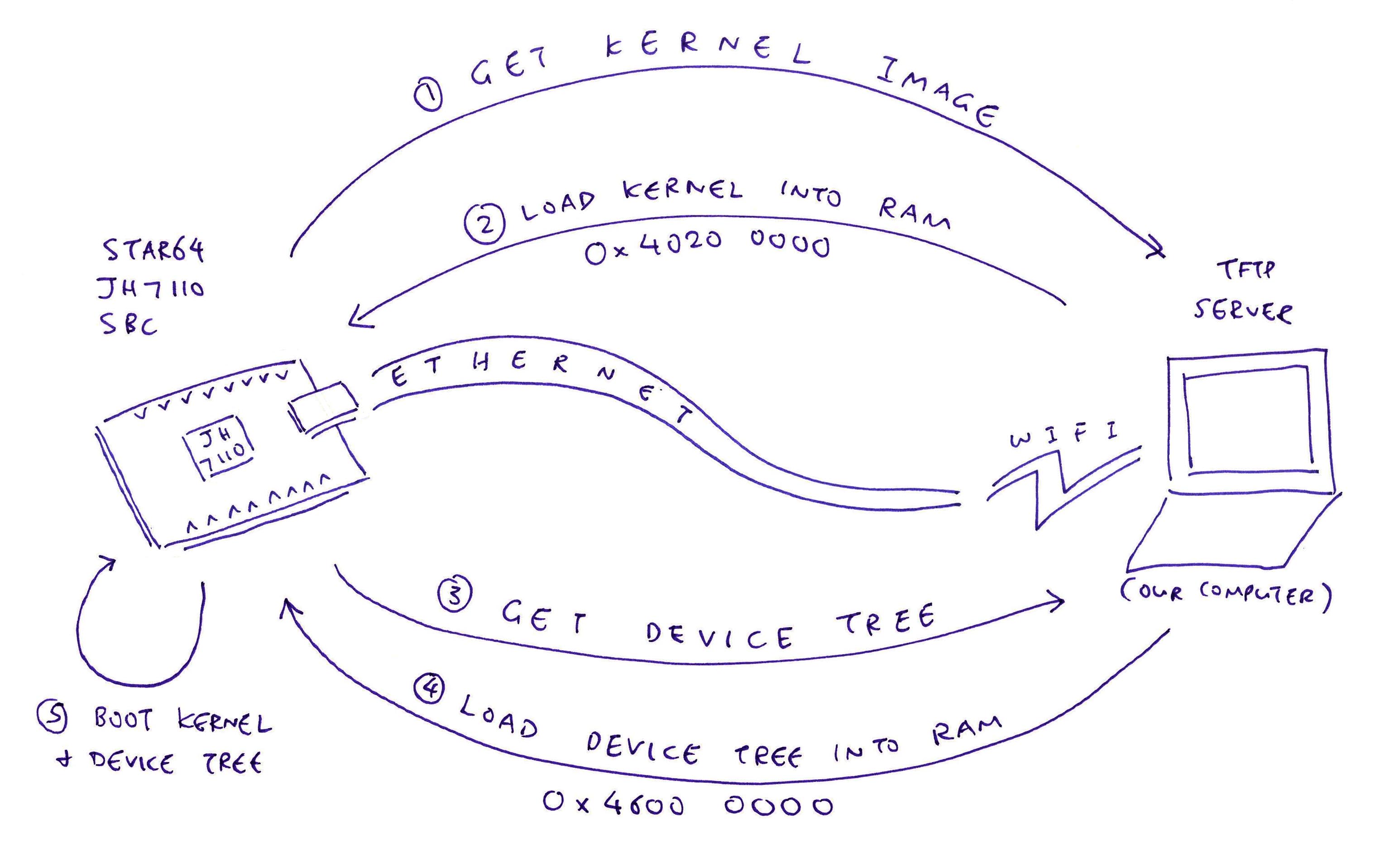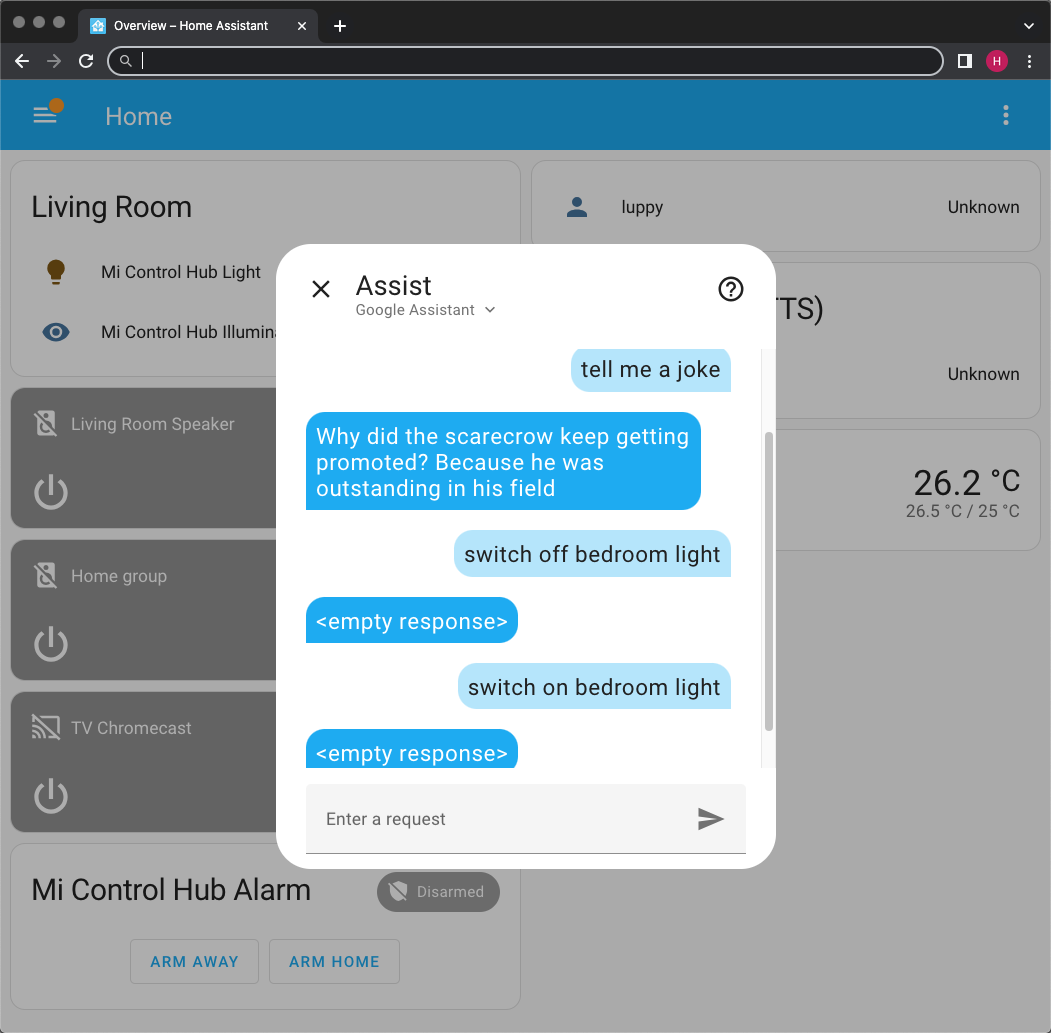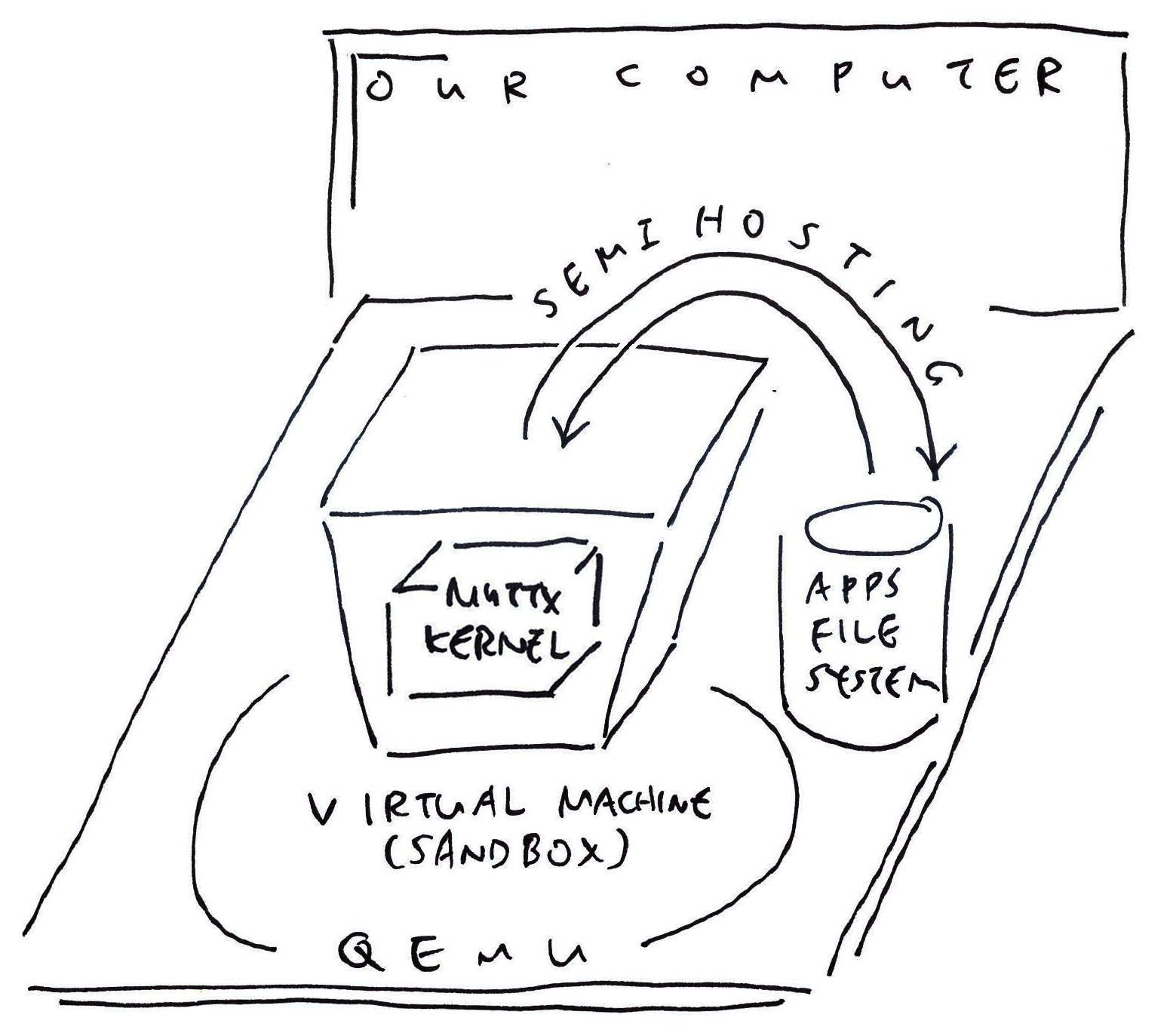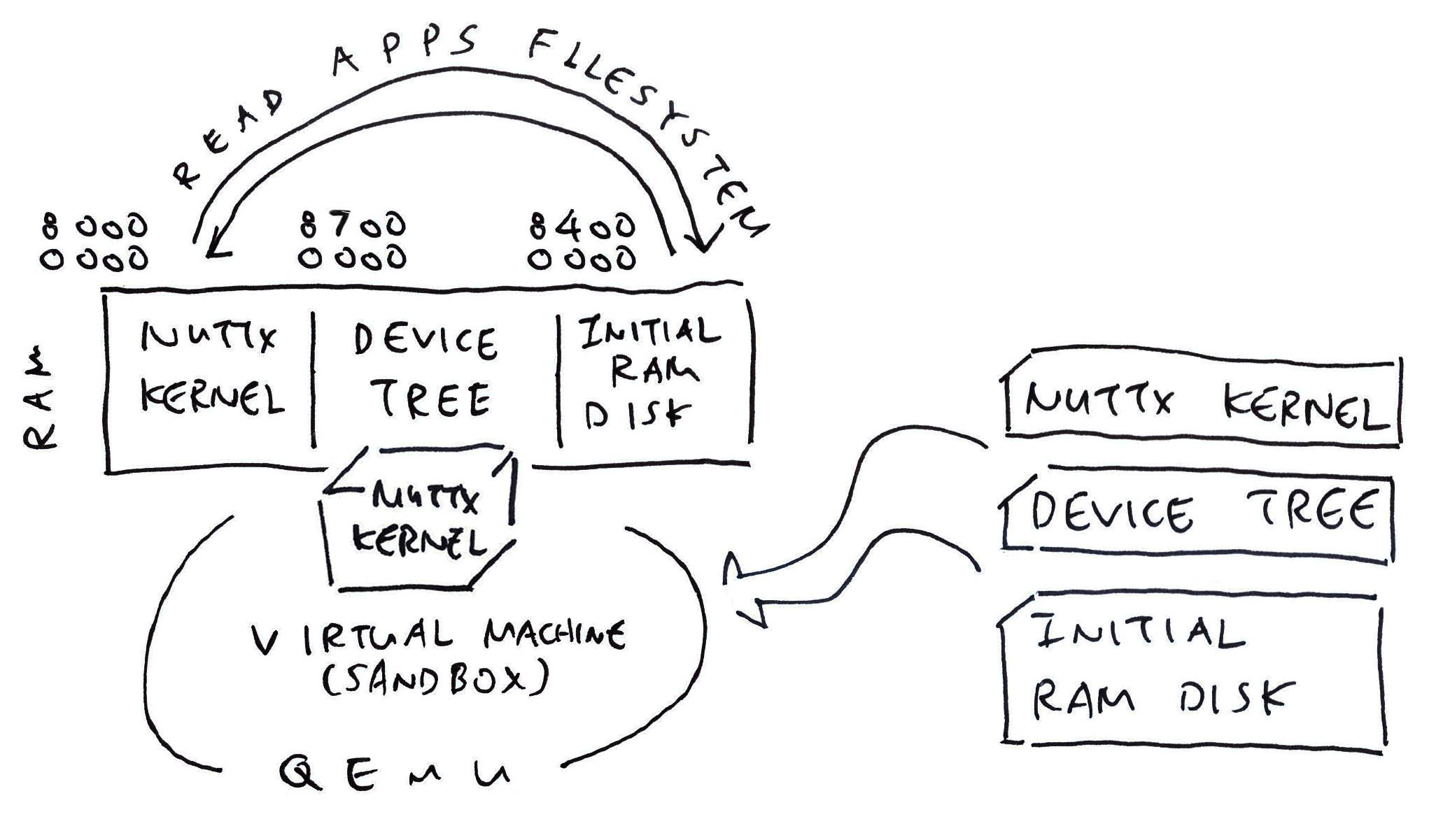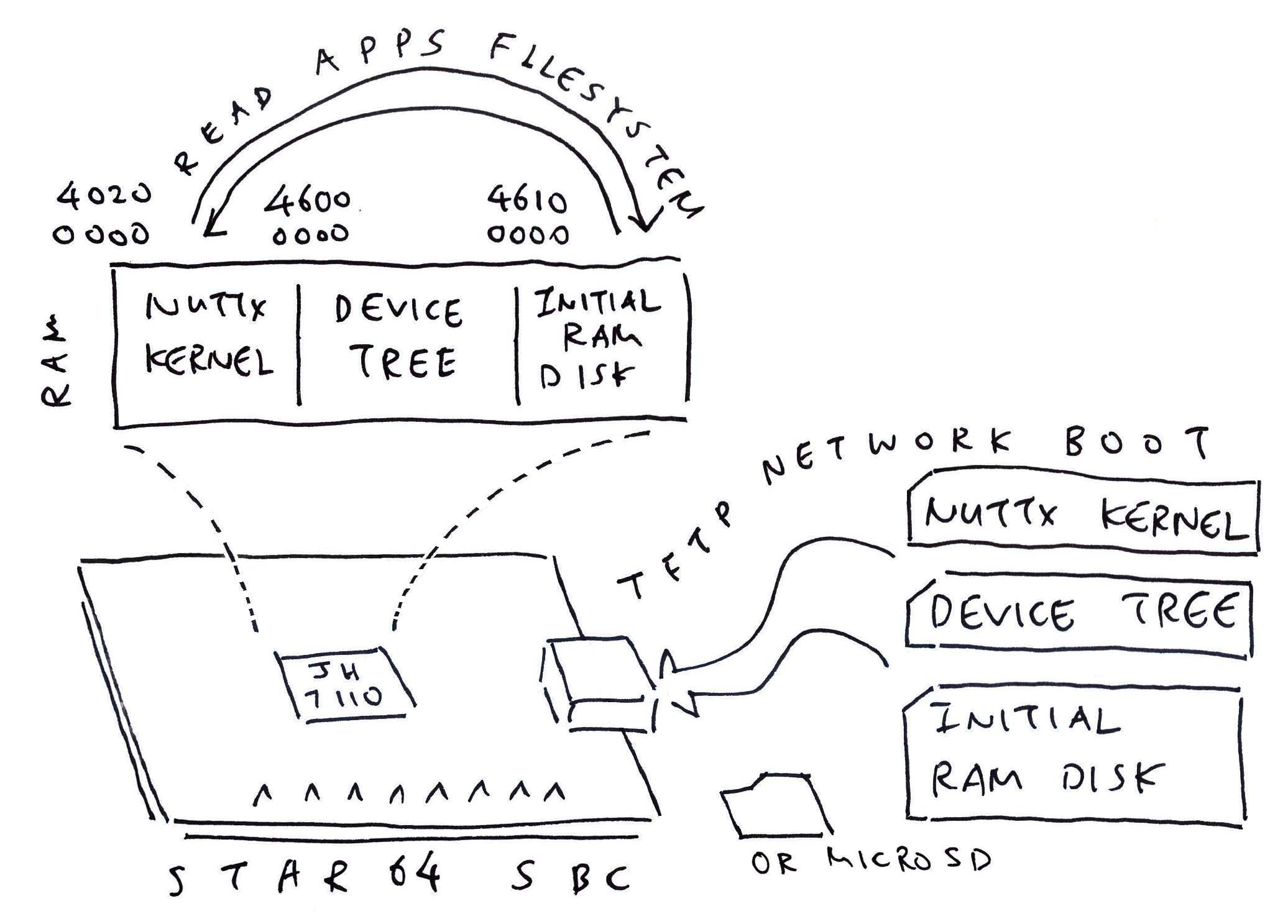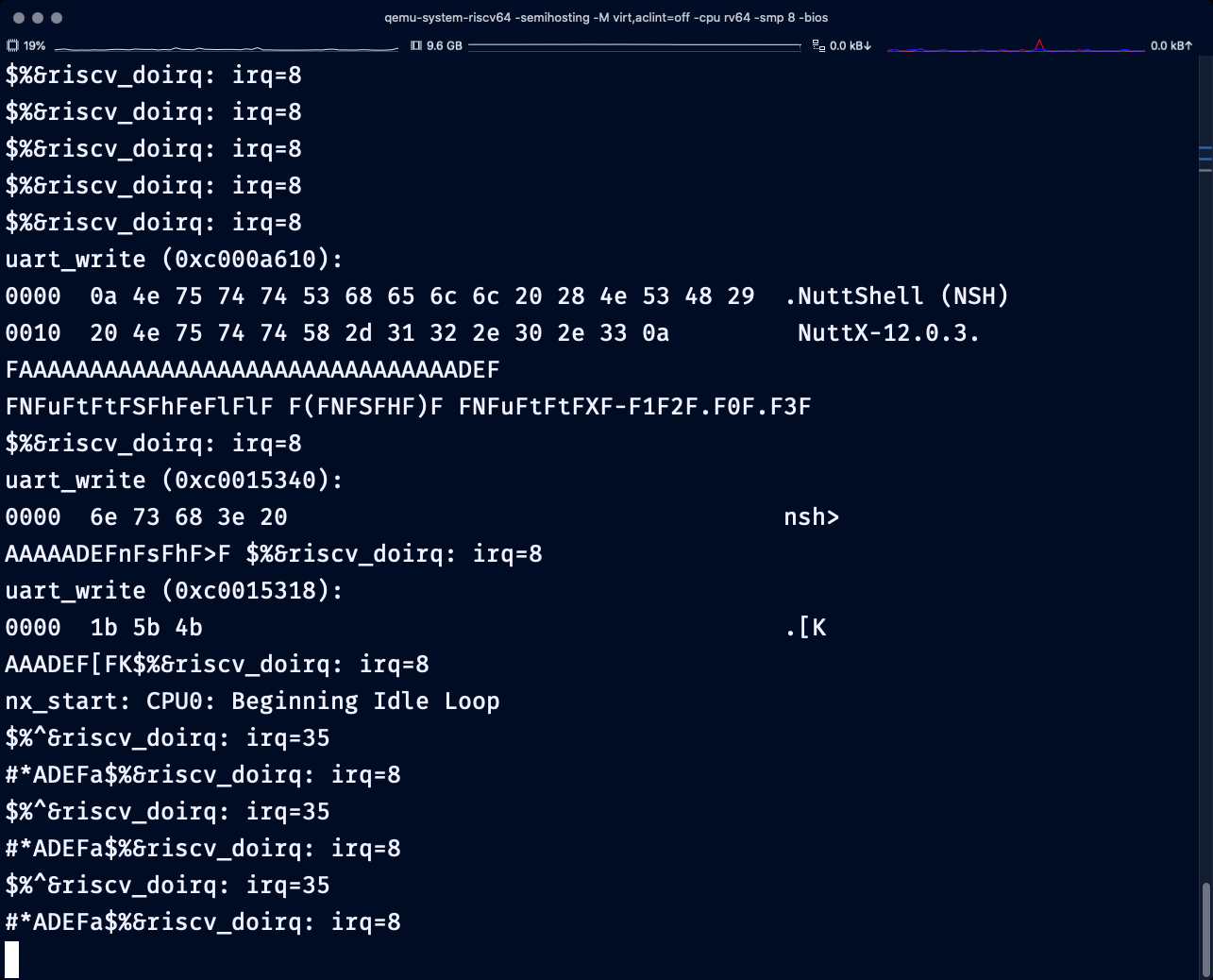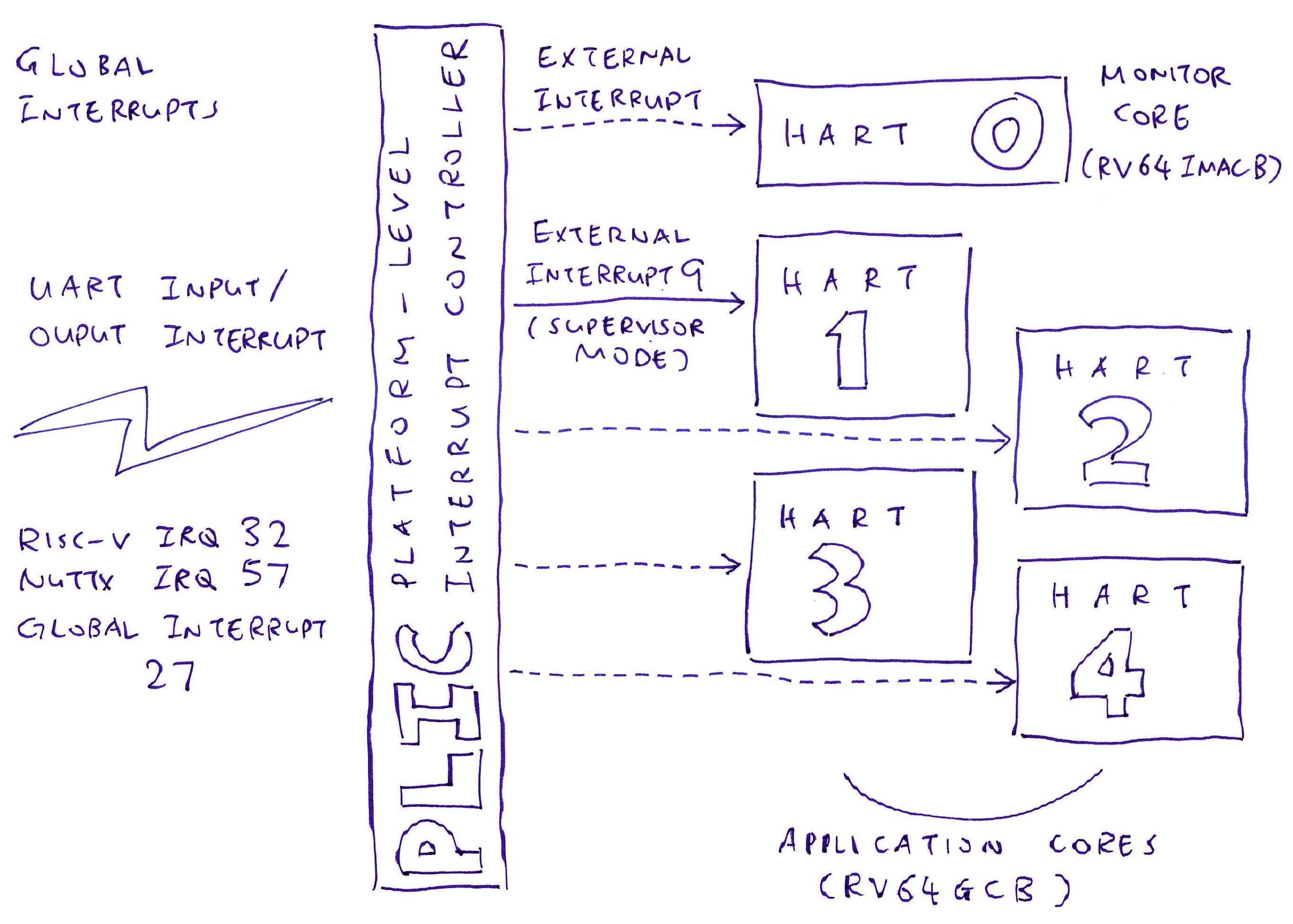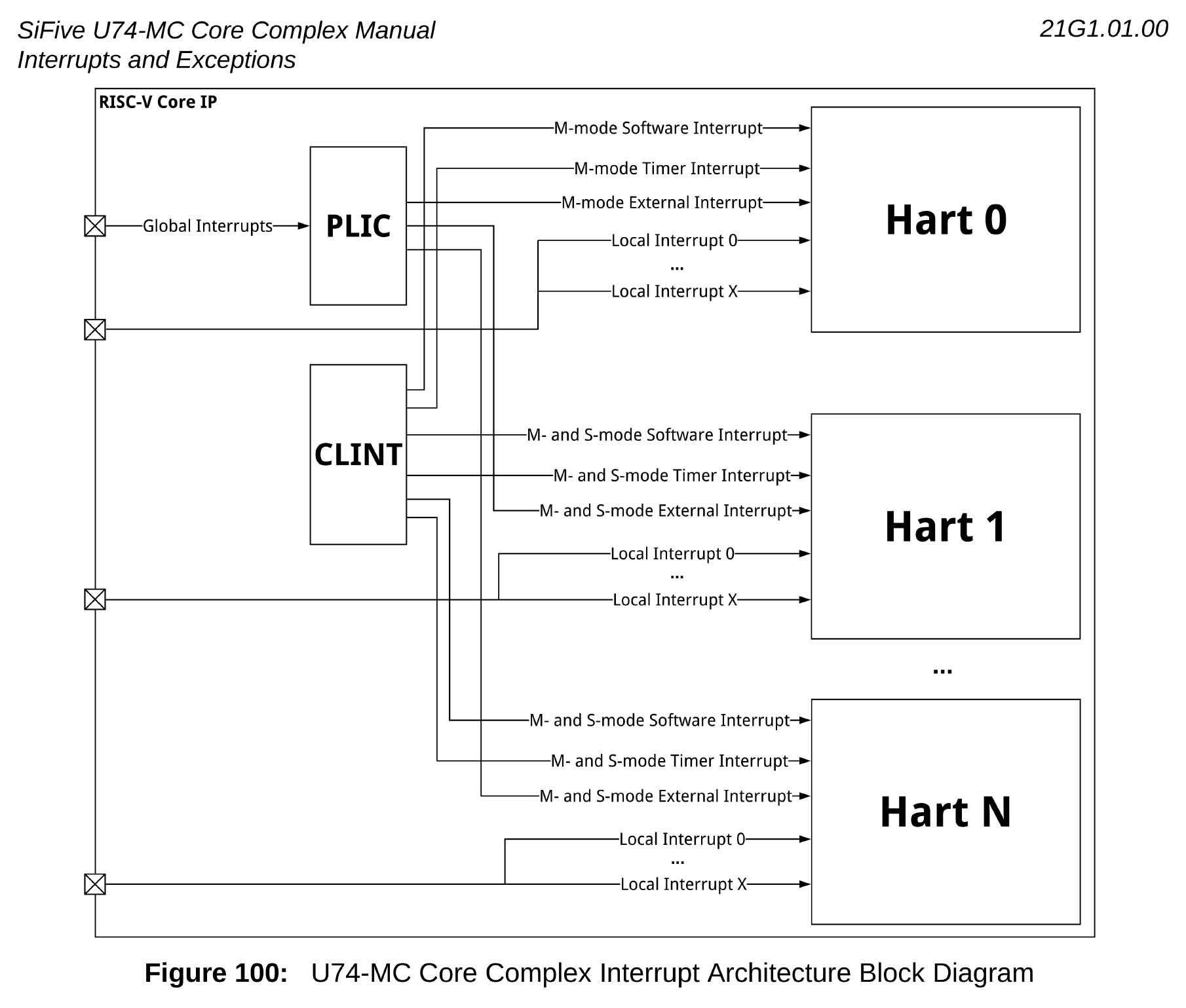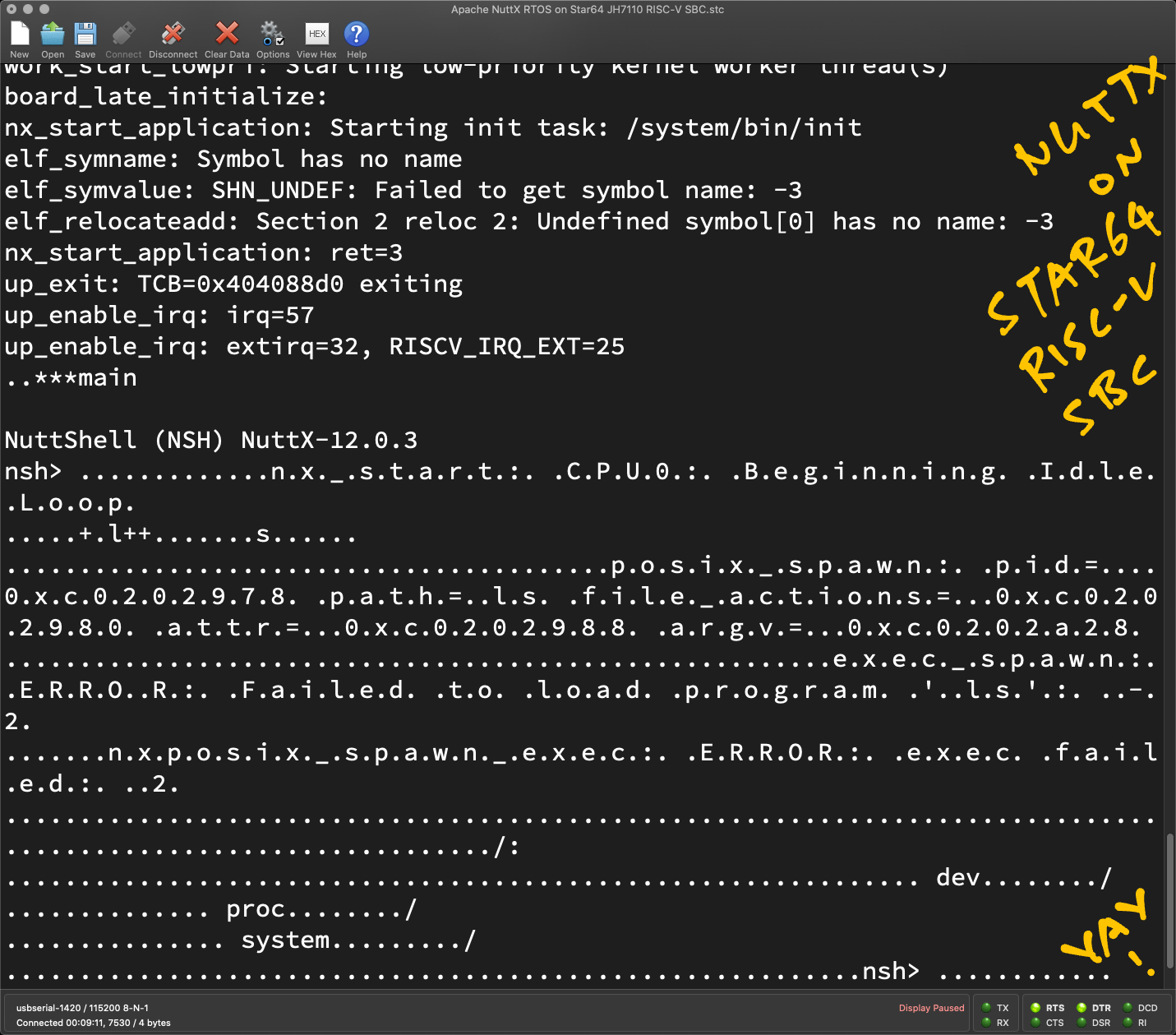| jh7110-visionfive-v2.dtb | ||
| jh7110-visionfive-v2.dts | ||
| LICENSE | ||
| nuttx.its | ||
| qemu-riscv64.dtb | ||
| qemu-riscv64.dts | ||
| README.md | ||
Apache NuttX RTOS for Pine64 Star64 64-bit RISC-V SBC (StarFive JH7110)
Read the articles...
-
"Star64 JH7110 + NuttX RTOS: RISC-V PLIC Interrupts and Serial I/O"
-
"Star64 JH7110 + NuttX RTOS: RISC-V Semihosting and Initial RAM Disk"
-
"Star64 JH7110 + NuttX RTOS: RISC-V Privilege Levels and UART Registers"
-
"Star64 JH7110 RISC-V SBC: Boot from Network with U-Boot and TFTP"
Earlier articles...
Let's port Apache NuttX RTOS to Pine64 Star64 64-bit RISC-V SBC!
(Based on StarFive JH7110 SoC)
Hopefully NuttX will run on Pine64 PineTab-V, which is also based on StarFive JH7110 SoC.
Linux Images for Star64
Let's examine the Linux Images for Star64 SBC, to see how U-Boot Bootloader is configured. (We'll boot NuttX later with U-Boot)
According to Software Releases for Star64, we have...
-
Yocto Images at pine64.my-ho.st
Let's inspect star64-image-minimal
-
Let's inspect Armbian 23.8 Lunar (Minimal)
Current state of RISC-V Linux: Linux on RISC-V (2022)
Armbian Image for Star64
Let's inspect the Armbian Image for Star64: Armbian 23.8 Lunar (Minimal)
Uncompress the .xz, mount the .img file on Linux / macOS / Windows as an ISO Volume.
The image contains 1 used partition: armbi_root (612 MB) that contains the Linux Root Filesystem.
Plus one unused partition (4 MB) at the top. (Partition Table)
We see the U-Boot Bootloader Configuration at armbi_root/boot/extlinux/extlinux.conf...
label Armbian
kernel /boot/Image
initrd /boot/uInitrd
fdt /boot/dtb/starfive/jh7110-star64-pine64.dtb
append root=UUID=99f62df4-be35-475c-99ef-2ba3f74fe6b5 console=ttyS0,115200n8 console=tty0 earlycon=sbi rootflags=data=writeback stmmaceth=chain_mode:1 rw rw no_console_suspend consoleblank=0 fsck.fix=yes fsck.repair=yes net.ifnames=0 splash plymouth.ignore-serial-consoles
This says that U-Boot will load the Linux Kernel from armbi_root/boot/Image
Which is sym-linked to armbi_root/boot/vmlinuz-5.15.0-starfive2
Where in RAM will the Kernel Image be loaded?
According to kernel_addr_r from the Default U-Boot Settings, the Linux Kernel will be loaded at RAM Address 0x4020 0000...
kernel_addr_r=0x40200000
Everything looks hunky dory?
Nope the Flattened Device Tree (FDT) is missing!
But the Flattened Device Tree (FDT) is missing! /boot/dtb/starfive/jh7110-star64-pine64.dtb
fdt /boot/dtb/starfive/jh7110-star64-pine64.dtb
Which means that Armbian will fail to boot on Star64!
Retrieving file: /boot/uInitrd
10911538 bytes read in 466 ms (22.3 MiB/s)
Retrieving file: /boot/Image
22040576 bytes read in 936 ms (22.5 MiB/s)
Retrieving file: /boot/dtb/starfive/jh7110-star64-pine64.dtb
Failed to load '/boot/dtb/starfive/jh7110-star64-pine64.dtb'
The missing Device Tree is noted in this Pine64 Forum Post. So we might need to check back later for the Official Armbian Image, if it's fixed.
(balbes150 suggests that we try this Armbian Image instead)
For Reference: Here's the list of Supported Device Trees...
→ ls /Volumes/armbi_root/boot/dtb-5.15.0-starfive2/starfive
evb-overlay jh7110-evb-usbdevice.dtb
jh7110-evb-can-pdm-pwmdac.dtb jh7110-evb.dtb
jh7110-evb-dvp-rgb2hdmi.dtb jh7110-fpga.dtb
jh7110-evb-i2s-ac108.dtb jh7110-visionfive-v2-A10.dtb
jh7110-evb-pcie-i2s-sd.dtb jh7110-visionfive-v2-A11.dtb
jh7110-evb-spi-uart2.dtb jh7110-visionfive-v2-ac108.dtb
jh7110-evb-uart1-rgb2hdmi.dtb jh7110-visionfive-v2-wm8960.dtb
jh7110-evb-uart4-emmc-spdif.dtb jh7110-visionfive-v2.dtb
jh7110-evb-uart5-pwm-i2c-tdm.dtb vf2-overlay
And here are the other files in /boot...
→ ls -l /Volumes/armbi_root/boot
total 94416
lrwxrwxrwx 24 Image -> vmlinuz-5.15.0-starfive2
-rw-r--r-- 4276712 System.map-5.15.0-starfive2
-rw-r--r-- 1536 armbian_first_run.txt.template
-rw-r--r-- 38518 boot.bmp
-rw-r--r-- 144938 config-5.15.0-starfive2
lrwxrwxrwx 20 dtb -> dtb-5.15.0-starfive2
drwxr-xr-x 0 dtb-5.15.0-starfive2
drwxrwxr-x 0 extlinux
lrwxrwxrwx 27 initrd.img -> initrd.img-5.15.0-starfive2
-rw-r--r-- 10911474 initrd.img-5.15.0-starfive2
lrwxrwxrwx 27 initrd.img.old -> initrd.img-5.15.0-starfive2
-rw-rw-r-- 341 uEnv.txt
lrwxrwxrwx 24 uInitrd -> uInitrd-5.15.0-starfive2
-rw-r--r-- 10911538 uInitrd-5.15.0-starfive2
lrwxrwxrwx 24 vmlinuz -> vmlinuz-5.15.0-starfive2
-rw-r--r-- 22040576 vmlinuz-5.15.0-starfive2
lrwxrwxrwx 24 vmlinuz.old -> vmlinuz-5.15.0-starfive2
TODO: Explain boot/uInitrd RAM Disk
Yocto Image for Star64
Let's inspect the Yocto Image for Star64: star64-image-minimal
Uncompress the .bz2, rename as .img. Balena Etcher won't work with .bz2 files!
Write the .img to a microSD Card with Balena Etcher. Insert the microSD Card into a Linux Machine. (Like Pinebook Pro)
We see 4 used partitions...
-
spl (2 MB): Secondary Program Loader
-
uboot (4 MB): U-Boot Bootloader
-
boot (380 MB): U-Boot Configuration and Linux Kernel Image
-
root (686 MB): Linux Root Filesystem
Plus one unused partition (2 MB) at the top. (Partition Table)
boot partition has 2 files...
$ ls -l /run/media/$USER/boot
total 14808
-rw-r--r-- 1 15151064 Apr 6 2011 fitImage
-rw-r--r-- 1 1562 Apr 6 2011 vf2_uEnv.txt
boot/vf2_uEnv.txt contains the U-Boot Bootloader Configuration...
# This is the sample jh7110_uEnv.txt file for starfive visionfive U-boot
# The current convention (SUBJECT TO CHANGE) is that this file
# will be loaded from the third partition on the
# MMC card.
#devnum=1
partnum=3
# The FIT file to boot from
fitfile=fitImage
# for debugging boot
bootargs_ext=if test ${devnum} = 0; then setenv bootargs "earlyprintk console=tty1 console=ttyS0,115200 rootwait earlycon=sbi root=/dev/mmcblk0p4"; else setenv bootargs "earlyprintk console=tty1 console=ttyS0,115200 rootwait earlycon=sbi root=/dev/mmcblk1p4"; fi;
#bootargs=earlyprintk console=ttyS0,115200 debug rootwait earlycon=sbi root=/dev/mmcblk1p4
# for addr info
fileaddr=0xa0000000
fdtaddr=0x46000000
# boot Linux flat or compressed 'Image' stored at 'kernel_addr_r'
kernel_addr_r=0x40200000
irdaddr=46100000
irdsize=5f00000
# Use the FDT in the FIT image..
setupfdt1=fdt addr ${fdtaddr}; fdt resize;
setupird=setexpr irdend ${irdaddr} + ${irdsize}; fdt set /chosen linux,initrd-start <0x0 0x${irdaddr}>; fdt set /chosen linux,initrd-end <0x0 0x${irdend}>
setupfdt2=fdt set /chosen bootargs "${bootargs}";
bootwait=setenv _delay ${bootdelay}; echo ${_delay}; while test ${_delay} > 0; do sleep 1; setexpr _delay ${_delay} - 1; echo ${_delay}; done
boot2=run bootargs_ext; mmc dev ${devnum}; fatload mmc ${devnum}:${partnum} ${fileaddr} ${fitfile}; bootm start ${fileaddr}; run setupfdt1;run setupird;run setupfdt2; bootm loados ${fileaddr}; run chipa_set_linux; run cpu_vol_set; echo "Booting kernel in"; booti ${kernel_addr_r} ${irdaddr}:${filesize} ${fdtaddr}
kernel_addr_r says that Linux Kernel will be loaded at 0x4020 0000...
# boot Linux flat or compressed 'Image' stored at 'kernel_addr_r'
kernel_addr_r=0x40200000
Yocto boots from the Flat Image Tree (FIT): boot/fitImage
Yocto's root/boot looks different from Armbian...
$ ls -l /run/media/$USER/root/boot
total 24376
lrwxrwxrwx 1 17 Mar 9 2018 fitImage -> fitImage-5.15.107
-rw-r--r-- 1 9807808 Mar 9 2018 fitImage-5.15.107
-rw-r--r-- 1 15151064 Mar 9 2018 fitImage-initramfs-5.15.107
Boot NuttX with U-Boot Bootloader
Will we boot NuttX with Armbian or Yocto settings?
Armbian looks simpler, since it uses a plain Linux Kernel Image File Image. (Instead of Yocto's complicated Flat Image Tree)
Hence we'll overwrite Armbian's armbi_root/boot/Image by the NuttX Kernel Image.
We'll compile NuttX Kernel to boot at 0x4020 0000.
NuttX Kernel will begin with a RISC-V Linux Header. (See next section)
We'll use a Temporary File for the Flattened Device Tree (FDT) since it's missing from Armbian.
Inside the Armbian Kernel Image
What's inside the Armbian Linux Kernel Image?
Let's look inside armbi_root/boot/vmlinuz-5.15.0-starfive2...
See the "RISCV" at 0x30? That's the Magic Number for the RISC-V Linux Image Header!
u32 code0; /* Executable code */
u32 code1; /* Executable code */
u64 text_offset; /* Image load offset, little endian */
u64 image_size; /* Effective Image size, little endian */
u64 flags; /* kernel flags, little endian */
u32 version; /* Version of this header */
u32 res1 = 0; /* Reserved */
u64 res2 = 0; /* Reserved */
u64 magic = 0x5643534952; /* Magic number, little endian, "RISCV" */
u32 magic2 = 0x05435352; /* Magic number 2, little endian, "RSC\x05" */
u32 res3; /* Reserved for PE COFF offset */
This is how we decode the RISC-V Linux Header...
Let's decompile the Kernel Image...
TODO: Explain MZ and the funny RISC-V instruction at the top
Decompile Armbian Kernel Image with Ghidra
We decompile the Armbian Linux Kernel Image with Ghidra.
In Ghidra, create a New Project. Click File > Import File.
Select armbi_root/boot/vmlinuz-5.15.0-starfive2 and enter these Import Options...
-
Format: Raw Binary
-
Language: RISCV > RV64GC (RISCV:LE:64:RV64GC:gcc)
-
Options > Base Address: 0x44000000
(Based on the U-Boot Configuration from above)
Double-click vmlinuz-5.15.0-starfive2, analyse the file with the Default Options.
Ghidra displays the Decompiled Linux Kernel...
At Address 0x4400 0002 we see a Jump to FUN_440010c8...
// Load -13 into Register S4
li s4,-0xd
// Jump to Actual Boot Code
j FUN_440010c8
Double-click FUN_440010c8 to see the Linux Boot Code...
TODO: Explain MZ and the funny RISC-V instruction at the top
TODO: Where is the source file?
TODO: Any interesting CSR Instructions?
Serial Console on Star64
To access the Serial Console, we connect a USB Serial Adapter to Star64...
According to Star64 Schematic, UART0 TX and RX (GPIO 5 and 6) are connected to the Pi GPIO Header (Pins 8 and 10).
Thus we connect these pins...
| Star64 GPIO Header | USB Serial Adapter | Wire Colour |
|---|---|---|
| Pin 6 (GND) | GND | Brown |
| Pin 8 (TX) | RX | Red |
| Pin 10 (RX) | TX | Orange |
Set the Voltage Jumper to 3V3. (Instead of 5V)
On our computer, connect to the USB Serial Port at 115.2 kbps...
screen /dev/ttyUSB0 115200
Power up Star64. The DIP Switches for GPIO 0 and 1 default to Low and Low, so Star64 should boot from Flash Memory, which has the U-Boot Bootloader inside.
(DIP Switch Labels are inverted: "ON" actually means "Low")
We'll see this U-Boot Bootloader Log...
TODO: Explain OpenSBI
Star64 U-Boot Bootloader Log
Here's the log for U-Boot Bootloader on Star64 (without microSD Card)...
U-Boot SPL 2021.10 (Jan 19 2023 - 04:09:41 +0800)
DDR version: dc2e84f0.
Trying to boot from SPI
OpenSBI v1.2
____ _____ ____ _____
/ __ \ / ____| _ \_ _|
| | | |_ __ ___ _ __ | (___ | |_) || |
| | | | '_ \ / _ \ '_ \ \___ \| _ < | |
| |__| | |_) | __/ | | |____) | |_) || |_
\____/| .__/ \___|_| |_|_____/|____/_____|
| |
|_|
Platform Name : StarFive VisionFive V2
Platform Features : medeleg
Platform HART Count : 5
Platform IPI Device : aclint-mswi
Platform Timer Device : aclint-mtimer @ 4000000Hz
Platform Console Device : uart8250
Platform HSM Device : jh7110-hsm
Platform PMU Device : ---
Platform Reboot Device : pm-reset
Platform Shutdown Device : pm-reset
Firmware Base : 0x40000000
Firmware Size : 288 KB
Runtime SBI Version : 1.0
Domain0 Name : root
Domain0 Boot HART : 1
Domain0 HARTs : 0*,1*,2*,3*,4*
Domain0 Region00 : 0x0000000002000000-0x000000000200ffff (I)
Domain0 Region01 : 0x0000000040000000-0x000000004007ffff ()
Domain0 Region02 : 0x0000000000000000-0xffffffffffffffff (R,W,X)
Domain0 Next Address : 0x0000000040200000
Domain0 Next Arg1 : 0x0000000042200000
Domain0 Next Mode : S-mode
Domain0 SysReset : yes
Boot HART ID : 1
Boot HART Domain : root
Boot HART Priv Version : v1.11
Boot HART Base ISA : rv64imafdcbx
Boot HART ISA Extensions : none
Boot HART PMP Count : 8
Boot HART PMP Granularity : 4096
Boot HART PMP Address Bits: 34
Boot HART MHPM Count : 2
Boot HART MIDELEG : 0x0000000000000222
Boot HART MEDELEG : 0x000000000000b109
U-Boot 2021.10 (Jan 19 2023 - 04:09:41 +0800), Build: jenkins-github_visionfive2-6
CPU: rv64imacu
Model: StarFive VisionFive V2
DRAM: 8 GiB
MMC: sdio0@16010000: 0, sdio1@16020000: 1
Loading Environment from SPIFlash... SF: Detected gd25lq128 with page size 256 Bytes, erase size 4 KiB, total 16 MiB
*** Warning - bad CRC, using default environment
StarFive EEPROM format v2
--------EEPROM INFO--------
Vendor : PINE64
Product full SN: STAR64V1-2310-D008E000-00000003
data version: 0x2
PCB revision: 0xc1
BOM revision: A
Ethernet MAC0 address: 6c:cf:39:00:75:5d
Ethernet MAC1 address: 6c:cf:39:00:75:5e
--------EEPROM INFO--------
In: serial@10000000
Out: serial@10000000
Err: serial@10000000
Model: StarFive VisionFive V2
Net: eth0: ethernet@16030000, eth1: ethernet@16040000
Card did not respond to voltage select! : -110
Card did not respond to voltage select! : -110
bootmode flash device 0
Card did not respond to voltage select! : -110
Hit any key to stop autoboot: 2 1 0
Card did not respond to voltage select! : -110
Couldn't find partition mmc 0:3
Can't set block device
Importing environment from mmc0 ...
## Warning: Input data exceeds 1048576 bytes - truncated
## Info: input data size = 1048578 = 0x100002
Card did not respond to voltage select! : -110
Couldn't find partition mmc 1:2
Can't set block device
## Warning: defaulting to text format
## Error: "boot2" not defined
Card did not respond to voltage select! : -110
ethernet@16030000 Waiting for PHY auto negotiation to complete......... TIMEOUT !
phy_startup() failed: -110FAILED: -110ethernet@16040000 Waiting for PHY auto negotiation to complete......... TIMEOUT !
phy_startup() failed: -110FAILED: -110ethernet@16030000 Waiting for PHY auto negotiation to complete......... TIMEOUT !
phy_startup() failed: -110FAILED: -110ethernet@16040000 Waiting for PHY auto negotiation to complete......... TIMEOUT !
phy_startup() failed: -110FAILED: -110StarFive #
StarFive #
Which is OK because we haven't inserted a microSD Card.
U-Boot Commands for Star64
Here are the U-Boot Commands...
StarFive # help
? - alias for 'help'
base - print or set address offset
bdinfo - print Board Info structure
blkcache - block cache diagnostics and control
boot - boot default, i.e., run 'bootcmd'
bootd - boot default, i.e., run 'bootcmd'
bootefi - Boots an EFI payload from memory
bootelf - Boot from an ELF image in memory
booti - boot Linux kernel 'Image' format from memory
bootm - boot application image from memory
bootp - boot image via network using BOOTP/TFTP protocol
bootvx - Boot vxWorks from an ELF image
cmp - memory compare
config - print .config
coninfo - print console devices and information
cp - memory copy
cpu - display information about CPUs
crc32 - checksum calculation
dhcp - boot image via network using DHCP/TFTP protocol
dm - Driver model low level access
echo - echo args to console
editenv - edit environment variable
eeprom - EEPROM sub-system
efidebug - Configure UEFI environment
env - environment handling commands
erase - erase FLASH memory
eraseenv - erase environment variables from persistent storage
exit - exit script
ext2load - load binary file from a Ext2 filesystem
ext2ls - list files in a directory (default /)
ext4load - load binary file from a Ext4 filesystem
ext4ls - list files in a directory (default /)
ext4size - determine a file's size
ext4write - create a file in the root directory
false - do nothing, unsuccessfully
fatinfo - print information about filesystem
fatload - load binary file from a dos filesystem
fatls - list files in a directory (default /)
fatmkdir - create a directory
fatrm - delete a file
fatsize - determine a file's size
fatwrite - write file into a dos filesystem
fdt - flattened device tree utility commands
flinfo - print FLASH memory information
fstype - Look up a filesystem type
fstypes - List supported filesystem types
fsuuid - Look up a filesystem UUID
go - start application at address 'addr'
gpio - query and control gpio pins
gpt - GUID Partition Table
gzwrite - unzip and write memory to block device
help - print command description/usage
i2c - I2C sub-system
iminfo - print header information for application image
imxtract - extract a part of a multi-image
itest - return true/false on integer compare
ln - Create a symbolic link
load - load binary file from a filesystem
loadb - load binary file over serial line (kermit mode)
loads - load S-Record file over serial line
loadx - load binary file over serial line (xmodem mode)
loady - load binary file over serial line (ymodem mode)
log - log system
loop - infinite loop on address range
ls - list files in a directory (default /)
lzmadec - lzma uncompress a memory region
mac - display and program the system ID and MAC addresses in EEPROM
md - memory display
misc - Access miscellaneous devices with MISC uclass driver APIs
mm - memory modify (auto-incrementing address)
mmc - MMC sub system
mmcinfo - display MMC info
mw - memory write (fill)
net - NET sub-system
nfs - boot image via network using NFS protocol
nm - memory modify (constant address)
panic - Panic with optional message
part - disk partition related commands
ping - send ICMP ECHO_REQUEST to network host
pinmux - show pin-controller muxing
printenv - print environment variables
protect - enable or disable FLASH write protection
random - fill memory with random pattern
reset - Perform RESET of the CPU
run - run commands in an environment variable
save - save file to a filesystem
saveenv - save environment variables to persistent storage
setenv - set environment variables
setexpr - set environment variable as the result of eval expression
sf - SPI flash sub-system
showvar - print local hushshell variables
size - determine a file's size
sleep - delay execution for some time
source - run script from memory
sysboot - command to get and boot from syslinux files
test - minimal test like /bin/sh
tftpboot - boot image via network using TFTP protocol
tftpput - TFTP put command, for uploading files to a server
true - do nothing, successfully
unlz4 - lz4 uncompress a memory region
unzip - unzip a memory region
version - print monitor, compiler and linker version
U-Boot Settings for Star64
Here are the U-Boot Settings...
StarFive # printenv
baudrate=115200
boot_a_script=load ${devtype} ${devnum}:${distro_bootpart} ${scriptaddr} ${prefix}${script}; source ${scriptaddr}
boot_efi_binary=load ${devtype} ${devnum}:${distro_bootpart} ${kernel_addr_r} efi/boot/bootriscv64.efi; if fdt addr ${fdt_addr_r}; then bootefi ${kernel_addr_r} ${fdt_addr_r};else bootefi ${kernel_addr_r} ${fdtcontroladdr};fi
boot_efi_bootmgr=if fdt addr ${fdt_addr_r}; then bootefi bootmgr ${fdt_addr_r};else bootefi bootmgr;fi
boot_extlinux=sysboot ${devtype} ${devnum}:${distro_bootpart} any ${scriptaddr} ${prefix}${boot_syslinux_conf}
boot_prefixes=/ /boot/
boot_script_dhcp=boot.scr.uimg
boot_scripts=boot.scr.uimg boot.scr
boot_syslinux_conf=extlinux/extlinux.conf
boot_targets=mmc0 dhcp
bootargs=console=ttyS0,115200 debug rootwait earlycon=sbi
bootcmd=run load_vf2_env;run importbootenv;run load_distro_uenv;run boot2;run distro_bootcmd
bootcmd_dhcp=devtype=dhcp; if dhcp ${scriptaddr} ${boot_script_dhcp}; then source ${scriptaddr}; fi;setenv efi_fdtfile ${fdtfile}; setenv efi_old_vci ${bootp_vci};setenv efi_old_arch ${bootp_arch};setenv bootp_vci PXEClient:Arch:00027:UNDI:003000;setenv bootp_arch 0x1b;if dhcp ${kernel_addr_r}; then tftpboot ${fdt_addr_r} dtb/${efi_fdtfile};if fdt addr ${fdt_addr_r}; then bootefi ${kernel_addr_r} ${fdt_addr_r}; else bootefi ${kernel_addr_r} ${fdtcontroladdr};fi;fi;setenv bootp_vci ${efi_old_vci};setenv bootp_arch ${efi_old_arch};setenv efi_fdtfile;setenv efi_old_arch;setenv efi_old_vci;
bootcmd_distro=run fdt_loaddtb; run fdt_sizecheck; run set_fdt_distro; sysboot mmc ${fatbootpart} fat c0000000 ${bootdir}/${boot_syslinux_conf};
bootcmd_mmc0=devnum=0; run mmc_boot
bootdelay=2
bootdir=/boot
bootenv=uEnv.txt
bootmode=flash
bootpart=0:3
chip_vision=UNKOWN
chipa_gmac_set=fdt set /soc/ethernet@16030000/ethernet-phy@0 tx_inverted_10 <0x0>;fdt set /soc/ethernet@16030000/ethernet-phy@0 tx_inverted_100 <0x0>;fdt set /soc/ethernet@16030000/ethernet-phy@0 tx_inverted_1000 <0x0>;fdt set /soc/ethernet@16030000/ethernet-phy@0 tx_delay_sel <0x9>;fdt set /soc/ethernet@16040000/ethernet-phy@1 tx_inverted_10 <0x0>;fdt set /soc/ethernet@16040000/ethernet-phy@1 tx_inverted_100 <0x0>;fdt set /soc/ethernet@16040000/ethernet-phy@1 tx_inverted_1000 <0x0>;fdt set /soc/ethernet@16040000/ethernet-phy@1 tx_delay_sel <0x9>
chipa_set=if test ${chip_vision} = A; then run chipa_gmac_set;fi;
chipa_set_linux=fdt addr ${fdt_addr_r};run visionfive2_mem_set;run chipa_set;
chipa_set_linux_force=fdt addr ${fdt_addr_r};run visionfive2_mem_set;run chipa_gmac_set;
chipa_set_uboot=fdt addr ${uboot_fdt_addr};run chipa_set;
chipa_set_uboot_force=fdt addr ${uboot_fdt_addr};run chipa_gmac_set;
devnum=0
distro_bootcmd=for target in ${boot_targets}; do run bootcmd_${target}; done
distroloadaddr=0xb0000000
efi_dtb_prefixes=/ /dtb/ /dtb/current/
eth0addr=6c:cf:39:00:75:5d
eth1addr=6c:cf:39:00:75:5e
ethact=ethernet@16030000
ethaddr=6c:cf:39:00:75:5d
ext4bootenv=ext4load mmc ${bootpart} ${loadaddr} ${bootdir}/${bootenv}
fatbootpart=1:2
fdt_addr_r=0x46000000
fdt_high=0xffffffffffffffff
fdt_loaddtb=fatload mmc ${fatbootpart} ${fdt_addr_r} ${bootdir}/dtbs/${fdtfile}; fdt addr ${fdt_addr_r};
fdt_sizecheck=fatsize mmc ${fatbootpart} ${bootdir}/dtbs/${fdtfile};
fdtaddr=fffc6aa0
fdtcontroladdr=fffc6aa0
fdtfile=starfive/starfive_visionfive2.dtb
importbootenv=echo Importing environment from mmc${devnum} ...; env import -t ${loadaddr} ${filesize}
initrd_high=0xffffffffffffffff
ipaddr=192.168.120.230
kernel_addr_r=0x40200000
load_distro_uenv=fatload mmc ${fatbootpart} ${distroloadaddr} ${bootdir}/${bootenv}; env import ${distroloadaddr} 17c;
load_efi_dtb=load ${devtype} ${devnum}:${distro_bootpart} ${fdt_addr_r} ${prefix}${efi_fdtfile}
load_vf2_env=fatload mmc ${bootpart} ${loadaddr} ${testenv}
loadaddr=0xa0000000
loadbootenv=fatload mmc ${bootpart} ${loadaddr} ${bootenv}
memory_addr=40000000
memory_size=200000000
mmc_boot=if mmc dev ${devnum}; then devtype=mmc; run scan_dev_for_boot_part; fi
mmcbootenv=run scan_mmc_dev; setenv bootpart ${devnum}:${mmcpart}; if mmc rescan; then run loadbootenv && run importbootenv; run ext4bootenv && run importbootenv; if test -n $uenvcmd; then echo Running uenvcmd ...; run uenvcmd; fi; fi
mmcpart=3
netmask=255.255.255.0
partitions=name=loader1,start=17K,size=1M,type=${type_guid_gpt_loader1};name=loader2,size=4MB,type=${type_guid_gpt_loader2};name=system,size=-,bootable,type=${type_guid_gpt_system};
preboot=run chipa_set_uboot;run mmcbootenv
pxefile_addr_r=0x45900000
ramdisk_addr_r=0x46100000
scan_dev_for_boot=echo Scanning ${devtype} ${devnum}:${distro_bootpart}...; for prefix in ${boot_prefixes}; do run scan_dev_for_extlinux; run scan_dev_for_scripts; done;run scan_dev_for_efi;
scan_dev_for_boot_part=part list ${devtype} ${devnum} -bootable devplist; env exists devplist || setenv devplist 1; for distro_bootpart in ${devplist}; do if fstype ${devtype} ${devnum}:${distro_bootpart} bootfstype; then run scan_dev_for_boot; fi; done; setenv devplist
scan_dev_for_efi=setenv efi_fdtfile ${fdtfile}; for prefix in ${efi_dtb_prefixes}; do if test -e ${devtype} ${devnum}:${distro_bootpart} ${prefix}${efi_fdtfile}; then run load_efi_dtb; fi;done;run boot_efi_bootmgr;if test -e ${devtype} ${devnum}:${distro_bootpart} efi/boot/bootriscv64.efi; then echo Found EFI removable media binary efi/boot/bootriscv64.efi; run boot_efi_binary; echo EFI LOAD FAILED: continuing...; fi; setenv efi_fdtfile
scan_dev_for_extlinux=if test -e ${devtype} ${devnum}:${distro_bootpart} ${prefix}${boot_syslinux_conf}; then echo Found ${prefix}${boot_syslinux_conf}; run boot_extlinux; echo SCRIPT FAILED: continuing...; fi
scan_dev_for_scripts=for script in ${boot_scripts}; do if test -e ${devtype} ${devnum}:${distro_bootpart} ${prefix}${script}; then echo Found U-Boot script ${prefix}${script}; run boot_a_script; echo SCRIPT FAILED: continuing...; fi; done
scan_mmc_dev=if test ${bootmode} = flash; then if mmc dev ${devnum}; then echo found device ${devnum};else setenv devnum 0;mmc dev 0;fi; fi; echo bootmode ${bootmode} device ${devnum};
scan_sf_for_scripts=${devtype} read ${scriptaddr} ${script_offset_f} ${script_size_f}; source ${scriptaddr}; echo SCRIPT FAILED: continuing...
script_offset_f=0x1fff000
script_size_f=0x1000
scriptaddr=0x43900000
serial#=STAR64V1-2310-D008E000-00000003
set_fdt_distro=if test ${chip_vision} = A; then if test ${memory_size} = 200000000; then run chipa_gmac_set;run visionfive2_mem_set;fatwrite mmc ${fatbootpart} ${fdt_addr_r} ${bootdir}/dtbs/${fdtfile} ${filesize};else run chipa_gmac_set;run visionfive2_mem_set;fatwrite mmc ${fatbootpart} ${fdt_addr_r} ${bootdir}/dtbs/${fdtfile} ${filesize};fi;else run visionfive2_mem_set;fatwrite mmc ${fatbootpart} ${fdt_addr_r} ${bootdir}/dtbs/${fdtfile} ${filesize};fi;
sf_boot=if sf probe ${busnum}; then devtype=sf; run scan_sf_for_scripts; fi
stderr=serial@10000000
stdin=serial@10000000
stdout=serial@10000000
testenv=vf2_uEnv.txt
type_guid_gpt_loader1=5B193300-FC78-40CD-8002-E86C45580B47
type_guid_gpt_loader2=2E54B353-1271-4842-806F-E436D6AF6985
type_guid_gpt_system=0FC63DAF-8483-4772-8E79-3D69D8477DE4
uboot_fdt_addr=0xfffc6aa0
ver=U-Boot 2021.10 (Jan 19 2023 - 04:09:41 +0800)
visionfive2_mem_set=fdt memory ${memory_addr} ${memory_size};
Environment size: 7246/65532 bytes
StarFive #
Boot Armbian on Star64
Let's boot Armbian on Star64!
We download the Armbian Image for Star64: Armbian 23.8 Lunar (Minimal)
Uncompress the .xz, write the .img to a microSD Card with Balena Etcher.
Here's what happens when we boot the microSD Card on Star64...
Armbian fails to boot...
Found /boot/extlinux/extlinux.conf
Retrieving file: /boot/extlinux/extlinux.conf
383 bytes read in 7 ms (52.7 KiB/s)
1:[6CArmbian
Retrieving file: /boot/uInitrd
10911538 bytes read in 466 ms (22.3 MiB/s)
Retrieving file: /boot/Image
22040576 bytes read in 936 ms (22.5 MiB/s)
append: root=UUID=99f62df4-be35-475c-99ef-2ba3f74fe6b5 console=ttyS0,115200n8 console=tty0 earlycon=sbi rootflags=data=writeback stmmaceth=chain_mode:1 rw rw no_console_suspend consoleblank=0 fsck.fix=yes fsck.repair=yes net.ifnames=0 splash plymouth.ignore-serial-consoles
Retrieving file: /boot/dtb/starfive/jh7110-star64-pine64.dtb
Failed to load '/boot/dtb/starfive/jh7110-star64-pine64.dtb'
Skipping Armbian for failure retrieving FDT
The Flattened Device Tree (FDT) is missing! /boot/dtb/starfive/jh7110-star64-pine64.dtb
→ ls /Volumes/armbi_root/boot/dtb-5.15.0-starfive2/starfive
evb-overlay jh7110-evb-usbdevice.dtb
jh7110-evb-can-pdm-pwmdac.dtb jh7110-evb.dtb
jh7110-evb-dvp-rgb2hdmi.dtb jh7110-fpga.dtb
jh7110-evb-i2s-ac108.dtb jh7110-visionfive-v2-A10.dtb
jh7110-evb-pcie-i2s-sd.dtb jh7110-visionfive-v2-A11.dtb
jh7110-evb-spi-uart2.dtb jh7110-visionfive-v2-ac108.dtb
jh7110-evb-uart1-rgb2hdmi.dtb jh7110-visionfive-v2-wm8960.dtb
jh7110-evb-uart4-emmc-spdif.dtb jh7110-visionfive-v2.dtb
jh7110-evb-uart5-pwm-i2c-tdm.dtb vf2-overlay
The missing Device Tree is noted in this Pine64 Forum Post. So we might need to check back later for the Official Armbian Image, if it's fixed.
(balbes150 suggests that we try this Armbian Image instead)
Boot Yocto on Star64
Now we boot Yocto on Star64.
We download the Yocto Minimal Image for Star64: star64-image-minimal
Uncompress the .bz2, rename as .img. Balena Etcher won't work with .bz2 files!
Write the .img to a microSD Card with Balena Etcher.
Here's what happens when we boot the microSD Card on Star64...
Usernames and Passwords are...
- root / pine64
- pine64 / pine64
Yep the Yocto Minimal Image boots OK on Star64!
Boot Yocto Plasma on Star64
Finally we boot Yocto Plasma on Star64.
We download the Yocto Plasma Image for Star64: star64-image-plasma
Uncompress the .bz2, rename as .img. Balena Etcher won't work with .bz2 files!
Write the .img to a microSD Card with Balena Etcher.
When we boot the microSD Card on Star64, the Plasma Desktop Environment runs OK on a HDMI Display! (Pic below)
Usernames and Passwords are...
- root / pine64
- pine64 / pine64
NuttX prints to QEMU Console
Our NuttX Kernel will print to Star64 Serial Console for debugging. Before that, let's write some RISC-V Assembly Code to print to the QEMU Console!
Earlier we ran NuttX on QEMU Emulator for 64-bit RISC-V...
QEMU emulates a 16550 UART Port. (Similar to Star64 / JH7110)
What's the Base Address of QEMU's UART Port?
According to the NuttX Configuration for QEMU: nsh64/defconfig
CONFIG_16550_ADDRWIDTH=0
CONFIG_16550_UART0=y
CONFIG_16550_UART0_BASE=0x10000000
CONFIG_16550_UART0_CLOCK=3686400
CONFIG_16550_UART0_IRQ=37
CONFIG_16550_UART0_SERIAL_CONSOLE=y
CONFIG_16550_UART=y
Base Address of QEMU's UART Port is 0x1000 0000. (Same as Star64 / JH7110 yay!)
How to print to the 16550 UART Port?
Let's check the 16550 UART Driver in NuttX. From uart_16550.c:
/****************************************************************************
* Name: u16550_send
*
* Description:
* This method will send one byte on the UART
*
****************************************************************************/
static void u16550_send(struct uart_dev_s *dev, int ch)
{
FAR struct u16550_s *priv = (FAR struct u16550_s *)dev->priv;
u16550_serialout(priv, UART_THR_OFFSET, (uart_datawidth_t)ch);
}
(u16550_serialout is defined here)
To print a character, the driver writes to the UART Base Address (0x1000 0000) at Offset UART_THR_OFFSET.
And we discover that UART_THR_OFFSET is 0:
#define UART_THR_INCR 0 /* (DLAB =0) Transmit Holding Register */
#define UART_THR_OFFSET (CONFIG_16550_REGINCR*UART_THR_INCR)
So we can transmit to UART Port by simply writing to 0x1000 0000. How convenient!
How to print to the QEMU Console?
Let's do the printing in RISC-V Assembly Code, so that we can debug the NuttX Boot Code.
From qemu_rv_head.S:
/* Load UART Base Address to Register t0 */
li t0, 0x10000000
/* Load `1` to Register t1 */
li t1, 0x31
/* Store byte from Register t1 to UART Base Address, Offset 0 */
sb t1, 0(t0)
/* Load `2` to Register t1 */
li t1, 0x32
/* Store byte from Register t1 to UART Base Address, Offset 0 */
sb t1, 0(t0)
/* Load `3` to Register t1 */
li t1, 0x33
/* Store byte from Register t1 to UART Base Address, Offset 0 */
sb t1, 0(t0)
This prints "123" to the QEMU Console. Here's the output:
+ qemu-system-riscv64 \
-semihosting \
-M virt,aclint=on \
-cpu rv64 \
-smp 8 \
-bios none \
-kernel nuttx \
-nographic
123123123123123123112323
NuttShell (NSH) NuttX-12.0.3
nsh>
Which is correct because QEMU is running with 8 CPUs. Yay!
Cody AI Assistant explains our RISC-V Assembly Code...
And offers to optimise our RISC-V Assembly Code...
But the output is incorrect ;-)
+ qemu-system-riscv64 -semihosting -M virt,aclint=on -cpu rv64 -smp 8 -bios none -kernel nuttx -nographic
11111111
NuttShell (NSH) NuttX-12.0.3
nsh>
The correct output is 123123123123123123112323. (Because of the 8 CPUs)
UART Base Address for Star64
We'll take the UART Assembly Code from the previous section and run on Star64 / JH7110. (So we can troubleshoot the NuttX Boot Code)
Does Star64 / JH7110 use a 16550 UART Controller like QEMU?
According to the JH7110 UART Developing Guide, Star64 / JH7110 uses the 8250 UART Controller...
Which is compatible with QEMU's 16550 UART Controller. So our UART Assembly Code for QEMU will run on Star64!
What's the UART Base Address for Star64 / JH7110?
Based on JH7110 System Memory Map, UART0 is at 0x1000 0000.
Also from the JH7110 UART Device Tree: UART Register Base Address is 0x1000 0000 with range 0x10000.
Isn't that the same UART Base Address as QEMU?
Let's check the UART Base Address in NuttX for QEMU. From nsh64/defconfig:
CONFIG_16550_ADDRWIDTH=0
CONFIG_16550_UART0=y
CONFIG_16550_UART0_BASE=0x10000000
CONFIG_16550_UART0_CLOCK=3686400
CONFIG_16550_UART0_IRQ=37
CONFIG_16550_UART0_SERIAL_CONSOLE=y
CONFIG_16550_UART=y
NuttX UART Base Address is 0x1000 0000. The exact same UART Base Address for QEMU AND Star64!
So no changes needed, our UART Assembly Code will run on QEMU AND Star64 yay!
RISC-V Linux Kernel Header
For U-Boot Bootloader to boot NuttX, we need to embed the RISC-V Linux Kernel Header...
This is how we decode the RISC-V Linux Header...
We copy the Arm64 Linux Header from arm64_head.S...
And tweak for RISC-V Linux Header, like this: qemu_rv_head.S:
__start:
/* Begin Test */
/* DO NOT MODIFY. Image Header expected by Linux bootloaders.
*
* This `li` instruction has no meaningful effect except that
* its opcode forms the magic "MZ" signature of a PE/COFF file
* that is required for UEFI applications.
*
* Some bootloaders check the magic "MZ" to see if the image is a valid
* Linux image. But modifying the bootLoader is unnecessary unless we
* need to do a customized secure boot. So we just put "MZ" in the
* header to make the bootloader happy.
*/
c.li s4, -13 /* Magic Signature "MZ" (2 bytes) */
j real_start /* Jump to Kernel Start (2 bytes) */
.long 0 /* Executable Code padded to 8 bytes */
.quad 0x200000 /* Image load offset from start of RAM */
/* TODO: _e_initstack - __start */
.quad 171644 /* Effective size of kernel image, little-endian */
.quad 0x0 /* Kernel flags, little-endian */
.long 0x2 /* Version of this header */
.long 0 /* Reserved */
.quad 0 /* Reserved */
.ascii "RISCV\x00\x00\x00" /* Magic number, "RISCV" (8 bytes) */
.ascii "RSC\x05" /* Magic number 2, "RSC\x05" (4 bytes) */
.long 0 /* Reserved for PE COFF offset */
real_start:
/* Load UART Base Address to Register t0 */
li t0, 0x10000000
Note that Image Load Offset must be 0x20 0000!
.quad 0x200000 /* Image load offset from start of RAM */
That's because our kernel starts at 0x4020 0000
Here's the assembled output...
0000000040200000 <__start>:
li s4, -0xd /* Magic Signature "MZ" (2 bytes) */
40200000: 5a4d li s4,-13
j real_start /* Jump to Kernel Start (2 bytes) */
40200002: a83d j 40200040 <real_start>
40200004: 0000 unimp
40200006: 0000 unimp
40200008: 0000 unimp
4020000a: 0020 addi s0,sp,8
4020000c: 0000 unimp
4020000e: 0000 unimp
40200010: 9e7c 0x9e7c
40200012: 0002 c.slli64 zero
...
40200020: 0002 c.slli64 zero
...
4020002e: 0000 unimp
40200030: 4952 lw s2,20(sp)
40200032: 00564353 fadd.s ft6,fa2,ft5,rmm
40200036: 0000 unimp
40200038: 5352 lw t1,52(sp)
4020003a: 00000543 fmadd.s fa0,ft0,ft0,ft0,rne
...
0000000040200040 <real_start>:
Check that the lengths and offsets match the RISC-V Linux Header Format...
And our RISC-V Boot Code tested OK with QEMU.
Set Start Address of NuttX Kernel
Earlier we saw that Star64's U-Boot Bootloader will load Linux Kernels into RAM at Address 0x4020 0000...
To boot NuttX on Star64, let's set the Start Address of the NuttX Kernel to 0x4020 0000.
From nsh64/defconfig:
CONFIG_RAM_SIZE=33554432
CONFIG_RAM_START=0x80000000
We changed the above NuttX Build Config to 0x40200000
We also updated the Linker Script: ld.script
SECTIONS
{
/* Previously 0x80000000 */
. = 0x40200000;
.text :
Remember to change this if building for NuttX Kernel Mode: ld-kernel64.script:
MEMORY
{
/* Previously 0x80000000 */
kflash (rx) : ORIGIN = 0x40200000, LENGTH = 2048K /* w/ cache */
/* Previously 0x80200000 */
ksram (rwx) : ORIGIN = 0x40400000, LENGTH = 2048K /* w/ cache */
/* Previously 0x80400000 */
pgram (rwx) : ORIGIN = 0x40600000, LENGTH = 4096K /* w/ cache */
}
...
SECTIONS
{
/* Previously 0x80000000 */
. = 0x40200000;
.text :
Which should match knsh64/defconfig:
CONFIG_ARCH_PGPOOL_PBASE=0x40600000
CONFIG_ARCH_PGPOOL_VBASE=0x40600000
// TODO: Fix CONFIG_RAM_SIZE
CONFIG_RAM_SIZE=1048576
CONFIG_RAM_START=0x40200000
RISC-V Disassembly of NuttX Kernel shows that the Start Address is correct...
0000000040200000 <__start>:
li s4, -0xd /* Magic Signature "MZ" (2 bytes) */
40200000: 5a4d li s4,-13
j real_start /* Jump to Kernel Start (2 bytes) */
40200002: a83d j 40200040 <real_start>
We're ready to boot NuttX on Star64!
Boot NuttX on Star64
Let's boot NuttX on Star64! We compile NuttX for 64-bit RISC-V QEMU with these tweaks...
For the microSD Image, we pick this Armbian Image for Star64...
Write the Armbian Image to a microSD Card with Balena Etcher.
We fix the Missing Device Tree...
## Fix the Missing Device Tree
sudo chmod go+w /run/media/$USER/armbi_root/boot
sudo chmod go+w /run/media/$USER/armbi_root/boot/dtb/starfive
cp \
/run/media/$USER/armbi_root/boot/dtb/starfive/jh7110-visionfive-v2.dtb \
/run/media/$USER/armbi_root/boot/dtb/starfive/jh7110-star64-pine64.dtb
Then we delete the sym-link /boot/Image and copy the NuttX Binary Image nuttx.bin to /boot/Image...
## We assume that `nuttx` contains the NuttX ELF Image.
## Export the NuttX Binary Image to `nuttx.bin`
riscv64-unknown-elf-objcopy \
-O binary \
nuttx \
nuttx.bin
## Delete Armbian Kernel `/boot/Image`
rm /run/media/$USER/armbi_root/boot/Image
## Copy `nuttx.bin` to Armbian Kernel `/boot/Image`
cp nuttx.bin /run/media/$USER/armbi_root/boot/Image
Insert the microSD Card into Star64 and power up.
NuttX boots with 123 yay! (Which is printed by our Boot Code)
Starting kernel ...
clk u5_dw_i2c_clk_core already disabled
clk u5_dw_i2c_clk_apb already disabled
123
Unhandled exception: Illegal instruction
Here's the complete log...
Retrieving file: /boot/extlinux/extlinux.conf
383 bytes read in 7 ms (52.7 KiB/s)
1:[6CArmbian
Retrieving file: /boot/uInitrd
10911538 bytes read in 466 ms (22.3 MiB/s)
Retrieving file: /boot/Image
163201 bytes read in 14 ms (11.1 MiB/s)
append: root=UUID=99f62df4-be35-475c-99ef-2ba3f74fe6b5 console=ttyS0,115200n8 console=tty0 earlycon=sbi rootflags=data=writeback stmmaceth=chain_mode:1 rw rw no_console_suspend consoleblank=0 fsck.fix=yes fsck.repair=yes net.ifnames=0 splash plymouth.ignore-serial-consoles
Retrieving file: /boot/dtb/starfive/jh7110-star64-pine64.dtb
50235 bytes read in 14 ms (3.4 MiB/s)
## Loading init Ramdisk from Legacy Image at 46100000 ...
Image Name: uInitrd
Image Type: RISC-V Linux RAMDisk Image (gzip compressed)
Data Size: 10911474 Bytes = 10.4 MiB
Load Address: 00000000
Entry Point: 00000000
Verifying Checksum ... OK
## Flattened Device Tree blob at 46000000
Booting using the fdt blob at 0x46000000
Using Device Tree in place at 0000000046000000, end 000000004600f43a
Starting kernel ...
clk u5_dw_i2c_clk_core already disabled
clk u5_dw_i2c_clk_apb already disabled
123Unhandled exception: Illegal instruction
EPC: 000000004020005c RA: 00000000fff471c6 TVAL: 00000000f1402573
EPC: ffffffff804ba05c RA: 00000000402011c6 reloc adjusted
SP: 00000000ff733630 GP: 00000000ff735e00 TP: 0000000000000001
T0: 0000000010000000 T1: 0000000000000033 T2: 7869662e6b637366
S0: 0000000000000400 S1: 00000000ffff1428 A0: 0000000000000001
A1: 0000000046000000 A2: 0000000000000600 A3: 0000000000004000
A4: 0000000000000000 A5: 0000000040200000 A6: 00000000fffd5708
A7: 0000000000000000 S2: 00000000fff47194 S3: 0000000000000003
S4: fffffffffffffff3 S5: 00000000fffdbb50 S6: 0000000000000000
S7: 0000000000000000 S8: 00000000fff47194 S9: 0000000000000002
S10: 0000000000000000 S11: 0000000000000000 T3: 0000000000000023
T4: 000000004600b5cc T5: 000000000000ff00 T6: 000000004600b5cc
Code: 0313 0320 8023 0062 0313 0330 8023 0062 (2573 f140)
resetting ...
reset not supported yet
### ERROR ### Please RESET the board ###
Why does NuttX crash at 4020005c? See the next section...
Cody AI Assistant tries to explain our RISC-V Exception
NuttX Fails To Get Hart ID
Earlier we saw NuttX crashing when booting on Star64...
Starting kernel ...
clk u5_dw_i2c_clk_core already disabled
clk u5_dw_i2c_clk_apb already disabled
123
Unhandled exception: Illegal instruction
EPC: 000000004020005c RA: 00000000fff471c6 TVAL: 00000000f1402573
Why did NuttX crash at 4020005c?
Here's our RISC-V Boot Code...
From qemu_rv_head.S:
nuttx/arch/risc-v/src/chip/qemu_rv_head.S:95
/* Load mhartid (cpuid) */
csrr a0, mhartid
4020005c: f1402573 csrr a0, mhartid
NuttX tries loads the CPU ID or Hardware Thread "Hart" ID from the RISC-V Control and Status Register (CSR). (Explained here)
But it fails! Because we don't have sufficient privilege to access the Hart ID...
RISC-V Privilege Levels
RISC-V runs at 3 Privilege Levels...
-
M: Machine Mode (Most powerful)
-
S: Supervisor Mode (Less powerful)
-
U: User Mode (Least powerful)
NuttX runs at Supervisor Mode, which doesn't allow access to Machine-Mode CSR Registers. (Including Hart ID)
(The m in mhartid signifies that it's a Machine-Mode Register)
What runs in Machine Mode?
OpenSBI (Supervisor Binary Interface) is the first thing that boots on Star64. It runs at Machine Mode and starts the U-Boot Bootloader.
What about U-Boot Bootloader?
U-Boot Bootloader runs in Supervisor Mode. And starts NuttX, also in Supervisor Mode.
So OpenSBI is the only thing that runs in Machine Mode. And can access the Machine-Level Registers.
QEMU doesn't have this problem?
Because QEMU runs everything in (super-powerful) Machine Mode!
NuttX needs to fetch the Hart ID with a different recipe...
Downgrade NuttX to Supervisor Mode
How to get the Hart ID from OpenSBI?
Let's refer to the Linux Boot Code: linux/arch/riscv/kernel/head.S
(Tip: CONFIG_RISCV_M_MODE is False and CONFIG_EFI is True)
From linux/blob/master/arch/riscv/kernel/head.S:
/* Save hart ID and DTB physical address */
mv s0, a0
mv s1, a1
Here we see that U-Boot (or OpenSBI) will pass 2 arguments when it starts our kernel...
-
Register A0: Hart ID
-
Register A1: RAM Address of Device Tree
So we'll simply read the Hart ID from Register A0. (And ignore A1)
We'll remove csrr a0, mhartid.
What are the actual values of Registers A0 and A1?
Thanks to our earlier Crash Dump, we know the actual values of A0 and A1!
SP: 00000000ff733630 GP: 00000000ff735e00 TP: 0000000000000001
T0: 0000000010000000 T1: 0000000000000033 T2: 7869662e6b637366
S0: 0000000000000400 S1: 00000000ffff1428 A0: 0000000000000001
A1: 0000000046000000 A2: 0000000000000600 A3: 0000000000004000
This says that...
-
Hart ID is 1 (Register A0)
-
RAM Address of Device Tree is
0x46000000(Register A1)
Yep looks correct! But we'll subtract 1 from Register A0 because NuttX expects Hart ID to start with 0.
What about other CSR Instructions in our NuttX Boot Code?
We change the Machine-Level m Registers to Supervisor-Level s Registers.
To Disable Interrupts: Change mie to sie
/* Disable all interrupts (i.e. timer, external) in mie */
csrw mie, zero
To Load Interrupt Vector Table: Change mtvec to stvec
/* Load address of Interrupt Vector Table */
csrw mtvec, t0
The Linux Boot Code looks confusing. What are CSR_IE and CSR_IP?
/* Mask all interrupts */
csrw CSR_IE, zero
csrw CSR_IP, zero
That's because the Linux Boot Code will work for Machine Level AND Supervisor Level! Here's how CSR_IE and CSR_IP are mapped to the m and s CSR Registers...
(Remember: CONFIG_RISCV_M_MODE is false for NuttX)
#ifdef CONFIG_RISCV_M_MODE
/* Use Machine-Level CSR Registers */
# define CSR_IE CSR_MIE
# define CSR_IP CSR_MIP
...
#else
/* Use Supervisor-Level CSR Registers */
# define CSR_IE CSR_SIE
# define CSR_IP CSR_SIP
...
#endif /* !CONFIG_RISCV_M_MODE */
Let's fix the Boot Code...
Fix the NuttX Boot Code
From the previous section, we identified these fixes for the NuttX Boot Code...
-
Remove
csrr a0, mhartidbecause OpenSBI will pass Hart ID in Register A0. Subtract 1 from Register A0 because NuttX expects Hart ID to start with 0. -
To Disable Interrupts: Change
mietosie -
To Load Interrupt Vector Table: Change
mtvectostvec
Here's the updated Boot Code, and our analysis: qemu_rv_head.S
real_start:
...
/* Load mhartid (cpuid) */
/* Previously: csrr a0, mhartid */
/* We assume that OpenSBI has passed Hart ID (value 1) in Register a0. */
/* But NuttX expects Hart ID to start at 0, so we subtract 1. */
addi a0, a0, -1
/* Print the Hart ID */
addi t1, a0, 0x30
/* Store byte from Register t1 to UART Base Address, Offset 0 */
sb t1, 0(t0)
If Hart ID is 0:
- Set Stack Pointer to the Idle Thread Stack
/* Set stack pointer to the idle thread stack */
bnez a0, 1f
la sp, QEMU_RV_IDLESTACK_TOP
j 2f
If Hart ID is 1, 2, 3, ...
- Validate the Hart ID (Must be less than number of CPUs)
- Compute the Stack Base Address based on
g_cpu_basestackand Hart ID - Set the Stack Pointer to the computed Stack Base Address
1:
/* Load the number of CPUs that the kernel supports */
#ifdef CONFIG_SMP
li t1, CONFIG_SMP_NCPUS
#else
li t1, 1
#endif
/* If a0 (mhartid) >= t1 (the number of CPUs), stop here */
blt a0, t1, 3f
csrw sie, zero
/* Previously: csrw mie, zero */
wfi
3:
/* To get g_cpu_basestack[mhartid], must get g_cpu_basestack first */
la t0, g_cpu_basestack
/* Offset = pointer width * hart id */
#ifdef CONFIG_ARCH_RV32
slli t1, a0, 2
#else
slli t1, a0, 3
#endif
add t0, t0, t1
/* Load idle stack base to sp */
REGLOAD sp, 0(t0)
/*
* sp (stack top) = sp + idle stack size - XCPTCONTEXT_SIZE
*
* Note: Reserve some space used by up_initial_state since we are already
* running and using the per CPU idle stack.
*/
li t0, STACK_ALIGN_UP(CONFIG_IDLETHREAD_STACKSIZE - XCPTCONTEXT_SIZE)
add sp, sp, t0
For All Hart IDs:
- Disable Interrupts
- Load the Interrupt Vector Table
- Jump to
qemu_rv_start
2:
/* Disable all interrupts (i.e. timer, external) in mie */
csrw sie, zero
/* Previously: csrw mie, zero */
/* Don't load the Interrupt Vector Table, use OpenSBI for crash logging */
/* la t0, __trap_vec */
/* csrw stvec, t0 */
/* Previously: csrw mtvec, t0 */
/* Jump to qemu_rv_start */
jal x1, qemu_rv_start
/* We shouldn't return from _start */
Note that we don't load the Interrupt Vector Table, because we'll use OpenSBI for crash logging. (Like when we hit M-Mode Instructions)
What happens when we run this?
Hart ID is now 0, which is correct...
Starting kernel ...
clk u5_dw_i2c_clk_core already disabled
clk u5_dw_i2c_clk_apb already disabled
123067
But qemu_rv_start hangs. Why?
/* Print `7` */
li t0, 0x10000000
li t1, 0x37
sb t1, 0(t0)
/* Jump to qemu_rv_start */
jal x1, qemu_rv_start
Let's trace qemu_rv_start...
Boot from Network with U-Boot and TFTP
Read the article...
We really should configure U-Boot Bootloader to load the Kernel Image over the network via TFTP over UDP. Because testing NuttX by swapping microSD Card is getting so tiresome.
Here's how...
Setup TFTP Server
First we set up a TFTP Server with tftpd...
cargo install tftpd
mkdir $HOME/tftproot
sudo tftpd -i 0.0.0.0 -p 69 -d "$HOME/tftproot"
## `sudo` because port 69 is a privileged low port
(tftp_server won't work, it only supports localhost)
We should see...
Running TFTP Server on 0.0.0.0:69 in $HOME/tftproot
Sending a.txt to 127.0.0.1:57125
Sent a.txt to 127.0.0.1:57125
Sending a.txt to 192.168.x.x:33499
Sent a.txt to 192.168.x.x:33499
Let's test the TFTP Server...
echo Test123 >$HOME/tftproot/a.txt
curl -v tftp://127.0.0.1/a.txt
curl -v tftp://192.168.x.x/a.txt
(localhost won't work because of IPv6, I think)
We should see...
$ curl -v tftp://192.168.x.x/a.txt
* Trying 192.168.x.x:69...
* getpeername() failed with errno 107: Transport endpoint is not connected
* Connected to 192.168.x.x () port 69 (#0)
* getpeername() failed with errno 107: Transport endpoint is not connected
* set timeouts for state 0; Total 300000, retry 6 maxtry 50
* got option=(tsize) value=(8)
* tsize parsed from OACK (8)
* got option=(blksize) value=(512)
* blksize parsed from OACK (512) requested (512)
* got option=(timeout) value=(6)
* Connected for receive
* set timeouts for state 1; Total 0, retry 72 maxtry 50
Test123
* Closing connection 0
If it fails...
$ curl -v tftp://192.168.x.x/a.txt
* Trying 192.168.x.x:69...
* getpeername() failed with errno 107: Transport endpoint is not connected
* Connected to 192.168.x.x () port 69 (#0)
* getpeername() failed with errno 107: Transport endpoint is not connected
* set timeouts for state 0; Total 300000, retry 6 maxtry 50
In the olden days we would actually do this...
$ tftp 127.0.0.1
tftp> get a.txt
Received 8 bytes in 0.0 seconds
tftp> quit
Just like FTP!
Copy NuttX Image to TFTP Server
Next we copy the NuttX Image and Device Tree to the TFTP Folder...
## Copy the Device Tree from Armbian microSD
cp \
/run/media/$USER/armbi_root/boot/dtb/starfive/jh7110-visionfive-v2.dtb \
jh7110-star64-pine64.dtb
## Copy NuttX Binary Image and Device Tree to TFTP Folder
## `nuttx.bin` comes from here:
## https://github.com/lupyuen2/wip-pinephone-nuttx/releases/tag/star64-0.0.1
cp nuttx.bin $HOME/tftproot/Image
cp jh7110-star64-pine64.dtb $HOME/tftproot
## Test NuttX Binary Image and Device Tree over TFTP
curl -v tftp://192.168.x.x/Image
curl -v tftp://192.168.x.x/jh7110-star64-pine64.dtb
## We should see...
## Warning: Binary output can mess up your terminal. Use "--output -" to tell
## Warning: curl to output it to your terminal anyway, or consider "--output
## Warning: <FILE>" to save to a file.
Test U-Boot with TFTP
Now we boot Star64 JH7110 SBC and test the TFTP Commands.
Connect Star64 SBC to the Ethernet wired network and power up.
Star64 fails to boot over the network (because we don't have a BOOTP Server or DHCP+TFTP Combo Server), but that's OK...
ethernet@16030000 Waiting for PHY auto negotiation to complete....... done
BOOTP broadcast 1
*** Unhandled DHCP Option in OFFER/ACK: 43
*** Unhandled DHCP Option in OFFER/ACK: 43
DHCP client bound to address 192.168.x.x (351 ms)
Using ethernet@16030000 device
TFTP from server 192.168.x.x; our IP address is 192.168.x.x
Filename 'boot.scr.uimg'.
Load address: 0x43900000
Loading: *
TFTP server died; starting again
BOOTP broadcast 1
*** Unhandled DHCP Option in OFFER/ACK: 43
*** Unhandled DHCP Option in OFFER/ACK: 43
DHCP client bound to address 192.168.x.x (576 ms)
Using ethernet@16030000 device
TFTP from server 192.168.x.x; our IP address is 192.168.x.x
Filename 'boot.scr.uimg'.
Load address: 0x40200000
Loading: *
TFTP server died; starting again
StarFive #
Run these commands...
## Set the TFTP Server IP
setenv tftp_server 192.168.x.x
## Load the NuttX Image from TFTP Server
## kernel_addr_r=0x40200000
## tftp_server=192.168.x.x
tftpboot ${kernel_addr_r} ${tftp_server}:Image
## Load the Device Tree from TFTP Server
## fdt_addr_r=0x46000000
## tftp_server=192.168.x.x
tftpboot ${fdt_addr_r} ${tftp_server}:jh7110-star64-pine64.dtb
## Set the RAM Address of Device Tree
## fdt_addr_r=0x46000000
fdt addr ${fdt_addr_r}
## Boot the NuttX Image with the Device Tree
## kernel_addr_r=0x40200000
## fdt_addr_r=0x46000000
booti ${kernel_addr_r} - ${fdt_addr_r}
We should see...
StarFive # setenv tftp_server 192.168.x.x
StarFive # tftpboot ${kernel_addr_r} ${tftp_server}:Image
Using ethernet@16030000 device
TFTP from server 192.168.x.x; our IP address is 192.168.x.x
Filename 'Image'.
Load address: 0x40200000
Loading: #############################################################T ####
#################################################################
#############
221.7 KiB/s
done
Bytes transferred = 2097832 (2002a8 hex)
StarFive # tftpboot ${fdt_addr_r} ${tftp_server}:jh7110-star64-pine64.dtb
Using ethernet@16030000 device
TFTP from server 192.168.x.x; our IP address is 192.168.x.x
Filename 'jh7110-star64-pine64.dtb'.
Load address: 0x46000000
Loading: ####
374 KiB/s
done
Bytes transferred = 50235 (c43b hex)
StarFive # fdt addr ${fdt_addr_r}
StarFive # booti ${kernel_addr_r} - ${fdt_addr_r}
## Flattened Device Tree blob at 46000000
Booting using the fdt blob at 0x46000000
Using Device Tree in place at 0000000046000000, end 000000004600f43a
Starting kernel ...
clk u5_dw_i2c_clk_core already disabled
clk u5_dw_i2c_clk_apb already disabled
123067DFAGHBC
Configure U-Boot for TFTP
Let's configure U-Boot so that it will boot from TFTP every time we power up!
## Remember the TFTP Server IP
setenv tftp_server 192.168.x.x
## Check that it's correct
printenv tftp_server
## Save it for future reboots
saveenv
## Add the Boot Command for TFTP
setenv bootcmd_tftp 'if tftpboot ${kernel_addr_r} ${tftp_server}:Image ; then if tftpboot ${fdt_addr_r} ${tftp_server}:jh7110-star64-pine64.dtb ; then if fdt addr ${fdt_addr_r} ; then booti ${kernel_addr_r} - ${fdt_addr_r} ; fi ; fi ; fi'
## Check that it's correct
printenv bootcmd_tftp
## Save it for future reboots
saveenv
## Test the Boot Command for TFTP
run bootcmd_tftp
## Remember the Original Boot Targets
setenv orig_boot_targets "$boot_targets"
## Should show `mmc0 dhcp`
printenv boot_targets
## Save it for future reboots
saveenv
## Add TFTP to the Boot Targets
setenv boot_targets "$boot_targets tftp"
## Should show `mmc0 dhcp tftp`
printenv boot_targets
## Save it for future reboots
saveenv
bootcmd_tftp expands to...
## Load the NuttX Image from TFTP Server
## kernel_addr_r=0x40200000
## tftp_server=192.168.x.x
if tftpboot ${kernel_addr_r} ${tftp_server}:Image ;
then
## Load the Device Tree from TFTP Server
## fdt_addr_r=0x46000000
if tftpboot ${fdt_addr_r} ${tftp_server}:jh7110-star64-pine64.dtb ;
then
## Set the RAM Address of Device Tree
## fdt_addr_r=0x46000000
if fdt addr ${fdt_addr_r} ;
then
## Boot the NuttX Image with the Device Tree
## kernel_addr_r=0x40200000
## fdt_addr_r=0x46000000
booti ${kernel_addr_r} - ${fdt_addr_r} ;
fi ;
fi ;
fi
(From here) This is a persistent change, i.e. the device will boot via TFTP on every power up. To revert back to the default boot behaviour:
## Restore the Boot Targets
setenv boot_targets "$orig_boot_targets"
## Should show `mmc0 dhcp`
printenv boot_targets
## Save it for future reboots
saveenv
With Network Boot running, we're now ready for Automated Testing of Apache NuttX RTOS on Star64 SBC!
Though we might need a Smart Power Plug to power-cycle our SBC: IKEA TRÅDFRI and DIRIGERA via Home Assistant API (pic below)
U-Boot Commands for Network Boot
How does it work?
bootcmd is now...
bootcmd=run load_vf2_env;run importbootenv;run load_distro_uenv;run boot2;run distro_bootcmd
load_vf2_env=fatload mmc ${bootpart} ${loadaddr} ${testenv}
importbootenv=echo Importing environment from mmc${devnum} ...; env import -t ${loadaddr} ${filesize}
load_distro_uenv=fatload mmc ${fatbootpart} ${distroloadaddr} ${bootdir}/${bootenv}; env import ${distroloadaddr} 17c;
boot2 not defined, comes from `boot/vf2_uEnv.txt`
bootcmd calls distro_bootcmd, which runs bootcmd_mmc0 and bootcmd_dhcp...
distro_bootcmd=for target in ${boot_targets}; do run bootcmd_${target}; done
boot_targets=mmc0 dhcp
bootcmd_mmc0=devnum=0; run mmc_boot
bootcmd_distro=run fdt_loaddtb; run fdt_sizecheck; run set_fdt_distro; sysboot mmc ${fatbootpart} fat c0000000 ${bootdir}/${boot_syslinux_conf};
bootcmd_dhcp is...
bootcmd_dhcp=devtype=dhcp; if dhcp ${scriptaddr} ${boot_script_dhcp}; then source ${scriptaddr}; fi;setenv efi_fdtfile ${fdtfile}; setenv efi_old_vci ${bootp_vci};setenv efi_old_arch ${bootp_arch};setenv bootp_vci PXEClient:Arch:00027:UNDI:003000;setenv bootp_arch 0x1b;if dhcp ${kernel_addr_r}; then tftpboot ${fdt_addr_r} dtb/${efi_fdtfile};if fdt addr ${fdt_addr_r}; then bootefi ${kernel_addr_r} ${fdt_addr_r}; else bootefi ${kernel_addr_r} ${fdtcontroladdr};fi;fi;setenv bootp_vci ${efi_old_vci};setenv bootp_arch ${efi_old_arch};setenv efi_fdtfile;setenv efi_old_arch;setenv efi_old_vci;
Which expands to...
devtype=dhcp
## Load the Boot Script from DHCP+TFTP Server
## scriptaddr=0x43900000
## boot_script_dhcp=boot.scr.uimg
if dhcp ${scriptaddr} ${boot_script_dhcp}
then
source ${scriptaddr}
fi
## Set the EFI Variables
## fdtfile=starfive/starfive_visionfive2.dtb
setenv efi_fdtfile ${fdtfile}
setenv efi_old_vci ${bootp_vci}
setenv efi_old_arch ${bootp_arch}
setenv bootp_vci PXEClient:Arch:00027:UNDI:003000
setenv bootp_arch 0x1b
## Load the Kernel Image from DHCP+TFTP Server...
## kernel_addr_r=0x40200000
if dhcp ${kernel_addr_r}
then
## Load the Device Tree from the DHCP+TFTP Server
## fdt_addr_r=0x46000000
## efi_fdtfile=starfive/starfive_visionfive2.dtb
tftpboot ${fdt_addr_r} dtb/${efi_fdtfile}
## Set the RAM Address of Device Tree
## fdt_addr_r=0x46000000
if fdt addr ${fdt_addr_r}
then
## Boot the EFI Kernel Image
## fdt_addr_r=0x46000000
bootefi ${kernel_addr_r} ${fdt_addr_r}
else
## Boot the EFI Kernel Image
## fdtcontroladdr=fffc6aa0
bootefi ${kernel_addr_r} ${fdtcontroladdr}
fi
fi
## Unset the EFI Variables
setenv bootp_vci ${efi_old_vci}
setenv bootp_arch ${efi_old_arch}
setenv efi_fdtfile
setenv efi_old_arch
setenv efi_old_vci
dhcp command is...
dhcp - boot image via network using DHCP/TFTP protocol
Usage:
dhcp [loadAddress] [[hostIPaddr:]bootfilename]
(Assume DHCP/TFTP is not used)
tftpboot command is...
tftpboot - boot image via network using TFTP protocol
Usage:
tftpboot [loadAddress] [[hostIPaddr:]bootfilename]
fdt command is...
fdt - flattened device tree utility commands
Usage:
fdt addr [-c] <addr> [<length>] - Set the [control] fdt location to <addr>
fdt apply <addr> - Apply overlay to the DT
fdt move <fdt> <newaddr> <length> - Copy the fdt to <addr> and make it active
fdt resize [<extrasize>] - Resize fdt to size + padding to 4k addr + some optional <extrasize> if needed
fdt print <path> [<prop>] - Recursive print starting at <path>
fdt list <path> [<prop>] - Print one level starting at <path>
fdt get value <var> <path> <prop> - Get <property> and store in <var>
fdt get name <var> <path> <index> - Get name of node <index> and store in <var>
fdt get addr <var> <path> <prop> - Get start address of <property> and store in <var>
fdt get size <var> <path> [<prop>] - Get size of [<property>] or num nodes and store in <var>
fdt set <path> <prop> [<val>] - Set <property> [to <val>]
fdt mknode <path> <node> - Create a new node after <path>
fdt rm <path> [<prop>] - Delete the node or <property>
fdt header [get <var> <member>] - Display header info
get - get header member <member> and store it in <var>
fdt bootcpu <id> - Set boot cpuid
fdt memory <addr> <size> - Add/Update memory node
fdt rsvmem print - Show current mem reserves
fdt rsvmem add <addr> <size> - Add a mem reserve
fdt rsvmem delete <index> - Delete a mem reserves
fdt chosen [<start> <end>] - Add/update the /chosen branch in the tree
<start>/<end> - initrd start/end addr
NOTE: Dereference aliases by omitting the leading '/', e.g. fdt print ethernet0.
booti command is...
booti - boot Linux kernel 'Image' format from memory
Usage:
booti [addr [initrd[:size]] [fdt]]
- boot Linux flat or compressed 'Image' stored at 'addr'
The argument 'initrd' is optional and specifies the address
of an initrd in memory. The optional parameter ':size' allows
specifying the size of a RAW initrd.
Currently only booting from gz, bz2, lzma and lz4 compression
types are supported. In order to boot from any of these compressed
images, user have to set kernel_comp_addr_r and kernel_comp_size environment
variables beforehand.
Since booting a Linux kernel requires a flat device-tree, a
third argument providing the address of the device-tree blob
is required. To boot a kernel with a device-tree blob but
without an initrd image, use a '-' for the initrd argument.
bootefi command is...
bootefi - Boots an EFI payload from memory
Usage:
bootefi <image address> [fdt address]
- boot EFI payload stored at address <image address>.
If specified, the device tree located at <fdt address> gets
exposed as EFI configuration table.
bootefi bootmgr [fdt address]
- load and boot EFI payload based on BootOrder/BootXXXX variables.
If specified, the device tree located at <fdt address> gets
exposed as EFI configuration table.
Doesn't work for NuttX...
StarFive # bootefi ${kernel_addr_r} ${fdt_addr_r}
Card did not respond to voltage select! : -110
Card did not respond to voltage select! : -110
No EFI system partition
No UEFI binary known at 0x40200000
autoload setting is...
autoload:
if set to “no” (any string beginning with ‘n’), “bootp” and “dhcp” will just load perform a lookup of the configuration from the BOOTP server, but not try to load any image.
Hang in Enter Critical Section
Read the article...
NuttX on Star64 JH7110 hangs when entering Critical Section...
From uart_16550.c:
int up_putc(int ch)
{
FAR struct u16550_s *priv = (FAR struct u16550_s *)CONSOLE_DEV.priv;
irqstate_t flags;
/* All interrupts must be disabled to prevent re-entrancy and to prevent
* interrupts from firing in the serial driver code.
*/
//// This will hang!
flags = enter_critical_section();
...
u16550_putc(priv, ch);
leave_critical_section(flags);
return ch;
}
Which assembles to...
int up_putc(int ch)
{
...
up_irq_save():
nuttx/include/arch/irq.h:675
__asm__ __volatile__
40204598: 47a1 li a5,8
4020459a: 3007b7f3 csrrc a5,mstatus,a5
up_putc():
nuttx/drivers/serial/uart_16550.c:1726
flags = enter_critical_section();
But mstatus is not accessible at Supervisor Level! Let's trace this.
enter_critical_section calls up_irq_save...
// Disable interrupts and return the previous value of the mstatus register
static inline irqstate_t up_irq_save(void)
{
irqstate_t flags;
/* Read mstatus & clear machine interrupt enable (MIE) in mstatus */
__asm__ __volatile__
(
"csrrc %0, " __XSTR(CSR_STATUS) ", %1\n"
: "=r" (flags)
: "r"(STATUS_IE)
: "memory"
);
/* Return the previous mstatus value so that it can be restored with
* up_irq_restore().
*/
return flags;
}
CSR_STATUS is defined in mode.h:
#ifdef CONFIG_ARCH_USE_S_MODE
# define CSR_STATUS sstatus /* Global status register */
#else
# define CSR_STATUS mstatus /* Global status register */
#endif
So we need to set CONFIG_ARCH_USE_S_MODE.
Which is defined in Kernel Mode: rv-virt:knsh64. So we change Build Config to...
tools/configure.sh rv-virt:knsh64
And we bypassed Machine Mode Initialisation during startup...
From qemu_rv_start.c
void qemu_rv_start(int mhartid)
{
// Clear BSS
DEBUGASSERT(mhartid == 0);
if (0 == mhartid) { qemu_rv_clear_bss(); }
// Bypass to S-Mode Init
qemu_rv_start_s(mhartid);
// Skip M-Mode Init
// TODO: What about `satp`, `stvec`, `pmpaddr0`, `pmpcfg0`?
...
}
grep for csr in nuttx.S shows that no more M-Mode Registers are used.
Now Critical Section is OK yay!
Starting kernel ...
clk u5_dw_i2c_clk_core already disabled
clk u5_dw_i2c_clk_apb already disabled
123067DFAGHBCIcd
What about satp, stvec, pmpaddr0, pmpcfg0?
We'll handle them in a while.
Sometimes we see this...
Starting kernel ...
clk u5_dw_i2c_clk_core already disabled
clk u5_dw_i2c_clk_apb already disabled
123067DFAGHBCUnhandled exception: Store/AMO access fault
EPC: 0000000040200628 RA: 00000000402004ba TVAL: ffffff8000008000
EPC: ffffffff804ba628 RA: ffffffff804ba4ba reloc adjusted
SP: 0000000040406a30 GP: 00000000ff735e00 TP: 0000000000000001
T0: 0000000010000000 T1: 0000000000000037 T2: ffffffffffffffff
S0: 0000000040400000 S1: 0000000000000200 A0: 0000000000000003
A1: 0000080000008000 A2: 0000000010100000 A3: 0000000040400000
A4: 0000000000000026 A5: 0000000000000000 A6: 00000000101000e7
A7: 0000000000000000 S2: 0000080000008000 S3: 0000000040600000
S4: 0000000040400000 S5: 0000000000000000 S6: 0000000000000026
S7: 00fffffffffff000 S8: 0000000040404000 S9: 0000000000001000
S10: 0000000040400ab0 S11: 0000000000200000 T3: 0000000000000023
T4: 000000004600f43a T5: 000000004600d000 T6: 000000004600cfff
Code: 879b 0277 d7b3 00f6 f793 1ff7 078e 95be (b023 0105)
Which fails at...
nuttx/arch/risc-v/src/common/riscv_mmu.c:101
lntable[index] = (paddr | mmuflags);
40200620: 1ff7f793 andi a5,a5,511
40200624: 078e slli a5,a5,0x3
40200626: 95be add a1,a1,a5
40200628: 0105b023 sd a6,0(a1) /* Fails Here */
mmu_invalidate_tlb_by_vaddr():
nuttx/arch/risc-v/src/common/riscv_mmu.h:237
__asm__ __volatile__
4020062c: 12d00073 sfence.vma zero,a3
40200630: 8082 ret
TODO: Trace this Store/AMO Access Fault
Hang in UART Transmit
Read the article...
When printing to UART Port, the UART Transmit hangs while waiting for UART Transmit Ready...
From uart_16550.c
static void u16550_putc(FAR struct u16550_s *priv, int ch)
{
//// This will hang!
while ((u16550_serialin(priv, UART_LSR_OFFSET) & UART_LSR_THRE) == 0);
u16550_serialout(priv, UART_THR_OFFSET, (uart_datawidth_t)ch);
}
Where u16550_serialin is defined as...
*((FAR volatile uart_datawidth_t *)priv->uartbase + offset);
And UART_THR_OFFSET is...
#define UART_LSR_OFFSET (CONFIG_16550_REGINCR*UART_LSR_INCR)
CONFIG_16550_REGINCR is 1...
→ grep 16550 .config
CONFIG_16550_REGINCR=1
CONFIG_16550_REGWIDTH=8
CONFIG_16550_ADDRWIDTH=0
As defined according to the Default Config for 16550: Kconfig-16550:
config 16550_REGINCR
int "Address increment between 16550 registers"
default 1
---help---
The address increment between 16550 registers. Options are 1, 2, or 4.
Default: 1
config 16550_REGWIDTH
int "Bit width of 16550 registers"
default 8
---help---
The bit width of registers. Options are 8, 16, or 32. Default: 8
config 16550_ADDRWIDTH
int "Address width of 16550 registers"
default 8
---help---
The bit width of registers. Options are 0, 8, 16, or 32.
Default: 8
Note: 0 means auto detect address size (uintptr_t)
But is CONFIG_16550_REGINCR correct for Star64 JH7110?
Let's check the official Linux Driver. According to JH7110 Linux Device Tree...
reg = <0x0 0x10000000 0x0 0xl0000>;
reg-io-width = <4>;
reg-shift = <2>;
reg-shift is 2.
And from the Linux 8250 Driver: 8250_dw.c
static void dw8250_serial_out(struct uart_port *p, int offset, int value)
{
struct dw8250_data *d = to_dw8250_data(p->private_data);
writeb(value, p->membase + (offset << p->regshift));
if (offset == UART_LCR && !d->uart_16550_compatible)
dw8250_check_lcr(p, value);
}
We see that the UART Offset is shifted by 2 (regshift). Which means we multiply the UART Offset by 4.
Thus CONFIG_16550_REGINCR should be 4, not 1!
How to fix CONFIG_16550_REGINCR?
We fix the NuttX Configuration: Device Drivers > Serial Driver Support > 16550 UART Chip support > Address increment between 16550 registers
And change it from 1 to 4: knsh64/defconfig
CONFIG_16550_REGINCR=4
Now UART Transmit doesn't hang yay!
Starting kernel ...
clk u5_dw_i2c_clk_core already disabled
clk u5_dw_i2c_clk_apb already disabled
123067DFm45DTpAqGaclbHm45DTpBqm45DTpCqI
NuttX now hangs somewhere in nx_start
Let's log the NuttX Scheduler...
Enable Scheduler Logging
Scheduler Logging in NuttX seems to have changed recently. To enable Scheduler Logging...
-
make menuconfig -
Disable this setting: Device Drivers > System Logging > Prepend timestamp to syslog message
-
Enable these settings: Build Setup > Debug Options > Scheduler Debug Features > Scheduler Error, Warnings and Info Output
-
Also enable: Build Setup > Debug Options > Binary Loader Debug Features > Binary Loader Error, Warnings and Info Output
After enabling Scheduler Logging and Binary Loader Logging, we see...
123067DFAGaclbHBCqemu_rv_kernel_mappings: map I/O regions
qemu_rv_kernel_mappings: map kernel text
qemu_rv_kernel_mappings: map kernel data
qemu_rv_kernel_mappings: connect the L1 and L2 page tables
qemu_rv_kernel_mappings: map the page pool
qemu_rv_mm_init: mmu_enable: satp=1077956608
Inx_start: Entry
elf_initialize: Registering ELF
uart_register: Registering /dev/console
uart_register: Registering /dev/ttyS0
work_start_lowpri: Starting low-priority kernel worker thread(s)
nx_start_application: Starting init task: /system/bin/init
load_absmodule: Loading /system/bin/init
elf_loadbinary: Loading file: /system/bin/init
elf_init: filename: /system/bin/init loadinfo: 0x404069e8
What is /system/bin/init?
We'll find out in a while...
Compare with QEMU Kernel Mode Run Log
See the QEMU Kernel Mode Build Log
Initialise RISC-V Supervisor Mode
Read the article...
Earlier we bypassed the Machine Mode and Supervisor Mode Initialisation during NuttX startup...
From qemu_rv_start.c
void qemu_rv_start(int mhartid)
{
// Clear BSS
DEBUGASSERT(mhartid == 0);
if (0 == mhartid) { qemu_rv_clear_bss(); }
// Bypass to S-Mode Init
qemu_rv_start_s(mhartid);
// Skip M-Mode Init
// TODO: What about `satp`, `stvec`, `pmpaddr0`, `pmpcfg0`?
...
}
Now we restore the Supervisor Mode Initialisation, commenting out the Machine Mode Initialisation...
From qemu_rv_start.c:
void qemu_rv_start(int mhartid)
{
DEBUGASSERT(mhartid == 0); //
/* NOTE: still in M-mode */
if (0 == mhartid)
{
qemu_rv_clear_bss();
/* Initialize the per CPU areas */
riscv_percpu_add_hart(mhartid);
}
/* Disable MMU and enable PMP */
WRITE_CSR(satp, 0x0);
//WRITE_CSR(pmpaddr0, 0x3fffffffffffffull);
//WRITE_CSR(pmpcfg0, 0xf);
/* Set exception and interrupt delegation for S-mode */
//WRITE_CSR(medeleg, 0xffff);
//WRITE_CSR(mideleg, 0xffff);
/* Allow to write satp from S-mode */
//CLEAR_CSR(mstatus, MSTATUS_TVM);
/* Set mstatus to S-mode and enable SUM */
//CLEAR_CSR(mstatus, ~MSTATUS_MPP_MASK);
//SET_CSR(mstatus, MSTATUS_MPPS | SSTATUS_SUM);
/* Set the trap vector for S-mode */
WRITE_CSR(stvec, (uintptr_t)__trap_vec);
/* Set the trap vector for M-mode */
//WRITE_CSR(mtvec, (uintptr_t)__trap_vec_m);
if (0 == mhartid)
{
/* Only the primary CPU needs to initialize mtimer
* before entering to S-mode
*/
// TODO
//up_mtimer_initialize();
}
/* Set mepc to the entry */
//WRITE_CSR(mepc, (uintptr_t)qemu_rv_start_s);
/* Set a0 to mhartid explicitly and enter to S-mode */
//asm volatile (
// "mv a0, %0 \n"
// "mret \n"
// :: "r" (mhartid)
//);
// Jump to S-Mode Init ourselves
qemu_rv_start_s(mhartid); //
}
TODO: Port up_mtimer_initialize to Star64
Now NuttX boots further!
123067DFHBCqemu_rv_kernel_mappings: map I/O regions
qemu_rv_kernel_mappings: map kernel text
qemu_rv_kernel_mappings: map kernel data
qemu_rv_kernel_mappings: connect the L1 and L2 page tables
qemu_rv_kernel_mappings: map the page pool
qemu_rv_mm_init: mmu_enable: satp=1077956608
Inx_start: Entry
elf_initialize: Registering ELF
uart_register: Registering /dev/console
uart_register: Registering /dev/ttyS0
work_start_lowpri: Starting low-priority kernel worker thread(s)
nx_start_application: Starting init task: /system/bin/init
load_absmodule: Loading /system/bin/init
elf_loadbinary: Loading file: /system/bin/init
elf_init: filename: /system/bin/init loadinfo: 0x404069e8
riscv_exception: EXCEPTION: Breakpoint. MCAUSE: 0000000000000003, EPC: 0000000040200434, MTVAL: 0000000000000000
riscv_exception: PANIC!!! Exception = 0000000000000003
_assert: Current Version: NuttX 12.0.3 2261b80-dirty Jul 15 2023 20:38:57 risc-v
_assert: Assertion failed panic: at file: common/riscv_exception.c:85 task: Idle Task 0x40200ce6
up_dump_register: EPC: 0000000040200434
up_dump_register: A0: 0000000000000001 A1: 0000000040406778 A2: 0000000000000000 A3: 0000000000000001
up_dump_register: A4: 0000000000000000 A5: 00000000404067e0 A6: 0000000000000074 A7: fffffffffffffff8
up_dump_register: T0: 0000000000000030 T1: 0000000000000007 T2: 0000000000000020 T3: 0000000040406aa0
up_dump_register: T4: 0000000040406a98 T5: 00000000000001ff T6: 000000000000002d
up_dump_register: S0: 0000000000000000 S1: 0000000040406968 S2: 0000000040408720 S3: 0000000000000000
up_dump_register: S4: 0000000000000000 S5: 0000000000000000 S6: 0000000000000000 S7: 0000000000000000
up_dump_register: S8: 00000000fff47194 S9: 0000000000000000 S10: 0000000000000000 S11: 0000000000000000
up_dump_register: SP: 0000000040406760 FP: 0000000000000000 TP: 0000000000000001 RA: 0000000040213e24
dump_stack: User Stack:
dump_stack: base: 0x40406030
dump_stack: size: 00003024
dump_stack: sp: 0x40406760
stack_dump: 0x40406760: 00000000 00000000 40213e6a 00000000 fff47194 00000000 404067d0 00000000
stack_dump: 0x40406780: 00000001 00000000 00000010 00000000 00000000 00000000 40213ffc 00000000
stack_dump: 0x404067a0: 40408720 00000000 40406968 00000000 00000000 00000000 4020c7ec 00000000
stack_dump: 0x404067c0: 00000800 00000000 40219f30 00000000 612f2e2e 2f737070 2f6e6962 74696e69
stack_dump: 0x404067e0: 00000a00 00000000 00000000 00000000 00000000 00000000 00000000 00000000
stack_dump: 0x40406800: fff47194 00000000 00000000 00000000 00000000 00000000 00000000 00000000
stack_dump: 0x40406820: 00000000 00000000 00000000 00000000 40219f28 00000000 404069e8 00000000
stack_dump: 0x40406840: 40219f28 00000000 40212bde 00000000 40227776 00000000 40406870 00000000
stack_dump: 0x40406860: 00000000 00000000 fffffffc ffffffff 40219f28 00000000 404069e8 00000000
stack_dump: 0x40406880: 40400170 00000000 40204fea 00000000 0000006c 00000000 404069e8 00000000
stack_dump: 0x404068a0: 40400170 00000000 402050ae 00000000 40406908 00000000 40208f66 00000000
stack_dump: 0x404068c0: 40406908 00000000 4020c8c6 00000000 40219f28 00000000 404086d0 00000000
stack_dump: 0x404068e0: ffffffda ffffffff 40215be6 00000000 40406968 00000000 00000001 00000000
stack_dump: 0x40406900: 40400b28 00000000 40219f30 00000000 404086d0 00000000 40407e30 00000000
stack_dump: 0x40406920: 40407370 00000000 40219f30 00000000 00000000 00000000 40219f01 00000000
stack_dump: 0x40406940: 404069e8 00000000 404069e8 00000000 40219f28 00000000 4020dfdc 00000000
stack_dump: 0x40406960: 40219f28 00000000 40205ede 00000000 fff47194 00000000 404069b0 00000000
stack_dump: 0x40406980: 00000000 00000000 40205efe 00000000 00000000 00000000 404069b0 00000000
stack_dump: 0x404069a0: 40408830 00000000 4020d88c 00000000 40226bc0 00000000 40219f28 00000000
stack_dump: 0x404069c0: 40408830 00000000 00000000 00000000 40219f28 00000000 4020d894 00000000
stack_dump: 0x404069e0: 40406a18 00000000 00000000 00000000 00000000 00000000 00000000 00000000
stack_dump: 0x40406a00: 00000000 00000000 00000000 00000000 00000000 00000000 00000000 00000000
stack_dump: 0x40406a20: 00000000 00000000 00000000 00000000 00000000 00000000 00000000 00000000
stack_dump: 0x40406a40: 00000000 00000000 00000000 00000000 00000000 00000000 00000000 00000000
stack_dump: 0x40406a60: 00000000 00000000 00000000 00000000 00000000 00000000 00000000 00000000
stack_dump: 0x40406a80: 00000000 00000000 00000000 00000000 00000000 00000000 00000000 00000000
stack_dump: 0x40406aa0: 402277d0 00000000 40219f28 00000000 40408830 00000000 404001f8 00000000
stack_dump: 0x40406ac0: fffffffe ffffffff 4020eb36 00000000 00000000 00000000 00000000 00000000
stack_dump: 0x40406ae0: 40406b60 00000000 40406b68 00000000 40219f28 00000000 40408830 00000000
stack_dump: 0x40406b00: 00000c00 00000000 4020d38a 00000000 00000000 00000000 00000000 00000000
stack_dump: 0x40406b20: 00000000 00000000 fffda848 00000000 fffffff3 ffffffff 40400b18 00000000
stack_dump: 0x40406b40: 4040177c 00000000 00000064 00000000 00000c00 00000000 40200ff4 00000000
stack_dump: 0x40406b60: 00000000 00000000 40016400 00000000 00000000 00000000 00000c00 00000000
stack_dump: 0x40406b80: 4040177c 00000000 40401780 00000000 40400b28 00000000 40200ee6 00000000
stack_dump: 0x40406ba0: 40600000 00000000 00400000 00000000 00000026 00000000 00000003 00000000
stack_dump: 0x40406bc0: fff47194 00000000 ffff1428 00000000 10000000 00000000 40200514 00000000
stack_dump: 0x40406be0: 00000400 00000000 40200552 00000000 40000000 00000000 402000de 00000000
dump_tasks: PID GROUP PRI POLICY TYPE NPX STATE EVENT SIGMASK STACKBASE STACKSIZE USED FILLED COMMAND
dump_tasks: ---- --- --- -------- ------- --- ------- ---------- -------- 0x404002b0 2048 1160 56.6% irq
dump_task: 0 0 0 FIFO Kthread N-- Running 0000000000000000 0x40406030 3024 1448 47.8% Idle Task
dump_task: 1 1 100 RR Kthread --- Waiting Unlock 0000000000000000 0x4040a060 1952 264 13.5% lpwork 0x404013e0
But NuttX crashes. Let's find out why...
QEMU Semihosting in NuttX
Read the article...
NuttX crashes while booting on Star64 JH7110 SBC. From the Crash Dump above, mcause is 3: "Machine Software Interrupt".
Exception Program Counter 0x4020 0434 is in RISC-V Semihosting smh_call...
0000000040200430 <smh_call>:
smh_call():
nuttx/arch/risc-v/src/common/riscv_semihost.S:37
.global smh_call
.type smh_call @function
smh_call:
slli zero, zero, 0x1f
40200430: 01f01013 slli zero,zero,0x1f
nuttx/arch/risc-v/src/common/riscv_semihost.S:38
ebreak
//// Crashes here (Trigger semihosting breakpoint)
40200434: 00100073 ebreak
nuttx/arch/risc-v/src/common/riscv_semihost.S:39
srai zero, zero, 0x7
40200438: 40705013 srai zero,zero,0x7
nuttx/arch/risc-v/src/common/riscv_semihost.S:40
ret
4020043c: 00008067 ret
40200440: 0000 unimp
When we log smh_call...
host_call: nbr=0x1, parm=0x40406778, size=24
host_call says that the Semihosting Call is for HOST_OPEN. (Open a file)
So NuttX crashes on Star64 because it's trying to read /system/bin/init via Semihosting!
(See next section)
Let's disable Semihosting and replace by Initial RAM Disk and ROMFS.
(See https://github.com/apache/nuttx/issues/9501)
Here's the Crash Dump after we disabled Semihosting...
123067DFHBCqemu_rv_kernel_mappings: map I/O regions
qemu_rv_kernel_mappings: map kernel text
qemu_rv_kernel_mappings: map kernel data
qemu_rv_kernel_mappings: connect the L1 and L2 page tables
qemu_rv_kernel_mappings: map the page pool
qemu_rv_mm_init: mmu_enable: satp=1077956608
Inx_start: Entry
elf_initialize: Registering ELF
uart_register: Registering /dev/console
uart_register: Registering /dev/ttyS0
work_start_lowpri: Starting low-priority kernel worker thread(s)
nx_start_application: Starting init task: /system/bin/init
load_absmodule: Loading /system/bin/init
elf_loadbinary: Loading file: /system/bin/init
elf_init: filename: /system/bin/init loadinfo: 0x404069e8
host_call: nbr=0x1, parm=0x40406788, size=24
_assert: Current Version: NuttX 12.0.3 6ed2880-dirty Jul 15 2023 21:00:59 risc-v
_assert: Assertion failed panic: at file: common/riscv_hostfs.c:58 task: Idle Task 0x40200cd0
up_dump_register: EPC: 000000004020f590
up_dump_register: A0: 0000000040401630 A1: 000000000000003a A2: 0000000040219ee8 A3: 0000000000000000
up_dump_register: A4: 000000000000000a A5: 0000000000000000 A6: 0000000000000009 A7: 0000000000000068
up_dump_register: T0: 0000000000000030 T1: 0000000000000009 T2: 0000000000000020 T3: 000000000000002a
up_dump_register: T4: 000000000000002e T5: 00000000000001ff T6: 000000000000002d
up_dump_register: S0: 0000000000000000 S1: 0000000040400b28 S2: 0000000040401768 S3: 0000000040219ee8
up_dump_register: S4: 0000000040229b10 S5: 000000000000003a S6: 0000000000000000 S7: 0000000000000000
up_dump_register: S8: 00000000fff47194 S9: 0000000000000000 S10: 0000000000000000 S11: 0000000000000000
up_dump_register: SP: 0000000040406650 FP: 0000000000000000 TP: 0000000000000001 RA: 000000004020f590
dump_stack: User Stack:
dump_stack: base: 0x40406030
dump_stack: size: 00003024
dump_stack: sp: 0x40406650
stack_dump: 0x40406640: 40406650 00000000 4020f688 00000000 00000000 00000000 40212bc8 00000000
stack_dump: 0x40406660: deadbeef deadbeef 40406680 00000000 deadbeef deadbeef 7474754e 00000058
stack_dump: 0x40406680: 404066b8 00000000 00000001 00000000 40406788 00000000 40205cc0 00000000
stack_dump: 0x404066a0: 00000074 00000000 fffffff8 2e323100 00332e30 00000000 40229ae8 00000000
stack_dump: 0x404066c0: 65366708 38383264 69642d30 20797472 206c754a 32203531 20333230 303a3132
stack_dump: 0x404066e0: 39353a30 00000000 0000000a 00000000 00000000 73697200 00762d63 00000000
stack_dump: 0x40406700: ffff9fef ffffffff 40406740 00000000 fff47194 00000000 00000000 00000000
stack_dump: 0x40406720: 00000000 00000000 00000000 00000000 00000000 00000000 00000000 00000000
stack_dump: 0x40406740: 40408720 00000000 40406968 00000000 00000000 00000000 40204e80 00000000
stack_dump: 0x40406760: 00000074 00000000 40213e3c 00000000 fff47194 00000000 40213e64 00000000
stack_dump: 0x40406780: 00000000 00000000 404067d0 00000000 00000001 00000000 00000010 00000000
stack_dump: 0x404067a0: 40408720 00000000 40213f7e 00000000 00000000 00000000 4020c7d6 00000000
stack_dump: 0x404067c0: 00000800 00000000 40219e70 00000000 612f2e2e 2f737070 2f6e6962 74696e69
stack_dump: 0x404067e0: 00000a00 00000000 00000000 00000000 00000000 00000000 00000000 00000000
stack_dump: 0x40406800: fff47194 00000000 00000000 00000000 00000000 00000000 00000000 00000000
stack_dump: 0x40406820: 00000000 00000000 00000000 00000000 40219e68 00000000 404069e8 00000000
stack_dump: 0x40406840: 40219e68 00000000 40212bc8 00000000 402276b6 00000000 40406870 00000000
stack_dump: 0x40406860: 00000000 00000000 fffffffc ffffffff 40219e68 00000000 404069e8 00000000
stack_dump: 0x40406880: 40400170 00000000 40204fd4 00000000 0000006c 00000000 404069e8 00000000
stack_dump: 0x404068a0: 40400170 00000000 40205098 00000000 40406908 00000000 40208f50 00000000
stack_dump: 0x404068c0: 40406908 00000000 4020c8b0 00000000 40219e68 00000000 404086d0 00000000
stack_dump: 0x404068e0: ffffffda ffffffff 40215b2a 00000000 40406968 00000000 00000001 00000000
stack_dump: 0x40406900: 40400b28 00000000 40219e70 00000000 404086d0 00000000 40407e30 00000000
stack_dump: 0x40406920: 40407370 00000000 40219e70 00000000 00000000 00000000 40219e01 00000000
stack_dump: 0x40406940: 404069e8 00000000 404069e8 00000000 40219e68 00000000 4020dfc6 00000000
stack_dump: 0x40406960: 40219e68 00000000 40205ec8 00000000 fff47194 00000000 404069b0 00000000
stack_dump: 0x40406980: 00000000 00000000 40205ee8 00000000 00000000 00000000 404069b0 00000000
stack_dump: 0x404069a0: 40408830 00000000 4020d876 00000000 40226b00 00000000 40219e68 00000000
stack_dump: 0x404069c0: 40408830 00000000 00000000 00000000 40219e68 00000000 4020d87e 00000000
stack_dump: 0x404069e0: 40406a18 00000000 00000000 00000000 00000000 00000000 00000000 00000000
stack_dump: 0x40406a00: 00000000 00000000 00000000 00000000 00000000 00000000 00000000 00000000
stack_dump: 0x40406a20: 00000000 00000000 00000000 00000000 00000000 00000000 00000000 00000000
stack_dump: 0x40406a40: 00000000 00000000 00000000 00000000 00000000 00000000 00000000 00000000
stack_dump: 0x40406a60: 00000000 00000000 00000000 00000000 00000000 00000000 00000000 00000000
stack_dump: 0x40406a80: 00000000 00000000 00000000 00000000 00000000 00000000 00000000 00000000
stack_dump: 0x40406aa0: 40227710 00000000 40219e68 00000000 40408830 00000000 404001f8 00000000
stack_dump: 0x40406ac0: fffffffe ffffffff 4020eb20 00000000 00000000 00000000 00000000 00000000
stack_dump: 0x40406ae0: 40406b60 00000000 40406b68 00000000 40219e68 00000000 40408830 00000000
stack_dump: 0x40406b00: 00000c00 00000000 4020d374 00000000 00000000 00000000 00000000 00000000
stack_dump: 0x40406b20: 00000000 00000000 fffda848 00000000 fffffff3 ffffffff 40400b18 00000000
stack_dump: 0x40406b40: 4040177c 00000000 00000064 00000000 00000c00 00000000 40200fde 00000000
stack_dump: 0x40406b60: 00000000 00000000 40016400 00000000 00000000 00000000 00000c00 00000000
stack_dump: 0x40406b80: 4040177c 00000000 40401780 00000000 40400b28 00000000 40200ed0 00000000
stack_dump: 0x40406ba0: 40600000 00000000 00400000 00000000 00000026 00000000 00000003 00000000
stack_dump: 0x40406bc0: fff47194 00000000 ffff1428 00000000 10000000 00000000 402004fe 00000000
stack_dump: 0x40406be0: 00000400 00000000 4020053c 00000000 00000000 00000000 402000de 00000000
dump_tasks: PID GROUP PRI POLICY TYPE NPX STATE EVENT SIGMASK STACKBASE STACKSIZE USED FILLED COMMAND
dump_tasks: ---- --- --- -------- ------- --- ------- ---------- -------- 0x404002b0 2048 0 0.0% irq
dump_task: 0 0 0 FIFO Kthread N-- Running 0000000000000000 0x40406030 3024 2248 74.3% Idle Task
dump_task: 1 1 100 RR Kthread --- Waiting Unlock 0000000000000000 0x4040a060 1952 264 13.5% lpwork 0x404013e0
NuttX Apps Filesystem
Read the article...
Where is /system/bin/init? Why is it loaded by NuttX over Semihosting?
/system/bin/init is needed for starting the NuttX Shell (and NuttX Apps) on Star64 JH7110 SBC.
We see it in the NuttX Build Configuration...
→ grep INIT .config
CONFIG_INIT_FILE=y
CONFIG_INIT_ARGS=""
CONFIG_INIT_STACKSIZE=3072
CONFIG_INIT_PRIORITY=100
CONFIG_INIT_FILEPATH="/system/bin/init"
CONFIG_INIT_MOUNT=y
CONFIG_INIT_MOUNT_SOURCE=""
CONFIG_INIT_MOUNT_TARGET="/system"
CONFIG_INIT_MOUNT_FSTYPE="hostfs"
CONFIG_INIT_MOUNT_FLAGS=0x1
CONFIG_INIT_MOUNT_DATA="fs=../apps"
CONFIG_PATH_INITIAL="/system/bin"
CONFIG_NSH_ARCHINIT=y
Which says that ../apps is mounted as /system, via Semihosting HostFS.
That's how /system/bin/init gets loaded over Semihosting...
→ ls ../apps/bin
getprime hello init sh
We traced the Semihosting Calls in QEMU Kernel Mode, here's what we observed...
nx_start_application: Starting init task: /system/bin/init
load_absmodule: Loading /system/bin/init
elf_loadbinary: Loading file: /system/bin/init
elf_init: filename: /system/bin/init loadinfo: 0x802069e8
hostfs_open: relpath=bin/init, oflags=0x1, mode=0x1b6
...
NuttShell (NSH) NuttX-12.2.1-RC0
nsh> nx_start: CPU0: Beginning Idle Loop
nsh>
nsh> uname -a
posix_spawn: pid=0xc0202978 path=uname file_actions=0xc0202980 attr=0xc0202988 argv=0xc0202a28
hostfs_stat: relpath=bin/uname
host_call: nbr=0x1, parm=0x80208fe0, size=24
exec_spawn: ERROR: Failed to load program 'uname': -2
nxposix_spawn_exec: ERROR: exec failed: 2
NuttX 12.2.1-RC0 cafbbb1 Jul 15 2023 16:55:00 risc-v rv-virt
nsh>
nsh> ls /
posix_spawn: pid=0xc0202978 path=ls file_actions=0xc0202980 attr=0xc0202988 argv=0xc0202a28
hostfs_stat: relpath=bin/ls
host_call: nbr=0x1, parm=0x80208fe0, size=24
exec_spawn: ERROR: Failed to load program 'ls': -2
nxposix_spawn_exec: ERROR: exec failed: 2
/:
dev/
proc/
system/
nsh>
nsh> ls /system
posix_spawn: pid=0xc0202978 path=ls file_actions=0xc0202980 attr=0xc0202988 argv=0xc0202a28
hostfs_stat: relpath=bin/ls
host_call: nbr=0x1, parm=0x80208fe0, size=24
exec_spawn: ERROR: Failed to load program 'ls': -2
nxposix_spawn_exec: ERROR: exec failed: 2
hostfs_stat: relpath=
host_call: nbr=0x1, parm=0x80209180, size=24
host_call: nbr=0xc, parm=0x80209180, size=8
host_call: nbr=0x2, parm=0x80209190, size=8
/system
nsh>
nsh> ls /system/bin
posix_spawn: pid=0xc0202978 path=ls file_actions=0xc0202980 attr=0xc0202988 argv=0xc0202a28
hostfs_stat: relpath=bin/ls
host_call: nbr=0x1, parm=0x80208fe0, size=24
exec_spawn: ERROR: Failed to load program 'ls': -2
nxposix_spawn_exec: ERROR: exec failed: 2
hostfs_stat: relpath=bin
host_call: nbr=0x1, parm=0x80209180, size=24
host_call: nbr=0xc, parm=0x80209180, size=8
host_call: nbr=0x2, parm=0x80209190, size=8
/system/bin
nsh>
nsh> ls /system/bin/init
posix_spawn: pid=0xc0202978 path=ls file_actions=0xc0202980 attr=0xc0202988 argv=0xc0202a28
hostfs_stat: relpath=bin/ls
host_call: nbr=0x1, parm=0x80208fe0, size=24
exec_spawn: ERROR: Failed to load program 'ls': -2
nxposix_spawn_exec: ERROR: exec failed: 2
hostfs_stat: relpath=bin/init
host_call: nbr=0x1, parm=0x80209180, size=24
host_call: nbr=0xc, parm=0x80209180, size=8
host_call: nbr=0x2, parm=0x80209190, size=8
/system/bin/init
Semihosting won't work on Star64 SBC. Let's replace this with Initial RAM Disk and ROMFS...
(See https://github.com/apache/nuttx/issues/9501)
Initial RAM Disk for LiteX Arty-A7
Read the article...
Let's modify NuttX for QEMU to mount the Apps Filesystem from an Initial RAM Disk (instead of Semihosting).
(So later we can replicate this on Star64 JH7110 SBC)
First we look at the Initial RAM Disk for LiteX Arty-A7...
(About NuttX RAM Disks and ROM Disks)
To generate the RAM Disk, we run this command: VexRISCV_SMP Core
cd nuttx
genromfs -f romfs.img -d ../apps/bin -V "NuttXBootVol"
LiteX Memory Map says where the RAM Disk is loaded...
"romfs.img": "0x40C00000",
"nuttx.bin": "0x40000000",
"opensbi.bin": "0x40f00000"
This is the LiteX Build Configuration for mounting the RAM Disk: knsh/defconfig
CONFIG_BOARDCTL_ROMDISK=y
CONFIG_BOARD_LATE_INITIALIZE=y
CONFIG_BUILD_KERNEL=y
CONFIG_FS_ROMFS=y
CONFIG_INIT_FILEPATH="/system/bin/init"
CONFIG_INIT_MOUNT=y
CONFIG_INIT_MOUNT_FLAGS=0x1
CONFIG_INIT_MOUNT_TARGET="/system/bin"
CONFIG_LITEX_APPLICATION_RAMDISK=y
CONFIG_NSH_FILE_APPS=y
CONFIG_NSH_READLINE=y
CONFIG_PATH_INITIAL="/system/bin"
CONFIG_RAM_SIZE=4194304
CONFIG_RAM_START=0x40400000
CONFIG_RAW_BINARY=y
CONFIG_SYSTEM_NSH_PROGNAME="init"
CONFIG_TESTING_GETPRIME=y
According to NSH Start-Up Script:
CONFIG_DISABLE_MOUNTPOINT not set
CONFIG_FS_ROMFS enabled
The RAM Disk is mounted at LiteX Startup: litex_appinit.c
void board_late_initialize(void)
{
#ifdef CONFIG_LITEX_APPLICATION_RAMDISK
litex_mount_ramdisk();
#endif
litex_bringup();
}
litex_bringup mounts the RAM Disk at startup: litex_ramdisk.c
#ifndef CONFIG_BUILD_KERNEL
#error "Ramdisk usage is intended to be used with kernel build only"
#endif
#define SECTORSIZE 512
#define NSECTORS(b) (((b) + SECTORSIZE - 1) / SECTORSIZE)
#define RAMDISK_DEVICE_MINOR 0
// Mount a ramdisk defined in the ld-kernel.script to /dev/ramX.
// The ramdisk is intended to contain a romfs with applications which can
// be spawned at runtime.
int litex_mount_ramdisk(void)
{
int ret;
struct boardioc_romdisk_s desc;
desc.minor = RAMDISK_DEVICE_MINOR;
desc.nsectors = NSECTORS((ssize_t)__ramdisk_size);
desc.sectsize = SECTORSIZE;
desc.image = __ramdisk_start;
ret = boardctl(BOARDIOC_ROMDISK, (uintptr_t)&desc);
if (ret < 0)
{
syslog(LOG_ERR, "Ramdisk register failed: %s\n", strerror(errno));
syslog(LOG_ERR, "Ramdisk mountpoint /dev/ram%d\n",
RAMDISK_DEVICE_MINOR);
syslog(LOG_ERR, "Ramdisk length %u, origin %x\n",
(ssize_t)__ramdisk_size,
(uintptr_t)__ramdisk_start);
}
return ret;
}
__ramdisk_start is defined in board_memorymap.h:
/* RAMDisk */
#define RAMDISK_START (uintptr_t)__ramdisk_start
#define RAMDISK_SIZE (uintptr_t)__ramdisk_size
/* ramdisk (RW) */
extern uint8_t __ramdisk_start[];
extern uint8_t __ramdisk_size[];
And ld-kernel.script:
MEMORY
{
kflash (rx) : ORIGIN = 0x40000000, LENGTH = 4096K /* w/ cache */
ksram (rwx) : ORIGIN = 0x40400000, LENGTH = 4096K /* w/ cache */
pgram (rwx) : ORIGIN = 0x40800000, LENGTH = 4096K /* w/ cache */
ramdisk (rwx) : ORIGIN = 0x40C00000, LENGTH = 4096K /* w/ cache */
}
...
/* Page heap */
__pgheap_start = ORIGIN(pgram);
__pgheap_size = LENGTH(pgram) + LENGTH(ramdisk);
/* Application ramdisk */
__ramdisk_start = ORIGIN(ramdisk);
__ramdisk_size = LENGTH(ramdisk);
__ramdisk_end = ORIGIN(ramdisk) + LENGTH(ramdisk);
Note that __pgheap_size needs to include ramdisk.
Let's do the same to NuttX for QEMU...
Modify NuttX QEMU to Load Initial RAM Disk
Read the article...
Now we can modify NuttX for QEMU to mount the Apps Filesystem from an Initial RAM Disk instead of Semihosting.
(So later we can replicate this on Star64 JH7110 SBC)
We follow the steps from LiteX Arty-A7 (from the previous section)...
We build NuttX QEMU in Kernel Mode: Build Steps
## Build NuttX QEMU Kernel Mode
./tools/configure.sh rv-virt:knsh64
make V=1 -j7
## Build Apps Filesystem
make export V=1
pushd ../apps
./tools/mkimport.sh -z -x ../nuttx/nuttx-export-*.tar.gz
make import V=1
popd
We generate the Initial RAM Disk initrd...
cd nuttx
genromfs -f initrd -d ../apps/bin -V "NuttXBootVol"
Initial RAM Disk initrd is 7.9 MB...
→ ls -l initrd
-rw-r--r-- 1 7902208 Jul 21 13:41 initrd
This is how we load the Initial RAM Disk on QEMU: ‘virt’ Generic Virtual Platform (virt)
qemu-system-riscv64 \
-semihosting \
-M virt,aclint=on \
-cpu rv64 \
-smp 8 \
-bios none \
-kernel nuttx \
-initrd initrd \
-nographic
What is the RAM Address of the Initial RAM Disk in QEMU?
Initial RAM Disk is loaded by QEMU at 0x8400 0000...
Below are the files that we changed in NuttX for QEMU to load the Initial RAM Disk (instead of Semihosting)...
We configured QEMU to mount the RAM Disk as ROMFS (instead of Semihosting): knsh64/defconfig
CONFIG_BOARDCTL_ROMDISK=y
CONFIG_BOARD_LATE_INITIALIZE=y
CONFIG_FS_ROMFS=y
CONFIG_INIT_FILEPATH="/system/bin/init"
CONFIG_INIT_MOUNT=y
CONFIG_INIT_MOUNT_FLAGS=0x1
CONFIG_INIT_MOUNT_TARGET="/system/bin"
## We removed these...
## CONFIG_FS_HOSTFS=y
## CONFIG_RISCV_SEMIHOSTING_HOSTFS=y
We defined the RAM Disk Memory in the Linker Script: ld-kernel64.script
MEMORY
{
...
/* Added RAM Disk */
ramdisk (rwx) : ORIGIN = 0x80800000, LENGTH = 16M /* w/ cache */
/* This won't work, crashes with a Memory Mgmt Fault...
ramdisk (rwx) : ORIGIN = 0x84000000, LENGTH = 16M */ /* w/ cache */
}
/* Added RAM Disk */
/* Page heap */
__pgheap_start = ORIGIN(pgram);
__pgheap_size = LENGTH(pgram) + LENGTH(ramdisk);
/* Previously: __pgheap_size = LENGTH(pgram); */
/* Added RAM Disk */
/* Application ramdisk */
__ramdisk_start = ORIGIN(ramdisk);
__ramdisk_size = LENGTH(ramdisk);
__ramdisk_end = ORIGIN(ramdisk) + LENGTH(ramdisk);
(We increased RAM Disk Memory from 4 MB to 16 MB because our RAM Disk is now bigger)
At Startup, we mount the RAM Disk: qemu_rv_appinit.c
// Called at NuttX Startup
void board_late_initialize(void) {
// Mount the RAM Disk
mount_ramdisk();
/* Perform board-specific initialization */
#ifdef CONFIG_NSH_ARCHINIT
mount(NULL, "/proc", "procfs", 0, NULL);
#endif
}
// Mount the RAM Disk
int mount_ramdisk(void) {
int ret;
struct boardioc_romdisk_s desc;
desc.minor = RAMDISK_DEVICE_MINOR;
desc.nsectors = NSECTORS((ssize_t)__ramdisk_size);
desc.sectsize = SECTORSIZE;
desc.image = __ramdisk_start;
ret = boardctl(BOARDIOC_ROMDISK, (uintptr_t)&desc);
if (ret < 0)
{
syslog(LOG_ERR, "Ramdisk register failed: %s\n", strerror(errno));
syslog(LOG_ERR, "Ramdisk mountpoint /dev/ram%d\n",
RAMDISK_DEVICE_MINOR);
syslog(LOG_ERR, "Ramdisk length %lu, origin %lx\n",
(ssize_t)__ramdisk_size,
(uintptr_t)__ramdisk_start);
}
return ret;
}
We copied the RAM Disk from the QEMU Address (0x84000000) to the NuttX Address (__ramdisk_start): qemu_rv_mm_init.c
void qemu_rv_kernel_mappings(void) {
...
// Copy 0x84000000 to __ramdisk_start (__ramdisk_size bytes)
// TODO: RAM Disk must not exceed __ramdisk_size bytes
memcpy((void *)__ramdisk_start, (void *)0x84000000, (size_t)__ramdisk_size);
(Because somehow map_region crashes when we try to map 0x84000000)
We check that the RAM Disk Memory is sufficient: fs_romfsutil.c
static uint32_t romfs_devread32(struct romfs_mountpt_s *rm, int ndx) {
//// Stop if RAM Disk Memory is too small
DEBUGASSERT(&rm->rm_buffer[ndx] < __ramdisk_start + (size_t)__ramdisk_size); ////
Before making the above changes, here's the log for QEMU Kernel Mode with Semihosting...
+ genromfs -f initrd -d ../apps/bin -V NuttXBootVol
+ riscv64-unknown-elf-size nuttx
text data bss dec hex filename
171581 673 21872 194126 2f64e nuttx
+ riscv64-unknown-elf-objcopy -O binary nuttx nuttx.bin
+ cp .config nuttx.config
+ riscv64-unknown-elf-objdump -t -S --demangle --line-numbers --wide nuttx
+ sleep 10
+ qemu-system-riscv64 -semihosting -M virt,aclint=on -cpu rv64 -smp 8 -bios none -kernel nuttx -initrd initrd -nographic
ABCnx_start: Entry
uart_register: Registering /dev/console
uart_register: Registering /dev/ttyS0
work_start_lowpri: Starting low-priority kernel worker thread(s)
nx_start_application: Starting init task: /system/bin/init
hostfs_stat: relpath=bin/init
hostfs_open: relpath=bin/init, oflags=0x1, mode=0x1b6
elf_symname: Symbol has no name
elf_symvalue: SHN_UNDEF: Failed to get symbol name: -3
elf_relocateadd: Section 2 reloc 2: Undefined symbol[0] has no name: -3
NuttShell (NSH) NuttX-12.0.3
nsh> nx_start: CPU0: Beginning Idle Loop
Now we run QEMU Kernel Mode with Initial RAM Disk, without Semihosting...
And it boots OK on QEMU yay!
Modify NuttX Star64 to Load Initial RAM Disk
Read the article...
Finally we can modify NuttX for Star64 JH7110 RISC-V SBC to mount the Apps Filesystem from an Initial RAM Disk. (Instead of Semihosting)
We follow the steps from QEMU Kernel Mode's Initial RAM Disk. (See previous section)
We build NuttX Star64 in Kernel Mode: Build Steps
## Build NuttX Star64 in Kernel Mode
tools/configure.sh rv-virt:knsh64
make V=1 -j7
## Build Apps Filesystem
make export V=1
pushd ../apps
./tools/mkimport.sh -z -x ../nuttx/nuttx-export-*.tar.gz
make import V=1
popd
We generate the Initial RAM Disk initrd and copy to TFTP Folder (for Network Booting)...
## Generate Initial RAM Disk
cd nuttx
genromfs -f initrd -d ../apps/bin -V "NuttXBootVol"
## Copy NuttX Binary Image, Device Tree and Initial RAM Disk to TFTP Folder
cp nuttx.bin $HOME/tftproot/Image
cp ../jh7110-star64-pine64.dtb $HOME/tftproot
cp initrd $HOME/tftproot
Initial RAM Disk initrd is 7.9 MB...
→ ls -l initrd
-rw-r--r-- 1 7930880 Jul 21 13:41 initrd
Below are the files that we changed in NuttX for Star64 to load the Initial RAM Disk (instead of Semihosting)...
These are the same changes that we made earlier for QEMU Kernel Mode's Initial RAM Disk.
(For a detailed explanation of the modified files, see the previous section)
Note that we copy the Initial RAM Disk from 0x4610 0000 (instead of QEMU's 0x8400 0000): qemu_rv_mm_init.c
// Copy 0x46100000 to __ramdisk_start (__ramdisk_size bytes)
// TODO: RAM Disk must not exceed __ramdisk_size bytes
memcpy((void *)__ramdisk_start, (void *)0x46100000, (size_t)__ramdisk_size);
(Why 0x4610 0000? See ramdisk_addr_r below)
This is how we updated the NuttX Build Configuration in make menuconfig...
-
Board Selection > Enable boardctl() interface > Enable application space creation of ROM disks
-
RTOS Features > RTOS hooks > Custom board late initialization
-
File Systems > ROMFS file system
-
RTOS Features > Tasks and Scheduling > Auto-mount init file system
Set to
/system/bin -
Build Setup > Debug Options > File System Debug Features > File System Error, Warnings and Info Output
-
Disable: File Systems > Host File System
-
Manually delete from
knsh64/defconfig...CONFIG_HOST_MACOS=y CONFIG_INIT_MOUNT_DATA="fs=../apps" CONFIG_INIT_MOUNT_FSTYPE="hostfs" CONFIG_INIT_MOUNT_SOURCE=""
Updated Build Configuration: knsh64/defconfig
What is the RAM Address of the Initial RAM Disk in Star64?
Initial RAM Disk is loaded by Star64's U-Boot Bootloader at 0x4610 0000...
ramdisk_addr_r=0x46100000
Which means that we need to add these TFTP Commands to U-Boot Bootloader...
## Assume Initial RAM Disk is max 16 MB
setenv ramdisk_size 0x1000000
## Check that it's correct
printenv ramdisk_size
## Save it for future reboots
saveenv
## Load Kernel and Device Tree over TFTP
tftpboot ${kernel_addr_r} ${tftp_server}:Image
tftpboot ${fdt_addr_r} ${tftp_server}:jh7110-star64-pine64.dtb
fdt addr ${fdt_addr_r}
## Added this: Load Initial RAM Disk over TFTP
tftpboot ${ramdisk_addr_r} ${tftp_server}:initrd
## Changed this: Replaced `-` by `ramdisk_addr_r:ramdisk_size`
booti ${kernel_addr_r} ${ramdisk_addr_r}:${ramdisk_size} ${fdt_addr_r}
Which will change our U-Boot Boot Script to...
## Load the NuttX Image from TFTP Server
## kernel_addr_r=0x40200000
## tftp_server=192.168.x.x
if tftpboot ${kernel_addr_r} ${tftp_server}:Image;
then
## Load the Device Tree from TFTP Server
## fdt_addr_r=0x46000000
if tftpboot ${fdt_addr_r} ${tftp_server}:jh7110-star64-pine64.dtb;
then
## Set the RAM Address of Device Tree
## fdt_addr_r=0x46000000
if fdt addr ${fdt_addr_r};
then
## Load the Intial RAM Disk from TFTP Server
## ramdisk_addr_r=0x46100000
if tftpboot ${ramdisk_addr_r} ${tftp_server}:initrd;
then
## Boot the NuttX Image with the Initial RAM Disk and Device Tree
## kernel_addr_r=0x40200000
## ramdisk_addr_r=0x46100000
## ramdisk_size=0x1000000
## fdt_addr_r=0x46000000
booti ${kernel_addr_r} ${ramdisk_addr_r}:${ramdisk_size} ${fdt_addr_r};
fi;
fi;
fi;
fi
Which becomes...
## Assume Initial RAM Disk is max 16 MB
setenv ramdisk_size 0x1000000
## Check that it's correct
printenv ramdisk_size
## Save it for future reboots
saveenv
## Add the Boot Command for TFTP
setenv bootcmd_tftp 'if tftpboot ${kernel_addr_r} ${tftp_server}:Image ; then if tftpboot ${fdt_addr_r} ${tftp_server}:jh7110-star64-pine64.dtb ; then if fdt addr ${fdt_addr_r} ; then if tftpboot ${ramdisk_addr_r} ${tftp_server}:initrd ; then booti ${kernel_addr_r} ${ramdisk_addr_r}:${ramdisk_size} ${fdt_addr_r} ; fi ; fi ; fi ; fi'
## Check that it's correct
printenv bootcmd_tftp
## Save it for future reboots
saveenv
What happens if we omit the RAM Disk Size?
$ booti ${kernel_addr_r} ${ramdisk_addr_r} ${fdt_addr_r}
Wrong Ramdisk Image Format
Ramdisk image is corrupt or invalid
## Assume max 16 MB
$ booti ${kernel_addr_r} ${ramdisk_addr_r}:0x1000000 ${fdt_addr_r}
## Boots OK
Does the Initial RAM Disk work on Star64?
Star64 JH7110 boots OK with the Initial RAM Disk yay!
StarFive # booti ${kernel_addr_r} ${ramdisk_addr_r}:0x1000000 ${fdt_addr_r}
## Flattened Device Tree blob at 46000000
Booting using the fdt blob at 0x46000000
Using Device Tree in place at 0000000046000000, end 000000004600f43a
Starting kernel ...
clk u5_dw_i2c_clk_core already disabled
clk u5_dw_i2c_clk_apb already disabled
123067DFHBCInx_start: Entry
uart_register: Registering /dev/console
uart_register: Registering /dev/ttyS0
work_start_lowpri: Starting low-priority kernel worker thread(s)
board_late_initialize:
nx_start_application: Starting init task: /system/bin/init
elf_symname: Symbol has no name
elf_symvalue: SHN_UNDEF: Failed to get symbol name: -3
elf_relocateadd: Section 2 reloc 2: Undefined symbol[0] has no name: -3
nx_start_application: ret=3
up_exit: TCB=0x404088d0 exiting
nx_start: CPU0: Beginning Idle Loop
TODO: Why no shell?
TODO: Why nx_start_application: ret=3?
TODO: Check User Address Space
TODO: Boot from MicroSD with Initial RAM Disk
No UART Output from NuttX Shell
Read the article...
From the previous section, we found out that NuttX Shell didn't appear on Star64 JH7110 SBC.
When we log uart_write, we see that the NuttX Shell is actually started!
uart_write (0xc000a610):
0000 0a 4e 75 74 74 53 68 65 6c 6c 20 28 4e 53 48 29 .NuttShell (NSH)
0010 20 4e 75 74 74 58 2d 31 32 2e 30 2e 33 0a NuttX-12.0.3.
uart_write (0xc0015338):
0000 6e 73 68 3e 20 nsh>
uart_write (0xc0015310):
0000 1b 5b 4b .[K
Just that the NuttX Shell couldn't produce any UART Output.
(This happens to all NuttX Apps, but not to NuttX Kernel)
Let's find out why, by tracing the UART Output in NuttX QEMU...
UART Output in NuttX QEMU
Read the article...
To understand how UART Output (printf) works in NuttX Apps (and NuttX Shell), we add logs to NuttX QEMU...
ABCnx_start: Entry
up_irq_enable:
up_enable_irq: irq=17
up_enable_irq: RISCV_IRQ_SOFT=17
uart_register: Registering /dev/console
uart_register: Registering /dev/ttyS0
up_enable_irq: irq=35
up_enable_irq: extirq=10, RISCV_IRQ_EXT=25
work_start_lowpri: Starting low-priority kernel worker thread(s)
board_late_initialize:
nx_start_application: Starting init task: /system/bin/init
elf_symname: Symbol has no name
elf_symvalue: SHN_UNDEF: Failed to get symbol name: -3
elf_relocateadd: Section 2 reloc 2: Undefined symbol[0] has no name: -3
up_exit: TCB=0x802088d0 exiting
$%&riscv_doirq: irq=8
$%&riscv_doirq: irq=8
$%&riscv_doirq: irq=8
...
$%&riscv_doirq: irq=8
$%&riscv_doirq: irq=8
$%&riscv_doirq: irq=8
uart_write (0xc0200428):
0000 2a 2a 2a 6d 61 69 6e 0a ***main.
FAAAAAAAADEF*F*F*FmFaFiFnF
$%&riscv_doirq: irq=8
$%&riscv_doirq: irq=8
$%&riscv_doirq: irq=8
...
$%&riscv_doirq: irq=8
$%&riscv_doirq: irq=8
$%&riscv_doirq: irq=8
uart_write (0xc000a610):
0000 0a 4e 75 74 74 53 68 65 6c 6c 20 28 4e 53 48 29 .NuttShell (NSH)
0010 20 4e 75 74 74 58 2d 31 32 2e 30 2e 33 0a NuttX-12.0.3.
FAAAAAAAAAAAAAAAAAAAAAAAAAAAAAAADEF
FNFuFtFtFSFhFeFlFlF F(FNFSFHF)F FNFuFtFtFXF-F1F2F.F0F.F3F
$%&riscv_doirq: irq=8
uart_write (0xc0015340):
0000 6e 73 68 3e 20 nsh>
AAAAADEFnFsFhF>F $%&riscv_doirq: irq=8
uart_write (0xc0015318):
0000 1b 5b 4b .[K
AAADEF[FK$%&riscv_doirq: irq=8
nx_start: CPU0: Beginning Idle Loop
$%^&riscv_doirq: irq=35
#*ADEFa$%&riscv_doirq: irq=8
$%^&riscv_doirq: irq=35
#*ADEFa$%&riscv_doirq: irq=8
$%^&riscv_doirq: irq=35
#*ADEFa$%&riscv_doirq: irq=8
This says that NuttX Apps call uart_write, which calls...
-
A:uart_putxmitcharwhich calls... -
D:uart_xmitcharswhich calls... -
E:uart_txreadyand...F:u16550_send
When we type something, the UART Input will trigger an Interrupt...
(Also for NuttX Apps calling a System Function in NuttX Kernel)
-
$:exception_commoncalls... -
%^&:riscv_dispatch_irqwhich calls... -
riscv_doirqwhich calls...
What is riscv_doirq: irq=35?
This is the Interrupt triggered by UART Input.
QEMU UART is at RISC-V IRQ 10, which becomes NuttX IRQ 35 (10 + 25).
(RISCV_IRQ_EXT = RISCV_IRQ_SEXT = 16 + 9 = 25)
Why so many riscv_doirq: irq=8?
NuttX IRQ 8 is RISCV_IRQ_ECALLU: ECALL from RISC-V User Mode to Supervisor Mode.
This happens when the NuttX App (User Mode) calls a System Function in NuttX Kernel (Supervisor Mode).
Now we compare the above with Star64...
Compare UART Output: Star64 vs QEMU
Read the article...
In the previous section we added logs to UART I/O in NuttX QEMU. We add the same logs to NuttX Star64 and compare...
123067BCnx_start: Entry
up_irq_enable:
up_enable_irq: irq=17
up_enable_irq: RISCV_IRQ_SOFT=17
uart_register: Registering /dev/console
uart_register: Registering /dev/ttyS0
up_enable_irq: irq=57
up_enable_irq: extirq=32, RISCV_IRQ_EXT=25
work_start_lowpri: Starting low-priority kernel worker thread(s)
board_late_initialize:
nx_start_application: Starting init task: /system/bin/init
elf_symname: Symbol has no name
elf_symvalue: SHN_UNDEF: Failed to get symbol name: -3
elf_relocateadd: Section 2 reloc 2: Undefined symbol[0] has no name: -3
nx_start_application: ret=3
up_exit: TCB=0x404088d0 exiting
$%&riscv_doirq: irq=8
$%&riscv_doirq: irq=8
$%&riscv_doirq: irq=8
...
$%&riscv_doirq: irq=8
$%&riscv_doirq: irq=8
$%&riscv_doirq: irq=8
uart_write (0xc0200428):
0000 2a 2a 2a 6d 61 69 6e 0a ***main.
AAAAAAAAAD$%&riscv_doirq: irq=8
$%&riscv_doirq: irq=8
$%&riscv_doirq: irq=8
$%&riscv_doirq: irq=8
...
$%&riscv_doirq: irq=8
$%&riscv_doirq: irq=8
$%&riscv_doirq: irq=8
uart_write (0xc000a610):
0000 0a 4e 75 74 74 53 68 65 6c 6c 20 28 4e 53 48 29 .NuttShell (NSH)
0010 20 4e 75 74 74 58 2d 31 32 2e 30 2e 33 0a NuttX-12.0.3.
AAAAAAAAAAAAAAAriscv_doirq: irq=8
uart_write (0xc0015338):
0000 6e 73 68 3e 20 nsh>
AAAAAD$%&riscv_doirq: irq=8
uart_write (0xc0015310):
0000 1b 5b 4b .[K
AAAD$%&riscv_doirq: irq=8
nx_start: CPU0: Beginning Idle Loop
From the previous section, we know that uart_write, should call...
-
A:uart_putxmitcharwhich calls... -
D:uart_xmitcharswhich calls... -
E:uart_txreadyand...F:u16550_send
BUT from the above Star64 Log, we see that uart_txready is NOT Ready.
That's why NuttX Star64 doesn't call u16550_send to print the output.
Is our Interrupt Controller OK?
NuttX Star64 doesn't respond to UART Input. We'll check why in a while.
(See the JH7110 U74 Memory Map)
Is the UART IRQ Number correct?
Star64 UART is RISC-V IRQ 32, which becomes NuttX IRQ 57 (32 + 25).
(RISCV_IRQ_EXT = RISCV_IRQ_SEXT = 16 + 9 = 25)
CONFIG_16550_UART0_IRQ=57
Also from JH7110 Interrupt Connections: u0_uart is at global_interrupts[27]
Which is correct because SiFive U74-MC Core Complex Manual (Page 198) says that global_interrupts[0] is PLIC Interrupt ID 5.
Thus u0_uart(IRQ 32) is at global_interrupts[27].
Is it the same UART IRQ as Linux?
We check the Linux Device Tree...
dtc \
-o jh7110-visionfive-v2.dts \
-O dts \
-I dtb \
jh7110-visionfive-v2.dtb
Which produces jh7110-visionfive-v2.dts
UART0 is indeed RISC-V IRQ 32: jh7110-visionfive-v2.dts
serial@10000000 {
compatible = "snps,dw-apb-uart";
reg = <0x00 0x10000000 0x00 0x10000>;
reg-io-width = <0x04>;
reg-shift = <0x02>;
clocks = <0x08 0x92 0x08 0x91>;
clock-names = "baudclk\0apb_pclk";
resets = <0x21 0x53 0x21 0x54>;
interrupts = <0x20>;
status = "okay";
pinctrl-names = "default";
pinctrl-0 = <0x24>;
};
Maybe the IRQ Numbers are different for NuttX vs Linux?
We tried to enable a whole bunch of IRQs, but nothing got triggered...
up_enable_irq: irq=26
up_enable_irq: extirq=1, RISCV_IRQ_EXT=25
up_enable_irq: irq=27
up_enable_irq: extirq=2, RISCV_IRQ_EXT=25
up_enable_irq: irq=28
up_enable_irq: extirq=3, RISCV_IRQ_EXT=25
up_enable_irq: irq=29
...
up_enable_irq: irq=86
up_enable_irq: extirq=61, RISCV_IRQ_EXT=25
up_enable_irq: irq=87
up_enable_irq: extirq=62, RISCV_IRQ_EXT=25
up_enable_irq: irq=88
up_enable_irq: extirq=63, RISCV_IRQ_EXT=25
So there's definitely a problem with our Interrupt Controller.
Maybe IRQ 32 is too high? (QEMU IRQ is only 10)
JH7110 Interrupt Connections says that Global Interrupts are numbered 0 to 126 (127 total interrupts). That's a lot more than NuttX QEMU can handle.
Let's fix NuttX Star64 to support more IRQs.
From qemu-rv/irq.h:
/* Map RISC-V exception code to NuttX IRQ */
//// "JH7110 Interrupt Connections" says that Global Interrupts are 0 to 126 (127 total interrupts)
//// https://doc-en.rvspace.org/JH7110/TRM/JH7110_TRM/interrupt_connections.html
#define NR_IRQS (RISCV_IRQ_SEXT + 127)
// Previously:
////#define QEMU_RV_IRQ_UART0 (RISCV_IRQ_MEXT + 10)
////#define NR_IRQS (QEMU_RV_IRQ_UART0 + 1)
From qemu_rv_irq.c:
void up_irqinitialize(void)
{
...
/* Set priority for all global interrupts to 1 (lowest) */
int id;
////TODO: Why 52 PLIC Interrupts?
for (id = 1; id <= NR_IRQS; id++) //// Changed 52 to NR_IRQS
{
putreg32(1, (uintptr_t)(QEMU_RV_PLIC_PRIORITY + 4 * id));
}
This is hardcoded to 64 IRQs, we should fix in future: qemu_rv_irq.c
void up_enable_irq(int irq)
{
...
else if (irq > RISCV_IRQ_EXT)
{
extirq = irq - RISCV_IRQ_EXT;
_info("extirq=%d, RISCV_IRQ_EXT=%d\n", extirq, RISCV_IRQ_EXT);////
/* Set enable bit for the irq */
if (0 <= extirq && extirq <= 63) ////TODO: Why 63?
{
modifyreg32(QEMU_RV_PLIC_ENABLE1 + (4 * (extirq / 32)),
0, 1 << (extirq % 32));
}
Now we study the NuttX Code for Platform-Level Interrupt Controller...
Platform-Level Interrupt Controller for Star64
Read the article...
The Platform-Level Interrupt Controller (PLIC) handles Global Interrupts triggered by Peripherals (like UART).
(PLIC works like Arm's Global Interrupt Controller)
We update the NuttX PLIC Code based on these docs...
How to configure PLIC to forward Interrupts to the Harts?
The PLIC Memory Map is below...
From SiFive U74-MC Core Complex Manual Page 193 (PLIC Memory Map)
| Address | Width | Attr | Description |
|---|---|---|---|
| 0x0C00_0004 | 4B | RW | Source 1 priority |
| 0x0C00_0220 | 4B | RW | Source 136 priority |
| 0x0C00_1000 | 4B | RO | Start of pending array |
| 0x0C00_1010 | 4B | RO | Last word of pending array |
| 0x0C00_2100 | 4B | RW | Start Hart 1 S-Mode interrupt enables |
| 0x0C00_2110 | 4B | RW | End Hart 1 S-Mode interrupt enables |
| 0x0C00_2200 | 4B | RW | Start Hart 2 S-Mode interrupt enables |
| 0x0C00_2210 | 4B | RW | End Hart 2 S-Mode interrupt enables |
| 0x0C00_2300 | 4B | RW | Start Hart 3 S-Mode interrupt enables |
| 0x0C00_2310 | 4B | RW | End Hart 3 S-Mode interrupt enables |
| 0x0C00_2400 | 4B | RW | Start Hart 4 S-Mode interrupt enables |
| 0x0C00_2410 | 4B | RW | End Hart 4 S-Mode interrupt enables |
| 0x0C20_2000 | 4B | RW | Hart 1 S-Mode priority threshold |
| 0x0C20_2004 | 4B | RW | Hart 1 S-Mode claim/complete |
| 0x0C20_4000 | 4B | RW | Hart 2 S-Mode priority threshold |
| 0x0C20_4004 | 4B | RW | Hart 2 S-Mode claim/complete |
| 0x0C20_6000 | 4B | RW | Hart 3 S-Mode priority threshold |
| 0x0C20_6004 | 4B | RW | Hart 3 S-Mode claim/complete |
| 0x0C20_8000 | 4B | RW | Hart 4 S-Mode priority threshold |
| 0x0C20_8004 | 4B | RW | Hart 4 S-Mode claim/complete |
There are 5 Harts in JH7110...
- Hart 0: S7 Core (the limited core, unused)
- Harts 1 to 4: U7 Cores (the full cores)
According to OpenSBI, we are now running on Hart 1. (Sounds right)
(We pass the Hart ID to NuttX as Hart 0, since NuttX expects Hart ID to start at 0)
Based on the above PLIC Memory Map, we fix the PLIC Addresses in NuttX to use Hart 1: qemu_rv_plic.h
// | 0x0C00_0004 | 4B | RW | Source 1 priority
#define QEMU_RV_PLIC_PRIORITY (QEMU_RV_PLIC_BASE + 0x000000)
// | 0x0C00_1000 | 4B | RO | Start of pending array
#define QEMU_RV_PLIC_PENDING1 (QEMU_RV_PLIC_BASE + 0x001000)
// Previously:
// #define QEMU_RV_PLIC_PRIORITY (QEMU_RV_PLIC_BASE + 0x000000)
// #define QEMU_RV_PLIC_PENDING1 (QEMU_RV_PLIC_BASE + 0x001000)
#ifdef CONFIG_ARCH_USE_S_MODE
// | 0x0C00_2100 | 4B | RW | Start Hart 1 S-Mode interrupt enables
# define QEMU_RV_PLIC_ENABLE1 (QEMU_RV_PLIC_BASE + 0x002100)
# define QEMU_RV_PLIC_ENABLE2 (QEMU_RV_PLIC_BASE + 0x002104)
// | 0x0C20_2000 | 4B | RW | Hart 1 S-Mode priority threshold
# define QEMU_RV_PLIC_THRESHOLD (QEMU_RV_PLIC_BASE + 0x202000)
// | 0x0C20_2004 | 4B | RW | Hart 1 S-Mode claim/complete
# define QEMU_RV_PLIC_CLAIM (QEMU_RV_PLIC_BASE + 0x202004)
// Previously:
// # define QEMU_RV_PLIC_ENABLE1 (QEMU_RV_PLIC_BASE + 0x002080)
// # define QEMU_RV_PLIC_ENABLE2 (QEMU_RV_PLIC_BASE + 0x002084)
// # define QEMU_RV_PLIC_THRESHOLD (QEMU_RV_PLIC_BASE + 0x201000)
// # define QEMU_RV_PLIC_CLAIM (QEMU_RV_PLIC_BASE + 0x201004)
What about the PLIC Base Address?
According to U74 Memory Map, the Base Addresses are:
0x00_0200_0000 0x00_0200_FFFF RW A CLINT
0x00_0C00_0000 0x00_0FFF_FFFF RW A PLIC
Which are correct in NuttX: qemu_rv_memorymap.h
#define QEMU_RV_CLINT_BASE 0x02000000
#define QEMU_RV_PLIC_BASE 0x0c000000
Note that there's a Core-Local Interruptor (CLINT) that handles Software Interrupt and Timer Interrupt...
TODO: Do we need to handle CLINT?
Let's check that the RISC-V Interrupts are delegated correctly...
Delegate Machine-Mode Interrupts to Supervisor-Mode
Read the article...
NuttX runs in RISC-V Supervisor Mode, which can't handle Interrupts directly. (Needs Machine Mode) How can we be sure that the RISC-V Interrupts are correctly handled in Supervisor Mode?
From SiFive Interrupt Cookbook, Page 15:
A CPU operating in Supervisor mode will trap to Machine mode upon the arrival of a Machine mode interrupt, unless the Machine mode interrupt has been delegated to Supervisor mode through the mideleg register. On the contrary, Supervisor interrupts will not immediately trigger if a CPU is in Machine mode. While operating in Supervisor mode, a CPU does not have visibility to configure Machine mode interrupts.
According to the RISC-V Spec, MIDELEG needs to be configured orrectly to delegate Machine Mode Interrupts to Supervisor Mode.
From OpenSBI Log, we see the value of MIDELEG...
Boot HART MIDELEG: 0x0000000000000222
Boot HART MEDELEG: 0x000000000000b109
MIDELEG is defined by the following bits: csr.h:
#define MIP_SSIP (0x1 << 1)
#define MIP_STIP (0x1 << 5)
#define MIP_MTIP (0x1 << 7)
#define MIP_SEIP (0x1 << 9)
So Boot HART MIDELEG: 0x0000000000000222 means...
- SSIP: Delegate Supervisor Software Interrupt
- STIP: Delegate Supervisor Timer Interrupt
- SEIP: Delegate Supervisor External Interrupt
(But not MTIP: Delegate Machine Timer Interrupt)
Thus we're good, the interrupts should be correctly delegated from Machine Mode to Supervisor Mode for NuttX.
FYI: This is same for NuttX SBI: nuttsbi/sbi_start.c
/* Delegate interrupts */
reg = (MIP_SSIP | MIP_STIP | MIP_SEIP);
WRITE_CSR(mideleg, reg);
/* Delegate exceptions (all of them) */
reg = ((1 << RISCV_IRQ_IAMISALIGNED) |
(1 << RISCV_IRQ_INSTRUCTIONPF) |
(1 << RISCV_IRQ_LOADPF) |
(1 << RISCV_IRQ_STOREPF) |
(1 << RISCV_IRQ_ECALLU));
WRITE_CSR(medeleg, reg);
SiFive Interrupt Cookbook states the Machine vs Supervisor Interrupt IDs:
Machine Mode Interrupts:
- Software Interrupt: Interrupt ID: 3
- Timer Interrupt: Interrupt ID: 7
- External Interrupt: Interrupt ID: 11
Supervisor Mode Interrupts:
- Software Interrupt: Interrupt ID: 1
- Timer Interrupt: Interrupt ID: 5
- External Interrupt: Interrupt ID: 9
NuttX Star64 handles UART Interrupts
Read the article...
After fixing PLIC Interrupts on Star64... Are UART Interrupts OK?
UART Interrupts at RISC-V IRQ 32 (NuttX IRQ 57) are now OK yay! But still no UART Output though...
123067BCnx_start: Entry
up_irq_enable:
up_enable_irq: irq=17
up_enable_irq: RISCV_IRQ_SOFT=17
uart_register: Registering /dev/console
uart_register: Registering /dev/ttyS0
up_enable_irq: irq=57
up_enable_irq: extirq=32, RISCV_IRQ_EXT=25
$%^&riscv_doirq: irq=57
#*$%^&riscv_doirq: irq=57
#*$%^&riscv_doirq: irq=57
#*$%^&riscv_doirq: irq=57
#*$%^&riscv_doirq: irq=57
...
#*$%^&riscv_doirq: irq=57
#*$%^&riscv_doirq: irq=57
#*$%^&riscv_doirq: irq=57
#*$%^&riscv_doirq: irq=57
#*$%^&nx_start: CPU0: Beginning Idle Loop
And NuttX detects the UART Input Interrupts when we type yay!
123067BCnx_start: Entry
up_irq_enable:
up_enable_irq: irq=17
up_enable_irq: RISCV_IRQ_SOFT=17
uart_register: Registering /dev/console
uart_register: Registering /dev/ttyS0
up_enable_irq: irq=57
up_enable_irq: extirq=32, RISCV_IRQ_EXT=25
u16550_rxint: enable=1
056789056789056789056789056789056789056789056789056789056789056789056789056789056789056789056789056789056789056789056789056789056789056789056789056789056789056789056789056789056789056789056789056789056789056789056789w056789o056789r056789k056789_056789s056789t056789a056789r056789t056789_056789l056789o056789w056789p056789r056789i056789:056789 056789S056789t056789a056789r056789056789t056789i056789n056789g056789 056789l056789o056789w056789-056789p056789r056789i056789o056789r056789i056789t056789y056789 056789k056789e056789r056789n056789e056789l056789 056789w056789o056789r056789k056789e056789r056789 056789t056789h056789r056789e+056789a
+++056789d++++056789(+++056789s+056789)056789
(+ means UART Input Interrupt)
But why is UART Interrupt triggered repeatedly with UART_IIR_INTSTATUS = 0?
Is it because we didn't Complete a RISC-V Interrupt correctly?
What happens if we don't Complete an Interrupt?
Completing an Interrupt happens here: qemu_rv_irq_dispatch.c
if (RISCV_IRQ_EXT <= irq)
{
/* Then write PLIC_CLAIM to clear pending in PLIC */
putreg32(irq - RISCV_IRQ_EXT, QEMU_RV_PLIC_CLAIM);
}
If we don't Complete an Interrupt, we won't receive any subsequent Interrupts (like UART Input)...
123067BCnx_start: Entry
up_irq_enable:
up_enable_irq: irq=17
up_enable_irq: RISCV_IRQ_SOFT=17
uart_register: Registering /dev/console
uart_register: Registering /dev/ttyS0
up_enable_irq: irq=57
up_enable_irq: extirq=32, RISCV_IRQ_EXT=25
u16550_rxint: enable=1
work_start_lowpri: Starting low-priority kernel worker thread(s)
board_late_initialize:
nx_start_application: Starting init task: /system/bin/init
elf_symname: Symbol has no name
elf_symvalue: SHN_UNDEF: Failed to get symbol name: -3
elf_relocateadd: Section 2 reloc 2: Undefined symbol[0] has no name: -3
nx_start_application: ret=3
up_exit: TCB=0x404088d0 exiting
uart_write (0xc0200428):
0000 2a 2a 2a 6d 61 69 6e 0a ***main.
u16550_txint: enable=0
AAAAAAAAAu16550_txint: enable=1
Duart_write (0xc000a610):
0000 0a 4e 75 74 74 53 68 65 6c 6c 20 28 4e 53 48 29 .NuttShell (NSH)
0010 20 4e 75 74 74 58 2d 31 32 2e 30 2e 33 0a NuttX-12.0.3.
u16550_txint: enable=0
AAAAAAAAAAAAAAAu16550_txint: enable=1
Duart_write (0xc0015338):
0000 6e 73 68 3e 20 nsh>
u16550_txint: enable=0
AAAAAu16550_txint: enable=1
Duart_write (0xc0015310):
0000 1b 5b 4b .[K
u16550_txint: enable=0
AAAu16550_txint: enable=1
Du16550_rxint: enable=0
u16550_rxint: enable=1
nx_start: CPU0: Beginning Idle Loop
(No response to UART Input)
So it seems we are Completing Interrupts correctly.
We checked the other RISC-V NuttX Ports, they Claim and Complete Interrupts the exact same way.
Are we Completing the Interrupt too soon? Maybe we should slow down?
Let's slow down the Interrupt Completion with a Logging Delay: qemu_rv_irq_dispatch.c
if (RISCV_IRQ_EXT <= irq)
{
_info("irq=%d, RISCV_IRQ_EXT=%d\n", irq, RISCV_IRQ_EXT);////
/* Then write PLIC_CLAIM to clear pending in PLIC */
putreg32(irq - RISCV_IRQ_EXT, QEMU_RV_PLIC_CLAIM);
}
Seems to work better...
123067BCnx_start: Entry
up_irq_enable:
up_enable_irq: irq=17
up_enable_irq: RISCV_IRQ_SOFT=17
uart_register: Registering /dev/console
uart_register: Registering /dev/ttyS0
up_enable_irq: irq=57
up_enable_irq: extirq=32, RISCV_IRQ_EXT=25
u16550_rxint: enable=1
riscv_dispatch_irq: irq=57, RISCV_IRQ_EXT=25
056789riscv_dispatch_irq: irq=57, RISCV_IRQ_EXT=25
riscv_dispatch_irq: irq=57, RISCV_IRQ_EXT=25
riscv_dispatch_irq: irq=57, RISCV_IRQ_EXT=25
riscv_dispatch_irq: irq=57, RISCV_IRQ_EXT=25
...
riscv_dispatch_irq: irq=57, RISCV_IRQ_EXT=25
riscv_dispatch_irq: irq=57, RISCV_IRQ_EXT=25
riscv_dispatch_irq: irq=57, RISCV_IRQ_EXT=25
nx_start: CPU0: Beginning Idle Loop
Also we increase the System Delay (to match PinePhone):
- System Type > Delay loops per millisecond = 116524
CONFIG_BOARD_LOOPSPERMSEC=116524
UART might need some time to warm up? Maybe we enable the IRQ later?
Let's delay the enabling of IRQ to later...
We comment out the Enable IRQ in uart_16550.c:
static int u16550_attach(struct uart_dev_s *dev) {
...
/* Attach and enable the IRQ */
ret = irq_attach(priv->irq, u16550_interrupt, dev);
#ifndef CONFIG_ARCH_NOINTC
if (ret == OK)
{
/* Enable the interrupt (RX and TX interrupts are still disabled
* in the UART */
////Enable Interrupt later:
////up_enable_irq(priv->irq);
And add it to uart_write: serial.c
static ssize_t uart_write(FAR struct file *filep, FAR const char *buffer,
size_t buflen) {
static int count = 0;
if (count++ == 3) { up_enable_irq(57); }////
Seems better...
123067BCnx_start: Entry
up_irq_enable:
up_enable_irq: irq=17
up_enable_irq: RISCV_IRQ_SOFT=17
uart_register: Registering /dev/console
uart_register: Registering /dev/ttyS0
u16550_rxint: enable=1
work_start_lowpri: Starting low-priority kernel worker thread(s)
board_late_initialize:
nx_start_application: Starting init task: /system/bin/init
elf_symname: Symbol has no name
elf_symvalue: SHN_UNDEF: Failed to get symbol name: -3
elf_relocateadd: Section 2 reloc 2: Undefined symbol[0] has no name: -3
nx_start_application: ret=3
up_exit: TCB=0x404088d0 exiting
uart_write (0xc0200428):
0000 2a 2a 2a 6d 61 69 6e 0a ***main.
up_enable_irq: irq=57
up_enable_irq: extirq=32, RISCV_IRQ_EXT=25
056789056789056789056789056789056789u05678910567896056789505678950567890056789_056789t056789x056789i056789n056789t056789:056789 056789e056789n056789a056789b056789l056789e056789=0567890056789
056789056789056789A056789056789056789056789056789056789056789056789056789056789056789056789056789AAAAA056789AAA056789u05678910567896056789505678950567890056789_056789t056789x056789i056789n056789t056789:056789 056789e056789n056789a056789b056789l056789e056789=0567891056789
056789D-D-D-D-D-D-D-D-D-D-D-D-D-D-D-D-D-D-D-D-D-D-D-D-D-D-D-D-
After removing the logs, NSH works OK yay!
Watch what happens when we enter ls at the NSH Shell...
123067BCnx_start: Entry
up_irq_enable:
up_enable_irq: irq=17
up_enable_irq: RISCV_IRQ_SOFT=17
uart_register: Registering /dev/console
uart_register: Registering /dev/ttyS0
work_start_lowpri: Starting low-priority kernel worker thread(s)
board_late_initialize:
nx_start_application: Starting init task: /system/bin/init
elf_symname: Symbol has no name
elf_symvalue: SHN_UNDEF: Failed to get symbol name: -3
elf_relocateadd: Section 2 reloc 2: Undefined symbol[0] has no name: -3
nx_start_application: ret=3
up_exit: TCB=0x404088d0 exiting
up_enable_irq: irq=57
up_enable_irq: extirq=32, RISCV_IRQ_EXT=25
..***main
NuttShell (NSH) NuttX-12.0.3
nsh> ......++.+.l......s......
................................................p.o.s.i.x._.s.p.a.w.n..:. .p.i.d.=...0.x.c.0.2.0.2.9.7.8. .p.a.t.h.=..l.s. .f.i.l.e._.a.c.t.i.o.n.s.=...0.x.c.0.2.0.2.9.8.0. .a.t.t.r.=...0.x.c.0.2.0.2.9.8.8. .a.r.g.v.=...0.x.c.0.2.0.2.a.2.8.
.........................................................e.x.e.c._.s.p.a.w.n.:. .E.R.R.O..R.:. .F.a.i.l.e.d. .t.o. .l.o.a.d. .p.r.o.g.r.a.m. .'..l.s.'.:. ..-.2.
.......n.x.p.o.s.i.x._.s.p.a.w.n._.e.x.e.c.:. .E.R.R.O.R.:. .e.x.e.c. .f.a.i.l.e.d.:. ..2.
............................................................................................................../:
............................................................... dev......../
.............. proc......../
............... system........./
.............................................................nsh> ...................n.x._.s.t.a.r.t.:. .C.P.U.0.:. .B.e.g.i.n.n.i.n.g. .I.d.l.e. .L.o.o.p.
..........................
(So amazing that NuttX Apps and Context Switching are OK... Even though we haven't implemented the RISC-V Timer!)
But it's super slow. Each dot is 1 Million Calls to the UART Interrupt Handler, with UART Interrupt Status UART_IIR_INTSTATUS = 0!
From uart_16550.c:
/* Get the current UART status and check for loop
* termination conditions */
status = u16550_serialin(priv, UART_IIR_OFFSET);
/* The UART_IIR_INTSTATUS bit should be zero if there are pending
* interrupts */
if ((status & UART_IIR_INTSTATUS) != 0)
{
/* Break out of the loop when there is no longer a
* pending interrupt
*/
//// Print after every 1 million interrupts:
static int i = 0;
if (i++ % 1000000 == 1) {
*(volatile uint8_t *)0x10000000 = '.';
TODO: Why is UART Interrupt triggered repeatedly with UART_IIR_INTSTATUS = 0?
Maybe because OpenSBI is still handling UART Interrupts in Machine Mode?
We tried to disable PLIC Interrupts for Machine Mode: qemu_rv_irq.c
// Disable All Global Interrupts for Hart 1 Machine-Mode
// | 0x0C00_2080 | 4B | RW | Start Hart 1 M-Mode interrupt enables
#define QEMU_RV_PLIC_ENABLE1_MMODE (QEMU_RV_PLIC_BASE + 0x002080)
#define QEMU_RV_PLIC_ENABLE2_MMODE (QEMU_RV_PLIC_BASE + 0x002084)
putreg32(0x0, QEMU_RV_PLIC_ENABLE1_MMODE);
putreg32(0x0, QEMU_RV_PLIC_ENABLE2_MMODE);
But we still see spurious UART interrupts.
TODO: How does OpenSBI handle UART I/O? Are the UART Interrupts still routed to OpenSBI? Can we remove them from OpenSBI?
TODO: Robert Lipe suggests that we check for floating inputs on the control signals
TODO: Throttle interrupts (for now) in riscv_dispatch_irq
TODO: Did we configure 16550 UART Interrupt Register correctly?
TODO: Is NuttX 16550 UART Driver any different from Linux?
NuttX boots OK on Star64 JH7110
From the previous section we saw that JH7110 triggers too many spurious UART interrupts...
JH7110 uses a Synopsys DesignWare 8250 UART that has a peculiar problem with the Line Control Register (LCR)... If we write to LCR while the UART is busy, it will trigger spurious UART Interrupts.
The fix is to wait for the UART to be not busy before writing to LCR. Here's my proposed patch for the NuttX 16550 UART Driver...
After fixing the spurious UART interrupts, now NuttX boots OK on Star64 yay!
Starting kernel ...
clk u5_dw_i2c_clk_core already disabled
clk u5_dw_i2c_clk_apb already disabled
BCnx_start: Entry
uart_register: Registering /dev/console
uart_register: Registering /dev/ttyS0
work_start_lowpri: Starting low-priority kernel worker thread(s)
nx_start_application: Starting init task: /system/bin/init
elf_symname: Symbol has no name
elf_symvalue: SHN_UNDEF: Failed to get symbol name: -3
elf_relocateadd: Section 2 reloc 2: Undefined symbol[0] has no name: -3
up_exit: TCB=0x40409890 exiting
nx_start: CPU0: Beginning Idle Loop
NuttShell (NSH) NuttX-12.0.3
nsh> uname -a
posix_spawn: pid=0xc0202978 path=uname file_actions=0xc0202980 attr=0xc0202988 argv=0xc0202a28
exec_spawn: ERROR: Failed to load program 'uname': -2
nxposix_spawn_exec: ERROR: exec failed: 2
NuttX 12.0.3 7a92743-dirty Aug 3 2023 18:06:04 risc-v star64
nsh> ls -l
posix_spawn: pid=0xc0202978 path=ls file_actions=0xc0202980 attr=0xc0202988 argv=0xc0202a28
exec_spawn: ERROR: Failed to load program 'ls': -2
nxposix_spawn_exec: ERROR: exec failed: 2
/:
dr--r--r-- 0 dev/
dr--r--r-- 0 proc/
dr--r--r-- 0 system/
nsh>
How did we build NuttX for Star64?
To build NuttX for Star64, install the prerequisites and clone the git repositories for nuttx and apps.
Configure the NuttX project and build the project:
$ cd nuttx
$ tools/configure.sh star64:nsh
$ make
$ riscv64-unknown-elf-objcopy -O binary nuttx nuttx.bin
This produces the NuttX Kernel nuttx.bin. Next, build the NuttX Apps Filesystem:
$ make export
$ pushd ../apps
$ tools/mkimport.sh -z -x ../nuttx/nuttx-export-*.tar.gz
$ make import
$ popd
$ genromfs -f initrd -d ../apps/bin -V "NuttXBootVol"
This generates the Initial RAM Disk initrd.
Download the Device Tree jh7110-visionfive-v2.dtb from StarFive VisionFive2 Software Releases into the nuttx folder.
Now we create a Bootable MicroSD...
Bootable MicroSD for NuttX
How do we create a Bootable MicroSD for NuttX?
From the previous section, we have the NuttX Kernel nuttx.bin, Initial RAM Disk initrd and Device Tree jh7110-visionfive-v2.dtb.
We'll pack all 3 files into a Flat Image Tree (FIT).
Inside the nuttx folder, create a Text File named nuttx.its
with the following content: nuttx.its
/dts-v1/;
/ {
description = "NuttX FIT image";
#address-cells = <2>;
images {
vmlinux {
description = "vmlinux";
data = /incbin/("./nuttx.bin");
type = "kernel";
arch = "riscv";
os = "linux";
load = <0x0 0x40200000>;
entry = <0x0 0x40200000>;
compression = "none";
};
ramdisk {
description = "buildroot initramfs";
data = /incbin/("./initrd");
type = "ramdisk";
arch = "riscv";
os = "linux";
load = <0x0 0x46100000>;
compression = "none";
hash-1 {
algo = "sha256";
};
};
fdt {
data = /incbin/("./jh7110-visionfive-v2.dtb");
type = "flat_dt";
arch = "riscv";
load = <0x0 0x46000000>;
compression = "none";
hash-1 {
algo = "sha256";
};
};
};
configurations {
default = "nuttx";
nuttx {
description = "NuttX";
kernel = "vmlinux";
fdt = "fdt";
loadables = "ramdisk";
};
};
};
(Based on visionfive2-fit-image.its)
Package the NuttX Kernel, Initial RAM Disk and Device Tree into a Flat Image Tree:
## For macOS:
brew install u-boot-tools
## For Linux:
sudo apt install u-boot-tools
## Generate FIT Image from `nuttx.bin`, `initrd` and `jh7110-visionfive-v2.dtb`.
## `nuttx.its` must be in the same directory as the NuttX binaries!
mkimage \
-f nuttx.its \
-A riscv \
-O linux \
-T flat_dt \
starfiveu.fit
## To check FIT image
mkimage -l starfiveu.fit
We will see...
→ mkimage -f nuttx.its -A riscv -O linux -T flat_dt starfiveu.fit
FIT description: NuttX FIT image
Created: Fri Aug 4 23:20:52 2023
Image 0 (vmlinux)
Description: vmlinux
Created: Fri Aug 4 23:20:52 2023
Type: Kernel Image
Compression: uncompressed
Data Size: 2097800 Bytes = 2048.63 KiB = 2.00 MiB
Architecture: RISC-V
OS: Linux
Load Address: 0x40200000
Entry Point: 0x40200000
Image 1 (ramdisk)
Description: buildroot initramfs
Created: Fri Aug 4 23:20:52 2023
Type: RAMDisk Image
Compression: uncompressed
Data Size: 8086528 Bytes = 7897.00 KiB = 7.71 MiB
Architecture: RISC-V
OS: Linux
Load Address: 0x46100000
Entry Point: unavailable
Hash algo: sha256
Hash value: 44b3603e6e611ade7361a936aab09def23651399d4a0a3c284f47082d788e877
Image 2 (fdt)
Description: unavailable
Created: Fri Aug 4 23:20:52 2023
Type: Flat Device Tree
Compression: uncompressed
Data Size: 50235 Bytes = 49.06 KiB = 0.05 MiB
Architecture: RISC-V
Load Address: 0x46000000
Hash algo: sha256
Hash value: 42767c996f0544f513280805b41f996446df8b3956c656bdbb782125ae8ffeec
Default Configuration: 'nuttx220569'
Configuration 0 (nuttx220569)
Description: NuttX
Kernel: vmlinux
FDT: fdt
Loadables: ramdisk
The Flat Image Tree starfiveu.fit will be copied to a microSD Card
in the next step.
To prepare the microSD Card, download the microSD Image sdcard.img from StarFive VisionFive2 Software Releases
Write the downloaded image to a microSD Card with Balena Etcher or GNOME Disks.
Copy the file starfiveu.fit from the previous section and overwrite the file on the microSD Card.
## Copy to microSD
cp starfiveu.fit "/Volumes/NO NAME"
ls -l "/Volumes/NO NAME/starfiveu.fit"
## Unmount microSD
## TODO: Verify that /dev/disk2 is microSD
diskutil unmountDisk /dev/disk2
Check that Star64 is connected to our computer via a USB Serial Adapter.
Insert the microSD Card into Star64 and power up Star64. NuttX boots on Star64 and NuttShell (nsh) appears in the Serial Console.
To see the available commands in NuttShell:
$ help
Booting NuttX over TFTP is also supported on Star64.
More about Flat Image Tree...
StarFive VisionFive2 Software Release
StarFive VisionFive2 Software Releases seem to boot OK on Star64...
Login with...
buildroot login: root
Password: starfive
Based on the files above, we figured out how to generate the Flat Image Tree for NuttX: Makefile
Also we see the script that generates the SD Card Image: genimage.sh
genimage \
--rootpath "${ROOTPATH_TMP}" \
--tmppath "${GENIMAGE_TMP}" \
--inputpath "${INPUT_DIR}" \
--outputpath "${OUTPUT_DIR}" \
--config genimage-vf2.cfg
The SD Card Partitions are defined in genimage-vf2.cfg:
image sdcard.img {
hdimage {
gpt = true
}
partition spl {
image = "work/u-boot-spl.bin.normal.out"
partition-type-uuid = 2E54B353-1271-4842-806F-E436D6AF6985
offset = 2M
size = 2M
}
partition uboot {
image = "work/visionfive2_fw_payload.img"
partition-type-uuid = 5B193300-FC78-40CD-8002-E86C45580B47
offset = 4M
size = 4M
}
partition image {
# partition-type = 0xC
partition-type-uuid = EBD0A0A2-B9E5-4433-87C0-68B6B72699C7
image = "work/starfive-visionfive2-vfat.part"
offset = 8M
size = 292M
}
partition root {
# partition-type = 0x83
partition-type-uuid = 0FC63DAF-8483-4772-8E79-3D69D8477DE4
image = "work/buildroot_rootfs/images/rootfs.ext4"
offset = 300M
bootable = true
}
}
Useful for creating our own SD Card Partitions!
(We won't need the spl, uboot and root partitions for NuttX)
UART Clock for JH7110
How did we figure out the UART Clock for JH7110?
CONFIG_16550_UART0_CLOCK=23040000
We logged the values of DLM and DLL in the UART Driver during startup...
uint32_t dlm = u16550_serialin(priv, UART_DLM_OFFSET);
uint32_t dll = u16550_serialin(priv, UART_DLL_OFFSET);
(We capture DLM and DLL only when DLAB=1)
(Be careful to print only when DLAB=0)
According to our log, DLM is 0 and DLL is 13. Which means..
dlm = 0 = (div >> 8)
dll = 13 = (div & 0xff)
Which gives div=13. Now since baud=115200 at startup...
div = (uartclk + (baud << 3)) / (baud << 4)
13 = (uartclk + 921600) / 1843200
uartclk = (13 * 1843200) - 921600
= 23040000
Thus uartclk=23040000. And that's why we set...
CONFIG_16550_UART0_CLOCK=23040000
RAM Disk Address for RISC-V QEMU
Read the article...
Can we enable logging for RISC-V QEMU?
Yep we use the -trace "*" option like this...
qemu-system-riscv64 \
-semihosting \
-M virt,aclint=on \
-cpu rv64 \
-smp 8 \
-bios none \
-kernel nuttx \
-initrd initrd \
-nographic \
-trace "*"
In the QEMU Command above we loaded the Initial RAM Disk initrd.
To discover the RAM Address of the Initial RAM Disk, we check the QEMU Trace Log:
resettablloader_write_rom nuttx
ELF program header segment 0:
@0x80000000 size=0x2b374 ROM=0
loader_write_rom nuttx
ELF program header segment 1:
@0x80200000 size=0x2a1 ROM=0
loader_write_rom initrd:
@0x84000000 size=0x2fc3e8 ROM=0
loader_write_rom fdt:
@0x87000000 size=0x100000 ROM=0
So Initial RAM Disk is loaded at 0x8400 0000
(__ramdisk_start from the previous section)
Also we see that Kernel is loaded at 0x8000 0000, Device Tree at 0x8700 0000.
Device Tree for RISC-V QEMU
Read the article...
To dump the Device Tree for QEMU RISC-V, we specify dumpdtb...
## Dump Device Tree for QEMU RISC-V
qemu-system-riscv64 \
-semihosting \
-M virt,aclint=on,dumpdtb=qemu-riscv64.dtb \
-cpu rv64 \
-smp 8 \
-bios none \
-kernel nuttx \
-nographic
## Convert Device Tree to text format
dtc \
-o qemu-riscv64.dts \
-O dts \
-I dtb \
qemu-riscv64.dtb
This produces the Device Tree for QEMU RISC-V...
Which is helpful for browsing the Memory Addresses of I/O Peripherals.
TODO
TODO: Debug Config
CONFIG_DEBUG_ASSERTIONS=y
CONFIG_DEBUG_ASSERTIONS_EXPRESSION=y
CONFIG_DEBUG_BINFMT=y
CONFIG_DEBUG_BINFMT_ERROR=y
CONFIG_DEBUG_BINFMT_WARN=y
CONFIG_DEBUG_ERROR=y
CONFIG_DEBUG_FEATURES=y
CONFIG_DEBUG_FS=y
CONFIG_DEBUG_FS_ERROR=y
CONFIG_DEBUG_FS_WARN=y
CONFIG_DEBUG_FULLOPT=y
CONFIG_DEBUG_INFO=y
CONFIG_DEBUG_MM=y
CONFIG_DEBUG_MM_ERROR=y
CONFIG_DEBUG_MM_WARN=y
CONFIG_DEBUG_SCHED=y
CONFIG_DEBUG_SCHED_ERROR=y
CONFIG_DEBUG_SCHED_INFO=y
CONFIG_DEBUG_SCHED_WARN=y
CONFIG_DEBUG_SYMBOLS=y
CONFIG_DEBUG_WARN=y
TODO: Generate defconfig
make menuconfig && make savedefconfig && grep -v CONFIG_HOST defconfig >boards/risc-v/jh7110/star64/configs/nsh/defconfig
TODO: Add JH7110
Modify nuttx/arch/risc-v/Kconfig:
Create nuttx/arch/risc-v/src/jh7110/Kconfig:
TODO: Add Star64
Modify nuttx/boards/Kconfig:
Create nuttx/boards/risc-v/jh7110/star64/Kconfig:
TODO: Add Doc
Modify nuttx/Documentation/introduction/detailed_support.rst:
Create nuttx/Documentation/platforms/risc-v/jh7110/index.rst:
Create nuttx/Documentation/platforms/risc-v/jh7110/boards/star64/index.rst:
TODO: Port up_mtimer_initialize to Star64
TODO: Check board_memorymap.h
/* DDR start address */
#define QEMURV_DDR_BASE (0x80000000)
#define QEMURV_DDR_SIZE (0x40000000)
TODO: Check qemu_rv_mm_init.c
/* Map the whole I/O memory with vaddr = paddr mappings */
#define MMU_IO_BASE (0x00000000)
#define MMU_IO_SIZE (0x80000000)
TODO: RISC-V Exceptions riscv_exception_common.S
TODO: Set CLINT and PLIC Addresses
From U74 Memory Map:
0x00_0200_0000 0x00_0200_FFFF RW A CLINT
0x00_0C00_0000 0x00_0FFF_FFFF RW A PLIC
TODO: We update qemu_rv_memorymap.h:
#define QEMU_RV_CLINT_BASE 0x02000000
#define QEMU_RV_ACLINT_BASE 0x02f00000
#define QEMU_RV_PLIC_BASE 0x0c000000
TODO: Check PolarFire Icicle
https://lupyuen.github.io/articles/privilege#other-risc-v-ports-of-nuttx
TODO: Check Linux Boot Code
https://github.com/torvalds/linux/blob/master/arch/riscv/kernel/head.S
TODO: Linux SBI Interface
https://github.com/torvalds/linux/blob/master/arch/riscv/kernel/sbi.c
TODO: Handle Machine Exception
U-Boot Bootloader Log for TFTP
U-Boot SPL 2021.10 (Jan 19 2023 - 04:09:41 +0800)
DDR version: dc2e84f0.
Trying to boot from SPI
U-Boot SPL 2021.10 (Jan 19 2023 - 04:09:41 +0800)
DDR version: dc2e84f0.
Trying to boot from SPI
OpenSBI v1.2
____ _____ ____ _____
/ __ \ / ____| _ \_ _|
| | | |_ __ ___ _ __ | (___ | |_) || |
| | | | '_ \ / _ \ '_ \ \___ \| _ < | |
| |__| | |_) | __/ | | |____) | |_) || |_
\____/| .__/ \___|_| |_|_____/|____/_____|
| |
|_|
Platform Name : StarFive VisionFive V2
Platform Features : medeleg
Platform HART Count : 5
Platform IPI Device : aclint-mswi
Platform Timer Device : aclint-mtimer @ 4000000Hz
Platform Console Device : uart8250
Platform HSM Device : jh7110-hsm
Platform PMU Device : ---
Platform Reboot Device : pm-reset
Platform Shutdown Device : pm-reset
Firmware Base : 0x40000000
Firmware Size : 288 KB
Runtime SBI Version : 1.0
Domain0 Name : root
Domain0 Boot HART : 1
Domain0 HARTs : 0*,1*,2*,3*,4*
Domain0 Region00 : 0x0000000002000000-0x000000000200ffff (I)
Domain0 Region01 : 0x0000000040000000-0x000000004007ffff ()
Domain0 Region02 : 0x0000000000000000-0xffffffffffffffff (R,W,X)
Domain0 Next Address : 0x0000000040200000
Domain0 Next Arg1 : 0x0000000042200000
Domain0 Next Mode : S-mode
Domain0 SysReset : yes
Boot HART ID : 1
Boot HART Domain : root
Boot HART Priv Version : v1.11
Boot HART Base ISA : rv64imafdcbx
Boot HART ISA Extensions : none
Boot HART PMP Count : 8
Boot HART PMP Granularity : 4096
Boot HART PMP Address Bits: 34
Boot HART MHPM Count : 2
Boot HART MIDELEG : 0x0000000000000222
Boot HART MEDELEG : 0x000000000000b109
U-Boot 2021.10 (Jan 19 2023 - 04:09:41 +0800), Build: jenkins-github_visionfive2-6
CPU: rv64imacu
Model: StarFive VisionFive V2
DRAM: 8 GiB
MMC: sdio0@16010000: 0, sdio1@16020000: 1
Loading Environment from SPIFlash... SF: Detected gd25lq128 with page size 256 Bytes, erase size 4 KiB, total 16 MiB
*** Warning - bad CRC, using default environment
StarFive EEPROM format v2
--------EEPROM INFO--------
Vendor : PINE64
Product full SN: STAR64V1-2310-D008E000-00000003
data version: 0x2
PCB revision: 0xc1
BOM revision: A
Ethernet MAC0 address: 6c:cf:39:00:75:5d
Ethernet MAC1 address: 6c:cf:39:00:75:5e
--------EEPROM INFO--------
In: serial@10000000
Out: serial@10000000
Err: serial@10000000
Model: StarFive VisionFive V2
Net: eth0: ethernet@16030000, eth1: ethernet@16040000
Card did not respond to voltage select! : -110
Card did not respond to voltage select! : -110
bootmode flash device 0
Card did not respond to voltage select! : -110
Hit any key to stop autoboot: 2 1 0
Card did not respond to voltage select! : -110
Couldn't find partition mmc 0:3
Can't set block device
Importing environment from mmc0 ...
## Warning: Input data exceeds 1048576 bytes - truncated
## Info: input data size = 1048578 = 0x100002
Card did not respond to voltage select! : -110
Couldn't find partition mmc 1:2
Can't set block device
## Warning: defaulting to text format
## Error: "boot2" not defined
Card did not respond to voltage select! : -110
ethernet@16030000 Waiting for PHY auto negotiation to complete....... done
BOOTP broadcast 1
*** Unhandled DHCP Option in OFFER/ACK: 43
*** Unhandled DHCP Option in OFFER/ACK: 43
DHCP client bound to address 192.168.x.x (351 ms)
Using ethernet@16030000 device
TFTP from server 192.168.x.x; our IP address is 192.168.x.x
Filename 'boot.scr.uimg'.
Load address: 0x43900000
Loading: *
TFTP server died; starting again
BOOTP broadcast 1
*** Unhandled DHCP Option in OFFER/ACK: 43
*** Unhandled DHCP Option in OFFER/ACK: 43
DHCP client bound to address 192.168.x.x (576 ms)
Using ethernet@16030000 device
TFTP from server 192.168.x.x; our IP address is 192.168.x.x
Filename 'boot.scr.uimg'.
Load address: 0x40200000
Loading: *
TFTP server died; starting again
StarFive # setenv tftp_server 192.168.x.x
StarFive # tftpboot ${kernel_addr_r} ${tftp_server}:Image
Using ethernet@16030000 device
TFTP from server 192.168.x.x; our IP address is 192.168.x.x
Filename 'Image'.
Load address: 0x40200000
Loading: *#############################################################T ####
[8C #################################################################
[8C #############
[8C 221.7 KiB/s
done
Bytes transferred = 2097832 (2002a8 hex)
StarFive # tftpboot ${fdt_addr_r} ${tftp_server}:jh7110-star64-pine64.dtb
Using ethernet@16030000 device
TFTP from server 192.168.x.x; our IP address is 192.168.x.x
Filename 'jh7110-star64-pine64.dtb'.
Load address: 0x46000000
Loading: *####
[8C 374 KiB/s
done
Bytes transferred = 50235 (c43b hex)
StarFive # fdt addr ${fdt_addr_r}
StarFive # booti ${kernel_addr_r} - ${fdt_addr_r}
## Flattened Device Tree blob at 46000000
Booting using the fdt blob at 0x46000000
Using Device Tree in place at 0000000046000000, end 000000004600f43a
Starting kernel ...
clk u5_dw_i2c_clk_core already disabled
clk u5_dw_i2c_clk_apb already disabled
123067DFAGHBC
U-Boot Bootloader Log for Auto Network Boot
U-Boot SPL 2021.10 (Jan 19 2023 - 04:09:41 +0800)
DDR version: dc2e84f0.
Trying to boot from SPI
OpenSBI v1.2
____ _____ ____ _____
/ __ \ / ____| _ \_ _|
| | | |_ __ ___ _ __ | (___ | |_) || |
| | | | '_ \ / _ \ '_ \ \___ \| _ < | |
| |__| | |_) | __/ | | |____) | |_) || |_
\____/| .__/ \___|_| |_|_____/|____/_____|
| |
|_|
Platform Name : StarFive VisionFive V2
Platform Features : medeleg
Platform HART Count : 5
Platform IPI Device : aclint-mswi
Platform Timer Device : aclint-mtimer @ 4000000Hz
Platform Console Device : uart8250
Platform HSM Device : jh7110-hsm
Platform PMU Device : ---
Platform Reboot Device : pm-reset
Platform Shutdown Device : pm-reset
Firmware Base : 0x40000000
Firmware Size : 288 KB
Runtime SBI Version : 1.0
Domain0 Name : root
Domain0 Boot HART : 1
Domain0 HARTs : 0*,1*,2*,3*,4*
Domain0 Region00 : 0x0000000002000000-0x000000000200ffff (I)
Domain0 Region01 : 0x0000000040000000-0x000000004007ffff ()
Domain0 Region02 : 0x0000000000000000-0xffffffffffffffff (R,W,X)
Domain0 Next Address : 0x0000000040200000
Domain0 Next Arg1 : 0x0000000042200000
Domain0 Next Mode : S-mode
Domain0 SysReset : yes
Boot HART ID : 1
Boot HART Domain : root
Boot HART Priv Version : v1.11
Boot HART Base ISA : rv64imafdcbx
Boot HART ISA Extensions : none
Boot HART PMP Count : 8
Boot HART PMP Granularity : 4096
Boot HART PMP Address Bits: 34
Boot HART MHPM Count : 2
Boot HART MIDELEG : 0x0000000000000222
Boot HART MEDELEG : 0x000000000000b109
U-Boot 2021.10 (Jan 19 2023 - 04:09:41 +0800), Build: jenkins-github_visionfive2-6
CPU: rv64imacu
Model: StarFive VisionFive V2
DRAM: 8 GiB
MMC: sdio0@16010000: 0, sdio1@16020000: 1
Loading Environment from SPIFlash... SF: Detected gd25lq128 with page size 256 Bytes, erase size 4 KiB, total 16 MiB
OK
StarFive EEPROM format v2
--------EEPROM INFO--------
Vendor : PINE64
Product full SN: STAR64V1-2310-D008E000-00000003
data version: 0x2
PCB revision: 0xc1
BOM revision: A
Ethernet MAC0 address: 6c:cf:39:00:75:5d
Ethernet MAC1 address: 6c:cf:39:00:75:5e
--------EEPROM INFO--------
In: serial@10000000
Out: serial@10000000
Err: serial@10000000
Model: StarFive VisionFive V2
Net: eth0: ethernet@16030000, eth1: ethernet@16040000
Card did not respond to voltage select! : -110
Card did not respond to voltage select! : -110
bootmode flash device 0
Card did not respond to voltage select! : -110
Hit any key to stop autoboot: 2 1 0
Card did not respond to voltage select! : -110
Couldn't find partition mmc 0:3
Can't set block device
Importing environment from mmc0 ...
Card did not respond to voltage select! : -110
Couldn't find partition mmc 1:2
Can't set block device
## Warning: defaulting to text format
## Error: "boot2" not defined
Card did not respond to voltage select! : -110
ethernet@16030000 Waiting for PHY auto negotiation to complete....... done
BOOTP broadcast 1
*** Unhandled DHCP Option in OFFER/ACK: 43
*** Unhandled DHCP Option in OFFER/ACK: 43
DHCP client bound to address 192.168.x.x (550 ms)
Using ethernet@16030000 device
TFTP from server 192.168.x.x; our IP address is 192.168.x.x
Filename 'boot.scr.uimg'.
Load address: 0x43900000
Loading: *
TFTP server died; starting again
BOOTP broadcast 1
*** Unhandled DHCP Option in OFFER/ACK: 43
*** Unhandled DHCP Option in OFFER/ACK: 43
DHCP client bound to address 192.168.x.x (547 ms)
Using ethernet@16030000 device
TFTP from server 192.168.x.x; our IP address is 192.168.x.x
Filename 'boot.scr.uimg'.
Load address: 0x40200000
Loading: *
TFTP server died; starting again
Using ethernet@16030000 device
TFTP from server 192.168.x.x; our IP address is 192.168.x.x
Filename 'Image'.
Load address: 0x40200000
Loading: *#################################################################
[8C ###########################################################T ######T
[8C #############
[8C 147.5 KiB/s
done
Bytes transferred = 2097832 (2002a8 hex)
Using ethernet@16030000 device
TFTP from server 192.168.x.x; our IP address is 192.168.x.x
Filename 'jh7110-star64-pine64.dtb'.
Load address: 0x46000000
Loading: *#T ###
[8C 8.8 KiB/s
done
Bytes transferred = 50235 (c43b hex)
## Flattened Device Tree blob at 46000000
Booting using the fdt blob at 0x46000000
Using Device Tree in place at 0000000046000000, end 000000004600f43a
Starting kernel ...
clk u5_dw_i2c_clk_core already disabled
clk u5_dw_i2c_clk_apb already disabled
123067DFAGHBCUnhandled exception: Store/AMO access fault
EPC: 0000000040200628 RA: 00000000402004ba TVAL: ffffff8000008000
EPC: ffffffff804ba628 RA: ffffffff804ba4ba reloc adjusted
SP: 0000000040406a30 GP: 00000000ff735e00 TP: 0000000000000001
T0: 0000000010000000 T1: 0000000000000037 T2: ffffffffffffffff
S0: 0000000040400000 S1: 0000000000000200 A0: 0000000000000003
A1: 0000080000008000 A2: 0000000010100000 A3: 0000000040400000
A4: 0000000000000026 A5: 0000000000000000 A6: 00000000101000e7
A7: 0000000000000000 S2: 0000080000008000 S3: 0000000040600000
S4: 0000000040400000 S5: 0000000000000000 S6: 0000000000000026
S7: 00fffffffffff000 S8: 0000000040404000 S9: 0000000000001000
S10: 0000000040400ab0 S11: 0000000000200000 T3: 0000000000000023
T4: 000000004600f43a T5: 000000004600d000 T6: 000000004600cfff
Code: 879b 0277 d7b3 00f6 f793 1ff7 078e 95be (b023 0105)
resetting ...
reset not supported yet
### ERROR ### Please RESET the board ###
NuttX Logs
NuttX Star64 Binary Loader Log
Starting kernel ...
clk u5_dw_i2c_clk_core already disabled
clk u5_dw_i2c_clk_apb already disabled
123067DFHBCqemu_rv_kernel_mappings: map I/O regions
qemu_rv_kernel_mappings: map kernel text
qemu_rv_kernel_mappings: map kernel data
qemu_rv_kernel_mappings: connect the L1 and L2 page tables
qemu_rv_kernel_mappings: map the page pool
qemu_rv_mm_init: mmu_enable: satp=1077956608
Inx_start: Entry
elf_initialize: Registering ELF
uart_register: Registering /dev/console
uart_register: Registering /dev/ttyS0
work_start_lowpri: Starting low-priority kernel worker thread(s)
board_late_initialize:
nx_start_application: Starting init task: /system/bin/init
load_absmodule: Loading /system/bin/init
elf_loadbinary: Loading file: /system/bin/init
elf_init: filename: /system/bin/init loadinfo: 0x4040c638
elf_read: Read 64 bytes from offset 0
elf_dumploadinfo: LOAD_INFO:
elf_dumploadinfo: textalloc: 00000000
elf_dumploadinfo: dataalloc: 00000000
elf_dumploadinfo: textsize: 0
elf_dumploadinfo: datasize: 0
elf_dumploadinfo: textalign: 0
elf_dumploadinfo: dataalign: 0
elf_dumploadinfo: filelen: 3289528
elf_dumploadinfo: symtabidx: 0
elf_dumploadinfo: strtabidx: 0
elf_dumploadinfo: ELF Header:
elf_dumploadinfo: e_ident: 7f 45 4c 46
elf_dumploadinfo: e_type: 0001
elf_dumploadinfo: e_machine: 00f3
elf_dumploadinfo: e_version: 00000001
elf_dumploadinfo: e_entry: 0000004a
elf_dumploadinfo: e_phoff: 0
elf_dumploadinfo: e_shoff: 3286264
elf_dumploadinfo: e_flags: 00000001
elf_dumploadinfo: e_ehsize: 64
elf_dumploadinfo: e_phentsize: 0
elf_dumploadinfo: e_phnum: 0
elf_dumploadinfo: e_shentsize: 64
elf_dumploadinfo: e_shnum: 51
elf_dumploadinfo: e_shstrndx: 50
elf_load: loadinfo: 0x4040c638
elf_read: Read 3264 bytes from offset 3286264
elf_loadfile: Loaded sections:
elf_read: Read 39900 bytes from offset 64
elf_loadfile: 1. 00000000->c0000000
elf_read: Read 45804 bytes from offset 39968
elf_loadfile: 3. 00009be0->c0009be0
elf_read: Read 9 bytes from offset 85776
elf_loadfile: 5. 00000000->c0014ed0
elf_read: Read 3 bytes from offset 85792
elf_loadfile: 6. 00000000->c0014ee0
elf_read: Read 3 bytes from offset 85800
elf_loadfile: 7. 00000000->c0014ee8
elf_read: Read 2 bytes from offset 85808
elf_loadfile: 8. 00000000->c0014ef0
elf_read: Read 2 bytes from offset 85816
...
elf_read: Read 24 bytes from offset 1313160
elf_symvalue: Other: 00005c88+c0000000=c0005c88
elf_read: Read 24 bytes from offset 1313352
elf_symvalue: Other: 00005c82+c0000000=c0005c82
elf_read: Read 24 bytes from offset 1313376
elf_symvalue: Other: 00005c72+c0000000=c0005c72
elf_read: Read 24 bytes from offset 1313400
elf_symvalue: Other: 00005c60+c0000000=c0005c60
elf_read: Read 24 bytes from offset 1313424
elf_symvalue: Other: 00005c78+c0000000=c0005c78
elf_read: Read 24 bytes from offset 1313448
elf_symvalue: Other: 00005c66+c0000000=c0005c66
elf_read: Read 24 bytes from offset 1313472
elf_symvalue: Other: 00005c6c+c0000000=c0005c6c
elf_read: Read 24 bytes from offset 1313496
elf_symvalue: Other: 00005d70+c0000000=c0005d70
elf_read: Read 24 bytes from offset 1312896
elf_symvalue: Other: 000019d0+c0009be0=c000b5b0
elf_read: Read 24 bytes from offset 1313232
elf_symvalue: Other: 00005d5a+c0000000=c0005d5a
elf_read: Read 24 bytes from offset 1313520
elf_symvalue: Other: 00005cf8+c0000000=c0005cf8
elf_read: Read 24 bytes from offset 1313544
elf_symvalue: Other: 00005d76+c0000000=c0005d76
elf_read: Read 24 bytes from offset 1313568
elf_symvalue: Other: 00005d4c+c0000000=c0005d4c
elf_read: Read 24 bytes from offset 1313592
elf_symvalue: Other: 00005d52+c0000000=c0005d52
elf_read: Read 24 bytes from offset 1313616
elf_symvalue: Other: 00005d56+c0000000=c0005d56
elf_read: Read 24 bytes from offset 1961968
elf_read: Read 24 bytes from offset 1781688
elf_symvalue: Other: 00000000+c0101028=c0101028
up_relocateadd: RISCV_64 at c0101028 [00000000] to sym=0x4040a850 st_value=c0101028
load_absmodule: Successfully loaded module /system/bin/init
binfmt_dumpmodule: Module:
binfmt_dumpmodule: entrypt: 0xc000004a
binfmt_dumpmodule: mapped: 0 size=0
binfmt_dumpmodule: alloc: 0 0 0
binfmt_dumpmodule: addrenv: 0x40409f60
binfmt_dumpmodule: stacksize: 2048
binfmt_dumpmodule: unload: 0
exec_module: Executing /system/bin/init
binfmt_copyargv: args=0 argsize=0
binfmt_copyargv: args=2 argsize=23
exec_module: Initialize the user heap (heapsize=528384)
nx_start_application: ret=3
up_exit: TCB=0x404088d0 exiting
nx_start: CPU0: Beginning Idle Loop
NuttX QEMU Binary Loader Log
elf_symvalue: Other: 00005d76+c0000000=c0005d76
elf_read: Read 24 bytes from offset 1302760
elf_symvalue: Other: 00005d4c+c0000000=c0005d4c
elf_read: Read 24 bytes from offset 1302784
elf_symvalue: Other: 00005d52+c0000000=c0005d52
elf_read: Read 24 bytes from offset 1302808
elf_symvalue: Other: 00005d56+c0000000=c0005d56
elf_read: Read 24 bytes from offset 1951160
elf_read: Read 24 bytes from offset 1770880
elf_symvalue: Other: 00000000+c0101028=c0101028
up_relocateadd: RISCV_64 at c0101028 [00000000] to sym=0x8020a850 st_value=c0101028
load_absmodule: Successfully loaded module /system/bin/init
binfmt_dumpmodule: Module:
binfmt_dumpmodule: entrypt: 0xc000004a
binfmt_dumpmodule: mapped: 0 size=0
binfmt_dumpmodule: alloc: 0 0 0
binfmt_dumpmodule: addrenv: 0x80209f60
binfmt_dumpmodule: stacksize: 2048
binfmt_dumpmodule: unload: 0
exec_module: Executing /system/bin/init
binfmt_copyargv: args=0 argsize=0
binfmt_copyargv: args=2 argsize=23
exec_module: Initialize the user heap (heapsize=528384)
up_exit: TCB=0x802088d0 exiting
NuttShell (NSH) NuttX-12.0.3
nsh> nx_start: CPU0: Beginning Idle Loop
NuttX Star64 Memory Management Log
mm_free: Freeing 0x4040aa10
mm_free: Freeing 0x4040a9d0
mm_free: Freeing 0x4040a990
mm_free: Freeing 0x4040a950
mm_free: Freeing 0x4040a890
mm_malloc: Allocated 0x4040c810, size 6160
mm_malloc: Allocated 0x4040a890, size 64
mm_free: Freeing 0x4040c810
mm_free: Freeing 0x4040a890
mm_free: Freeing 0x40409290
mm_free: Freeing 0x40409fa0
mm_free: Freeing 0x40409250
mm_malloc: Allocated 0x40409250, size 368
mm_malloc: Allocated 0x404093c0, size 64
mm_initialize: Heap: name=(null), start=0xc0200000 size=528384
mm_addregion: [(null)] Region 1: base=0xc0200298 size=527712
mm_malloc: Allocated 0x4040a890, size 3088
mm_malloc: Allocated 0x4040b4a0, size 304
mm_malloc: Allocated 0x4040b5d0, size 32
mm_malloc: Allocated 0xc02002c0, size 624
mm_malloc: Allocated 0xc0200530, size 32
mm_malloc: Allocated 0xc0200550, size 32
mm_malloc: Allocated 0xc0200570, size 32
mm_malloc: Allocated 0x4040b5f0, size 32
mm_malloc: Allocated 0x4040b610, size 160
mm_malloc: Allocated 0xc0200590, size 19472
mm_free: Freeing 0x404093c0
nx_start_application: ret=3
mm_free: Freeing 0x40408b90
mm_free: Freeing 0x40408e80
mm_free: Freeing 0x40408e60
mm_free: Freeing 0x40408e40
mm_free: Freeing 0x40408e20
mm_free: Freeing 0x40408e00
mm_free: Freeing 0x40408b70
mm_free: Freeing 0x40408a40
up_exit: TCB=0x404088d0 exiting
mm_free: Freeing 0x4040c000
mm_free: Freeing 0x404088d0
mm_malloc: Allocated 0xc0200590, size 848
nx_start: CPU0: Beginning Idle Loop
NuttX QEMU Memory Management Log
mm_free: Freeing 0x8020aa80
mm_free: Freeing 0x8020aa40
mm_free: Freeing 0x8020a9c0
mm_free: Freeing 0x8020a980
mm_free: Freeing 0x8020a940
mm_free: Freeing 0x8020a900
mm_free: Freeing 0x8020a840
mm_malloc: Allocated 0x8020c810, size 6160
mm_malloc: Allocated 0x8020a840, size 64
mm_free: Freeing 0x8020c810
mm_free: Freeing 0x8020a840
mm_free: Freeing 0x80209290
mm_free: Freeing 0x8020a810
mm_free: Freeing 0x80209250
mm_malloc: Allocated 0x80209250, size 368
mm_malloc: Allocated 0x802093c0, size 64
mm_initialize: Heap: name=(null), start=0xc0200000 size=528384
mm_addregion: [(null)] Region 1: base=0xc0200298 size=527712
mm_malloc: Allocated 0x8020a810, size 3088
mm_malloc: Allocated 0x80209400, size 304
mm_malloc: Allocated 0x80209fe0, size 32
mm_malloc: Allocated 0xc02002c0, size 624
mm_malloc: Allocated 0xc0200530, size 32
mm_malloc: Allocated 0xc0200550, size 32
mm_malloc: Allocated 0xc0200570, size 32
mm_malloc: Allocated 0x80209530, size 32
mm_malloc: Allocated 0x80209550, size 160
mm_malloc: Allocated 0xc0200590, size 19472
mm_free: Freeing 0x802093c0
mm_free: Freeing 0x80208b90
mm_free: Freeing 0x80208e80
mm_free: Freeing 0x80208e60
mm_free: Freeing 0x80208e40
mm_free: Freeing 0x80208e20
mm_free: Freeing 0x80208e00
mm_free: Freeing 0x80208b70
mm_free: Freeing 0x80208a40
up_exit: TCB=0x802088d0 exiting
mm_free: Freeing 0x8020c000
mm_free: Freeing 0x802088d0
NuttShell (NSH) NuttX-12.0.3
nsh> nx_start: CPU0: Beginning Idle Loop
NuttX Star64 NSH Assertion Log
No Console Output!
clk u5_dw_i2c_clk_core already disabled
clk u5_dw_i2c_clk_apb already disabled
123067DFHBCInx_start: Entry
uart_register: Registering /dev/console
uart_register: Registering /dev/ttyS0
work_start_lowpri: Starting low-priority kernel worker thread(s)
board_late_initialize:
nx_start_application: Starting init task: /system/bin/init
elf_symname: Symbol has no name
elf_symvalue: SHN_UNDEF: Failed to get symbol name: -3
elf_relocateadd: Section 2 reloc 1: Undefined symbol[0] has no name: -3
nx_start_application: ret=3
up_exit: TCB=0x404088d0 exiting
_assert: Current Version: NuttX 12.0.3 46c1a0f Jul 27 2023 19:31:45 risc-v
_assert: Assertion failed (_Bool)0: at file: nsh_main.c:54 task: /system/bin/init 0xc000001a
up_dump_register: EPC: 000000004020fffc
up_dump_register: A0: 0000000040401610 A1: 0000000000000036 A2: 00000000c0000e58 A3: 0000000000000000
up_dump_register: A4: 0000000000000000 A5: 0000000000000000 A6: 0000000000000036 A7: 00000000c0000e68
up_dump_register: T0: 0000000040211e9e T1: 00000000c000042c T2: 0000000000000000 T3: 0000000000000000
up_dump_register: T4: 0000000000000000 T5: 0000000000000000 T6: 0000000000000000
up_dump_register: S0: 0000000000000000 S1: 0000000040409a60 S2: 0000000040401748 S3: 00000000c0000e58
up_dump_register: S4: 00000000c0000e68 S5: 0000000000000036 S6: 0000000000000000 S7: 0000000000000000
up_dump_register: S8: 0000000000000000 S9: 0000000000000000 S10: 0000000000000000 S11: 0000000000000000
up_dump_register: SP: 000000004040b1d8 FP: 0000000000000000 TP: 0000000000000000 RA: 000000004020fffc
dump_stack: Kernel Stack:
dump_stack: base: 0x4040a810
dump_stack: size: 00003072
dump_stack: sp: 0x4040b1d8
stack_dump: 0x4040b1c0: 40409a60 00000000 00000000 00000000 4021021c 00000000 40406cf8 00000000
stack_dump: 0x4040b1e0: 00000219 00010000 c00003ee 00000000 00000000 00000000 4020029a 00000000
stack_dump: 0x4040b200: 7474754e 00000058 c000080e 00000000 c0202b90 00000000 ffffff83 ffffffff
stack_dump: 0x4040b220: 00000000 00000000 402126ce 00000000 c000042c 2e323100 00332e30 00000000
stack_dump: 0x4040b240: c02003d8 00000000 363403d0 30613163 754a2066 3732206c 32303220 39312033
stack_dump: 0x4040b260: 3a31333a 00003534 00000000 00000000 00007fff 00000000 00000001 73697200
stack_dump: 0x4040b280: 00762d63 00000000 00000000 00000000 00000000 00000000 00000000 00000000
stack_dump: 0x4040b2a0: 00000000 00000000 00000000 00000000 00000000 00000000 00000000 00000000
stack_dump: 0x4040b2c0: 00000000 00000000 00000000 00000000 00000000 00000000 00000000 00000000
stack_dump: 0x4040b2e0: 40211eb0 00000000 00000000 00000000 402086f4 00000000 c000007c 00000000
stack_dump: 0x4040b300: 00040020 00000002 402086dc 00000000 c000007c 00000000 4040b308 00000000
stack_dump: 0x4040b320: 00000000 00000000 00000000 00000000 402126ce 00000000 c000042c 00000000
stack_dump: 0x4040b340: 00000000 00000000 00000000 00000000 00000000 00000000 00000001 00000000
stack_dump: 0x4040b360: c0000e68 00000000 00000036 00000000 c0000e58 00000000 00000000 00000000
stack_dump: 0x4040b380: c0000e58 00000000 00000036 00000000 c0000e68 00000000 00000000 00000000
stack_dump: 0x4040b3a0: 00000000 00000000 00000000 00000000 00000000 00000000 00000000 00000000
stack_dump: 0x4040b3c0: 00000000 00000000 00000000 00000000 00000000 00000000 00000000 00000000
stack_dump: 0x4040b3e0: 00000000 00000000 00000000 00000000 00000000 00000000 00000000 00000000
up_exit: TCB=0x40409a60 exiting
nx_start: CPU0: Beginning Idle Loop
NuttX QEMU NSH Assertion Log
Console Output OK
ABCnx_start: Entry
uart_register: Registering /dev/console
uart_register: Registering /dev/ttyS0
work_start_lowpri: Starting low-priority kernel worker thread(s)
board_late_initialize:
nx_start_application: Starting init task: /system/bin/init
elf_symname: Symbol has no name
elf_symvalue: SHN_UNDEF: Failed to get symbol name: -3
elf_relocateadd: Section 2 reloc 1: Undefined symbol[0] has no name: -3
up_exit: TCB=0x802088d0 exiting
***main
_assert: Current Version: NuttX 12.0.3 3c99d2b-dirty Jul 27 2023 19:27:52 risc-v
_assert: Assertion failed (_Bool)0: at file: nsh_main.c:54 task: /system/bin/init 0xc000001a
up_dump_register: EPC: 0000000080001e82
up_dump_register: A0: 0000000080200f10 A1: 0000000000000036 A2: 00000000c0000e58 A3: 0000000000000000
up_dump_register: A4: 0000000000000000 A5: 0000000000000000 A6: 0000000000000036 A7: 00000000c0000e68
up_dump_register: T0: 0000000080006d36 T1: 00000000c000042c T2: 0000000000000000 T3: 0000000000000000
up_dump_register: T4: 0000000000000000 T5: 0000000000000000 T6: 0000000000000000
up_dump_register: S0: 0000000000000000 S1: 0000000080209a60 S2: 0000000080201750 S3: 00000000c0000e58
up_dump_register: S4: 00000000c0000e68 S5: 0000000000000036 S6: 0000000000000000 S7: 0000000000000000
up_dump_register: S8: 0000000000000000 S9: 0000000000000000 S10: 0000000000000000 S11: 0000000000000000
up_dump_register: SP: 000000008020b1d8 FP: 0000000000000000 TP: 0000000000000000 RA: 0000000080001e82
dump_stack: Kernel Stack:
dump_stack: base: 0x8020a810
dump_stack: size: 00003072
dump_stack: sp: 0x8020b1d8
stack_dump: 0x8020b1c0: 80209a60 00000000 00000000 00000000 800020a2 00000000 80206cf8 00000000
stack_dump: 0x8020b1e0: 00000219 00010000 c00003ee 00000000 00000000 00000000 80000592 00000000
stack_dump: 0x8020b200: 7474754e 00000058 c000080e 00000000 c0202b90 00000000 c0200430 00000000
stack_dump: 0x8020b220: 00000000 00000000 80007566 00000000 c000042c 2e323100 00332e30 00000000
stack_dump: 0x8020b240: c02003d8 00000000 633303d0 32643939 69642d62 20797472 206c754a 32203732
stack_dump: 0x8020b260: 20333230 323a3931 32353a37 00000000 00007fff 00000000 00000001 73697200
stack_dump: 0x8020b280: 00762d63 00000000 00000000 00000000 00000000 00000000 00000000 00000000
stack_dump: 0x8020b2a0: 00000000 00000000 00000000 00000000 00000000 00000000 00000000 00000000
stack_dump: 0x8020b2c0: 00000000 00000000 00000000 00000000 00000000 00000000 00000000 00000000
stack_dump: 0x8020b2e0: 80006d48 00000000 00000000 00000000 80001264 00000000 c000007c 00000000
stack_dump: 0x8020b300: 00040020 00000002 8000124c 00000000 c000007c 00000000 8020b308 00000000
stack_dump: 0x8020b320: 00000000 00000000 00000000 00000000 80007566 00000000 c000042c 00000000
stack_dump: 0x8020b340: 00000000 00000000 00000000 00000000 00000000 00000000 00000001 00000000
stack_dump: 0x8020b360: c0000e68 00000000 00000036 00000000 c0000e58 00000000 00000000 00000000
stack_dump: 0x8020b380: c0000e58 00000000 00000036 00000000 c0000e68 00000000 00000000 00000000
stack_dump: 0x8020b3a0: 00000000 00000000 00000000 00000000 00000000 00000000 00000000 00000000
stack_dump: 0x8020b3c0: 00000000 00000000 00000000 00000000 00000000 00000000 00000000 00000000
stack_dump: 0x8020b3e0: 00000000 00000000 00000000 00000000 00000000 00000000 00000000 00000000
up_exit: TCB=0x80209a60 exiting
nx_start: CPU0: Beginning Idle Loop
NuttX Star64 Console Output Log
Console Output is stuck
clk u5_dw_i2c_clk_core already disabled
clk u5_dw_i2c_clk_apb already disabled
123067DFHBCInx_start: Entry
uart_register: Registering /dev/console
uart_register: Registering /dev/ttyS0
work_start_lowpri: Starting low-priority kernel worker thread(s)
board_late_initialize:
nx_start_application: Starting init task: /system/bin/init
elf_symname: Symbol has no name
elf_symvalue: SHN_UNDEF: Failed to get symbol name: -3
elf_relocateadd: Section 2 reloc 2: Undefined symbol[0] has no name: -3
nx_start_application: ret=3
up_exit: TCB=0x404088d0 exiting
uart_write (0xc0200428):
0000 2a 2a 2a 6d 61 69 6e 0a ***main.
uart_write (0xc000a610):
0000 0a 4e 75 74 74 53 68 65 6c 6c 20 28 4e 53 48 29 .NuttShell (NSH)
0010 20 4e 75 74 74 58 2d 31 32 2e 30 2e 33 0a NuttX-12.0.3.
uart_write (0xc0015340):
0000 6e 73 68 3e 20 nsh>
uart_write (0xc0015318):
0000 1b 5b 4b .[K
nx_start: CPU0: Beginning Idle Loop
